Testimonials
Many stroke survivors have decided to thank us for successful rehabilitation by writing testimonials of the time that they were with us. These are great indications of the personalised care you will receive at ARNI. A sample of these are put up online here. These are are valuable sources of real-life experiences, and indicative of what you can expect from ARNI.
There are no miracles here, only the successes (and failures) that came about when determined people made the effort and said to themselves ‘I’m not going to stay like this anymore…’ . They researched the alternatives, decided that these looked or sounded ineffective, took the decision to train with us, and most importantly, STAYED ON THE ‘RETRAINING TRACK’ afterwards. They stayed, often because they grew to enjoy the process of working hard towards their own rehabilitation and realised via training at ARNI that this kind of intense interest in progressive self-development and self-improvement is highlighted in the neurorehabilitation evidence to be one of the keys to successful recovery from brain injury.
We feel that not one of these people did not recognise, by the end of the period that they chose to stay at ARNI, that the effort they put in translated directly towards their own progress in terms of functional improvement in movement, and increasing strength in both body and mind.
PAUL ROWLANDS
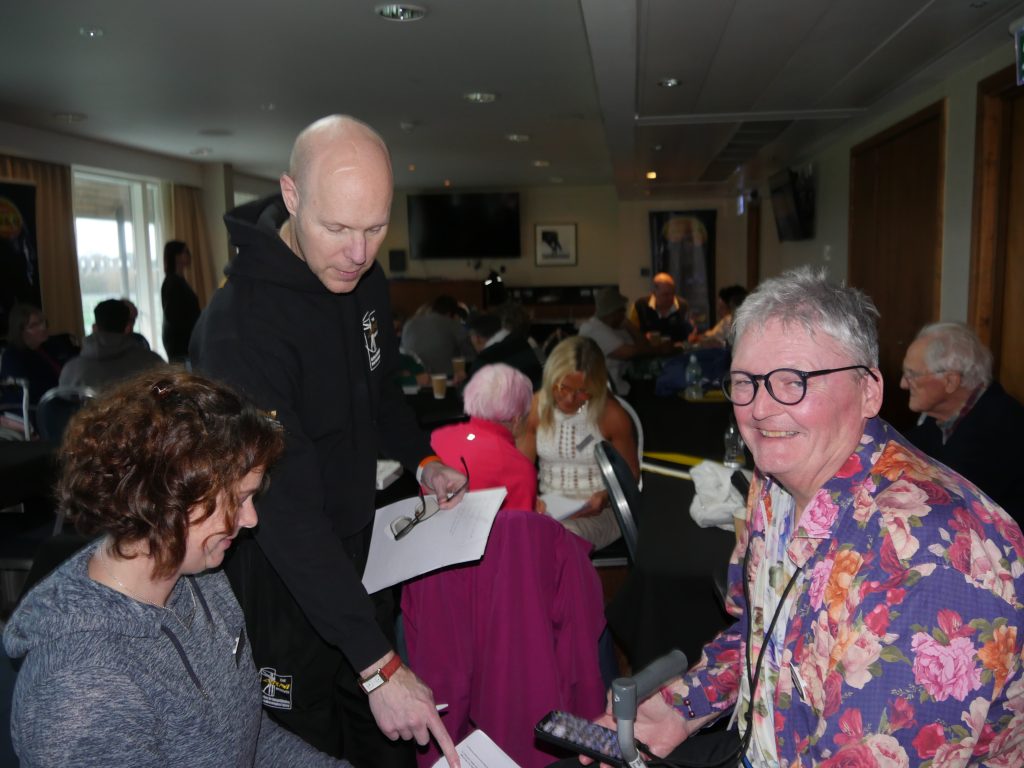 I suffered a cerebral hemorrhage stroke in August 2023. My worst first memories were the consistent negative statements from Doctors, Consultants, nurses and Therapist that I would never walk or have the use of my left arm again and that I needed to find ways to live with this for the rest of my life. Being a stubborn, tenacious and extremely positive man I constantly told them ‘ you watch me’! My first glimmer of hope was taken from watching Tom Balchin’s introductory lecture online at Royal Society of Medicine where I found the first positive attitude to recovery.
I suffered a cerebral hemorrhage stroke in August 2023. My worst first memories were the consistent negative statements from Doctors, Consultants, nurses and Therapist that I would never walk or have the use of my left arm again and that I needed to find ways to live with this for the rest of my life. Being a stubborn, tenacious and extremely positive man I constantly told them ‘ you watch me’! My first glimmer of hope was taken from watching Tom Balchin’s introductory lecture online at Royal Society of Medicine where I found the first positive attitude to recovery.
I then bought the 7 stroke rehab course videos by Tom Balchin from the ARNI website which are available to stream online. I worked through this course and then asked ARNI to help with rehab online with an ARNI Instructor. I also has the assistance of my wife, who found the recovery from fall techniques invaluable as they have been deployed on several occasions over the last year as falls are a part of any rehab journey. I am fortunate now to have my own dedicated ARNI Instructor who comes to the house and plays an important role in my recovery programme. It is so important that all the ARNI team and associates carry on their great work in supporting current and future stroke survivors. Please continue the positive message for stroke survivors like me.
(from Paul’s wife Karina)
After Paul’s stroke I was carrying out website research when I read an article published by the news reading and former presenter Andrew Marr where he shared his stroke rehab journey and the massive role ARNI played in his rehabilitation. After sharing the discovery with Paul and I read Tom Balchin’s book ‘Had a Stroke? Now What?’. After a thundering good read we then subscribed to the on-line ARNI training course of lessons. Paul & I commenced working through the programme which led to Paul signing onto regular weekly Physio sessions at home which our dedicated ARNI Associate Instructor, Nicolle. The results have delivered and continue to shape Paul’s recovery. We go to the regular Surrey ARNI rehab training hosted by Tom Balchin too with our most recent and brilliant visit in December 2025.
PAUL GIDDINGS
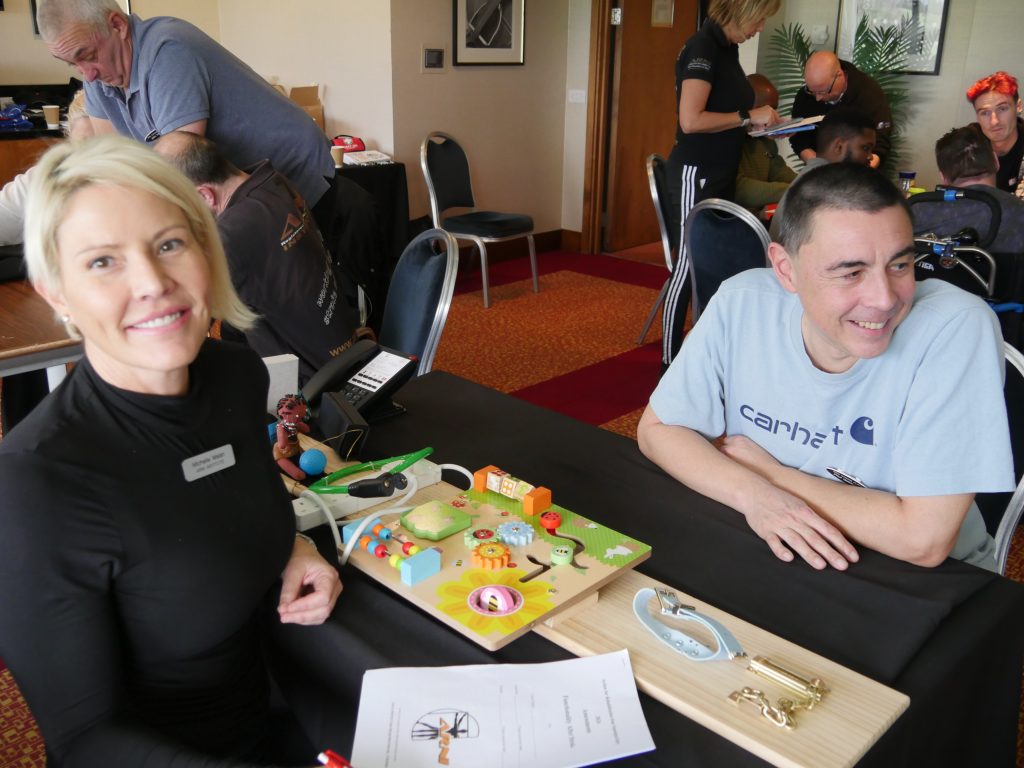
I had a stroke over 3 years ago and I lost the use of my right arm, hand and leg. When I was recovering in the Princess Royal Hospital in Haywards Heath early on, it was very overwhelming. Dr Tom, from ARNI, came and visited me to train me one to one for a number of weeks, alongside his ARNI trainer Jo. They did specialist upper limb rehab with me as part of a research study that he and Dr Khalid Ali (the main stroke consultant there) were running. I found the physio and OT support from the local NHS Trust was ok but in the end, nowhere near long enough.
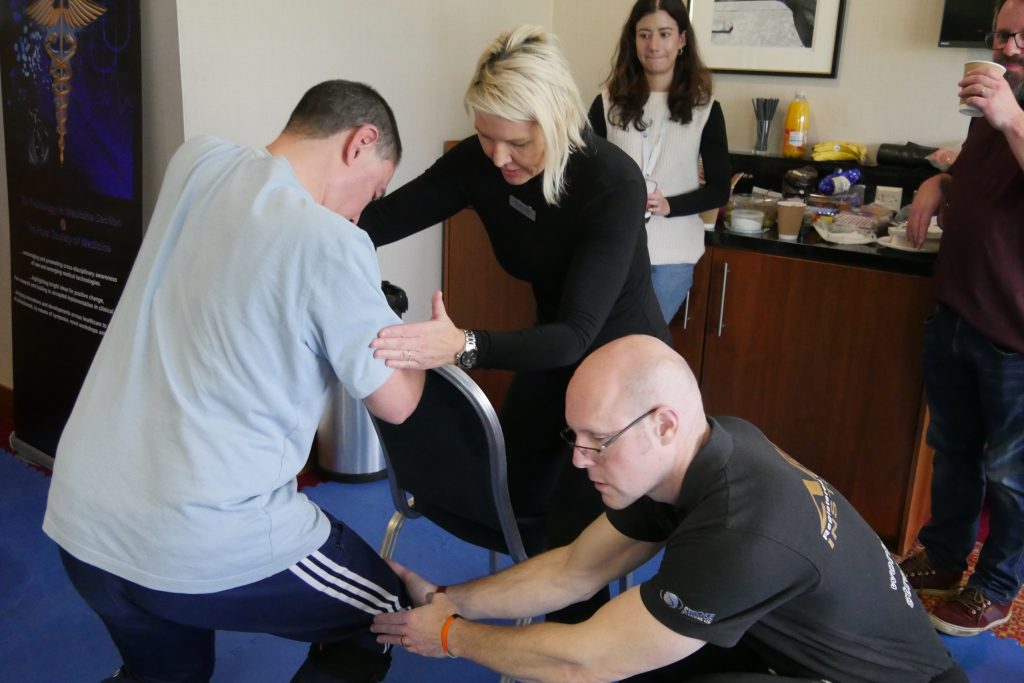 I’ve continued to use ARNI instructors since I left hospital and can honestly say it’s the best thing I have done to aid my recovery. I have gone from a wheelchair, to walking unaided and I’ve recovered use of my arm and hand. This was down to a lot of hard work from myself and my ARNI instructor.
I’ve continued to use ARNI instructors since I left hospital and can honestly say it’s the best thing I have done to aid my recovery. I have gone from a wheelchair, to walking unaided and I’ve recovered use of my arm and hand. This was down to a lot of hard work from myself and my ARNI instructor.
I’ve found the techniques used by ARNI to be essential in my recovery and highly recommend them. They encourage you, and teach you to work at the edge of your abilities. They encourage a growth mindset and above all give you hope that things can improve. It’s worth noting that this takes a lot of hard work and my ARNI instructor was always there to instruct me, encourage me, motivate me and celebrate the successes with me.
I have attended a number of ARNI workshops, and met a number of like minded Stroke Survivors, all of whom would recommend ARNI. The workshop offers free 1 to 1 rehabilitation and is in a plush Hotel in Lingfield. To reiterate, ARNI are an excellent organisation with first hand experience of Stroke rehabilitation. Life without their excellent knowledge, motivation and instruction is unimaginable. I continue to work with this amazing charity and I thank all involved at ARNI. I would really recommend ARNI as the way to go.
PETER DUNCAN BY ANNE
Peter had his stroke in April 2022, a fit man who was training for his 4th London marathon. He had a bleed on the left side of his brain leaving him with weakness on his right side and aphasia.
After community physio and different private physio he seemed to plateau after 18 months, then we were introduced to ARNI/Stroke Solutions and the wonderful Carol Miller.
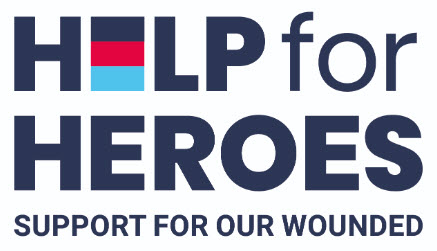
ARNI Institute is Help for Heroes (H4H) number 1 go-to provider for community stroke rehabilitation.
H4H has a contract worked out with ARNI to pay for a tranche of intensive rehab sessions (typically an assessment and then 10 hourly sessions, wherever there is an ARNI Instructor to match with a veteran).
For this application, we successfully applied for Peter to receive 13 one-hour sessions. And then very generously, in October 2024, another 13 one-hour sessions were granted to him.
A testimonial from Anne; his wife.
When Carol first started working with Peter in May this year (2024), he had no confidence. He was still walking with a stick and his balance wasn’t great. Within the first 2 sessions he was able to get down to the floor and up again, using a chair. Once he’d gained this skill, his confidence soared and Peter was happy to try anything Carol threw at him.
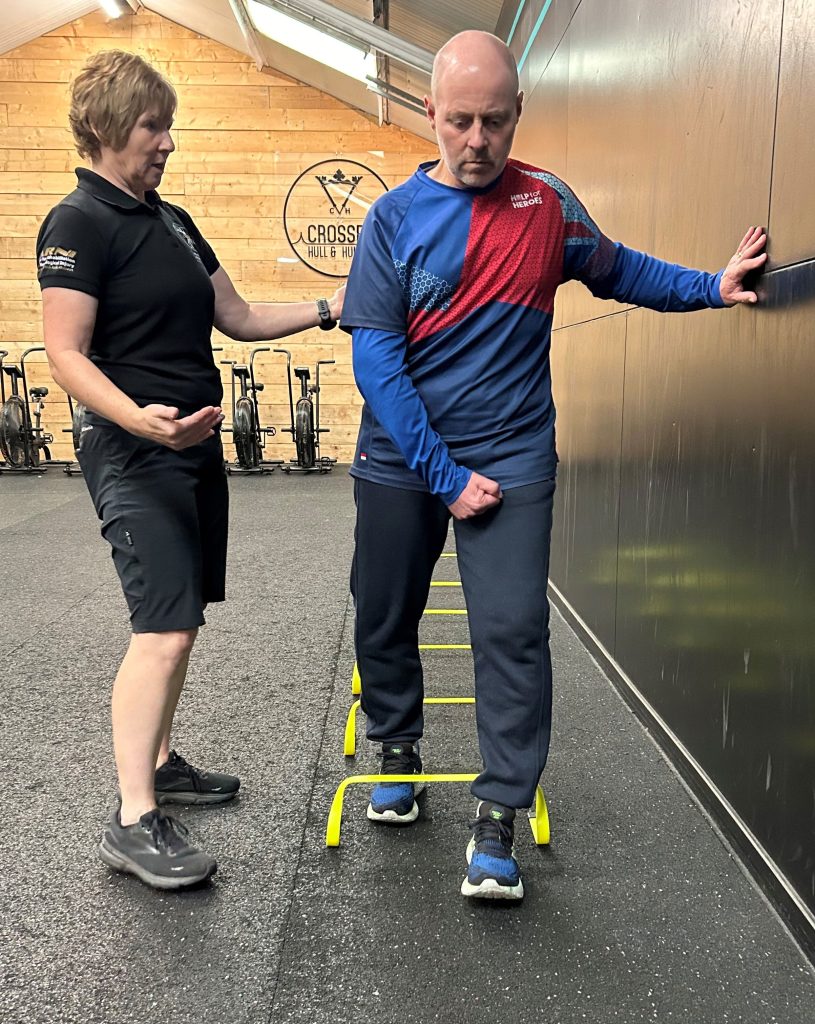 Prior to his stroke, Peter and I looked forward to attending Hull Park run each Saturday. Carol has factored into Peter’s regular sessions, a circuit training session with hurdles to step over and a lap to complete against the clock likening it to park run and tuning into Pete’s competitive nature. We do this at the gym that Carol works from as there is more space and Peter usually completes three circuits. Each lap, Peter improves his time and you can see the joy of this in his lovely smile.
Prior to his stroke, Peter and I looked forward to attending Hull Park run each Saturday. Carol has factored into Peter’s regular sessions, a circuit training session with hurdles to step over and a lap to complete against the clock likening it to park run and tuning into Pete’s competitive nature. We do this at the gym that Carol works from as there is more space and Peter usually completes three circuits. Each lap, Peter improves his time and you can see the joy of this in his lovely smile.
Incorporating the hurdles works very well for Peter as this translates to improved balance and encourages a higher lift of the affected lower limb which has helped to improve his walking technique. This has also helped Peter in negotiating threshold of door entrances without using his stick as well as going up and down stairs, being a lot more manageable. Another big confidence tick!
Carol also has Peter performing the deadlift with an 8KG Kettlebell and body weight squats regularly which has really improved his strength and he can now go into a deeper squat as he holds on to a bar as well as being able to stand up from a low bench without using his hand for support. Peter is looking forward to increasing the weight of the Kettlebell as his technique and balance improves.
Peter’s movement in his upper limb has greatly improved. This has been as a result of the stretching exercises that Peter has been shown by Carol through her training with ARNI, which he does regularly, followed by strength work using a light dumbbell.
We also have an exercise now coined the Peter Duncan double whammy!! This involves placing the affected hand on a table and stretching out the fingers. The non affected hand is positioned over the top to keep in place. Peter then performs a squat and the challenge is to get the forearm down to the table so the hand and forearm are both flat as well as performing a deeper squat. This is a rather difficult exercise and Peter is always well up for a challenge!
Picking things up is much harder, yet improving through high repetition which is evident on each ARNI session with Carol. We stretch the hand first to get the pincer effect and Peter is now managing to pick items up, eg a peg out of one slot and place it in another. The release of this is also improving, once the thumb is out of the way. One of Peter’s hobbies that he would like to get back to, is fishing. We now have a fishing reel beside Peter’s chair at home that he practices regularly.
We continue to practice getting down to the floor and Peter is almost able to get down to the floor without using a chair as a result of all the strength work and repetition of exercise that has been mentioned above. I can’t thank Carol and ARNI enough. Bit by bit they are giving me my husband back. We work as a team and for Pete and I this approach really works.
ANDREW RUSSELL (BY MARION REED)
I found out about ARNI when I was calling around local physios trying to engage a mobile therapist for my step father, Andrew. It was proving impossible to find anyone willing to make visits to a residential care home. But one smart receptionist at a Lincoln practice knew about ARNI and told me I could contact the charity directly without a referral.
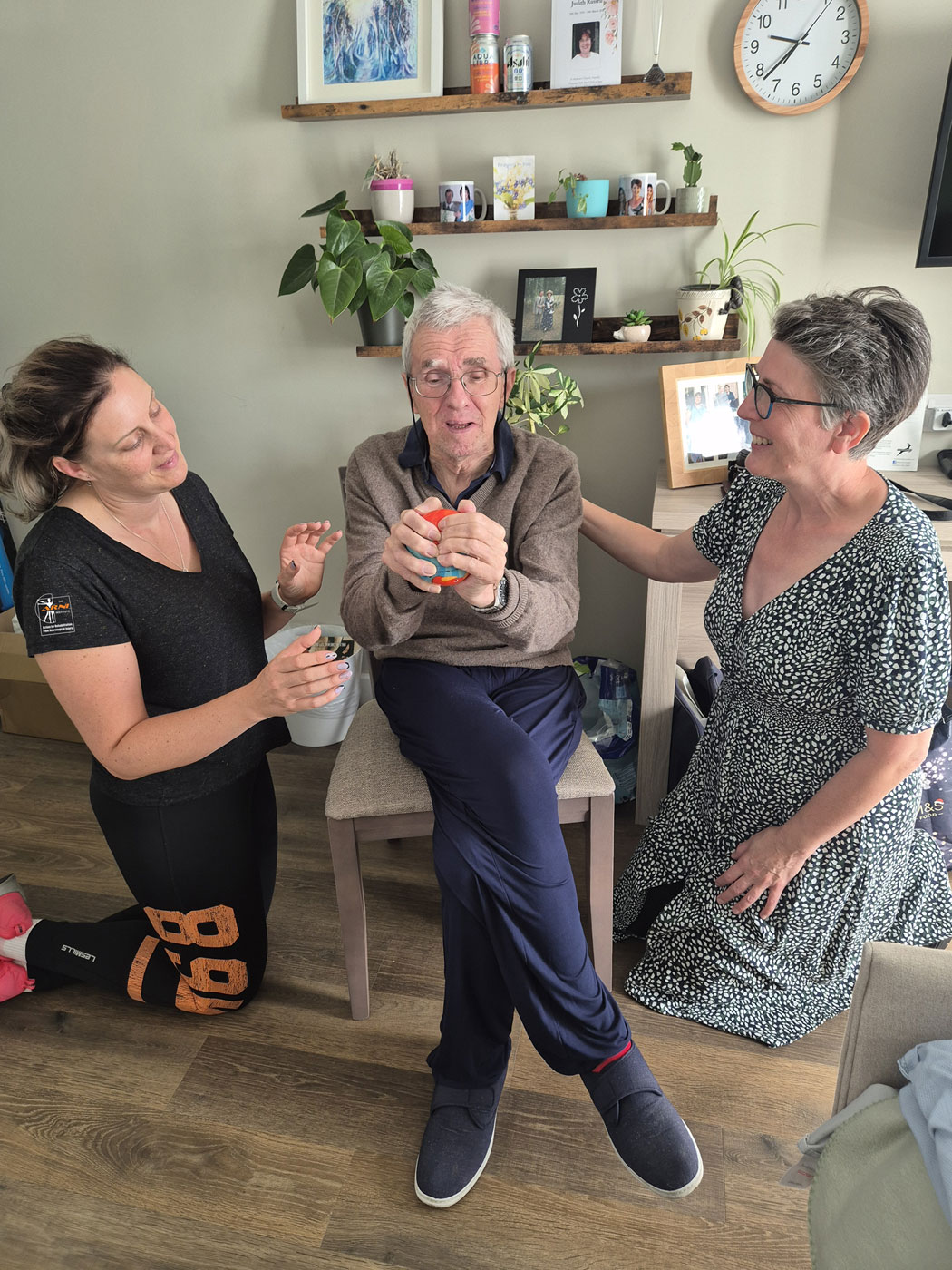
I hadn’t heard of ARNI before. My late mother had a stroke in 2012 and another in 2022. Why had I never heard of ARNI? The NHS gives short term physio support after a stroke. But if recovery is taking a little longer for you, then you risk being prematurely abandoned. Told you have reached the extent of your recovery. This is nonsense. You have just reached the extent of NHS funding.
Andrew, 5 months post stroke, was spending 90%+ of his day in bed at the Nursing and Care Home where he is at. Demotivated. Believing he was as good as he could be. Grieving for the loss of his wife. Anticipating the same outcome for himself. On a slippery slope.
When I made my enquiry I couldn’t believe how straight forward the process was. The immediate answer was, ‘yes – we can help’. The registration and paperwork was simple. An ARNI physio was identified and Natalie agreed to work with Andrew on weekly visits.
Three months into physio with Natalie and Andrew spends 90% of his waking day out of bed. A complete turn around.
He can mobilise unaided around his bedroom. He walks with a frame to the dining room for three meals a day. He is motivated to participate in social activities with other residents. He can take himself for a walk around the garden unaccompanied. Now he has the confidence to accept invitations to go out and can be collected by friends and go to public places.
ARNI, through Natalie, has given enormous hope to an 81yr old who thought he was destined to the same demise as his wife, who never regained mobility despite being desperately motivated to do so. Judith was a bed escaper! The response to this was to put the bed on the floor and lay out crash mats. The NHS assessment was that it was unsafe to allow her to try to walk. If only we’d known about ARNI then.
I firmly believe that ARNI services should be universally accessible and recommended by the NHS. There was no signposting from the medical profession. This is information that people who have had a stroke need to know.
According to Andrew, Natalie can read his mind. She knows when his blockers are emotional, not physical, and she knows how to motivate him beyond those. Truly, the intervention of ARNI has been life changing. An enormous relief for family who live hundreds of miles away. An inspiration to Andrew, and a long term hope of an active future.
MARK WAGSTAFF
In May 2018 I woke as normal at 6am and rose to get ready for the gym as I always used to go to the gym before work on a morning I was putting my shorts on when I felt myself falling and found myself on the floor unable to move or speak luckily my wife recognised the symptoms and rang for an ambulance my next memory was waking up in ICU surrounded by my family and with various tubes drains and monitors attached to me still unable to move it appeared that I had suffered a haemorrhoragic stroke and had undergone a craniotomy once i had been stabilised I was transferred to another hospital and placed in a stroke ward still unable to move or speak various clinicians began the process of assessment and I soon began rehab with the neuro physios who were very good but were limited by time and facilities for the amount of work they could do with me.
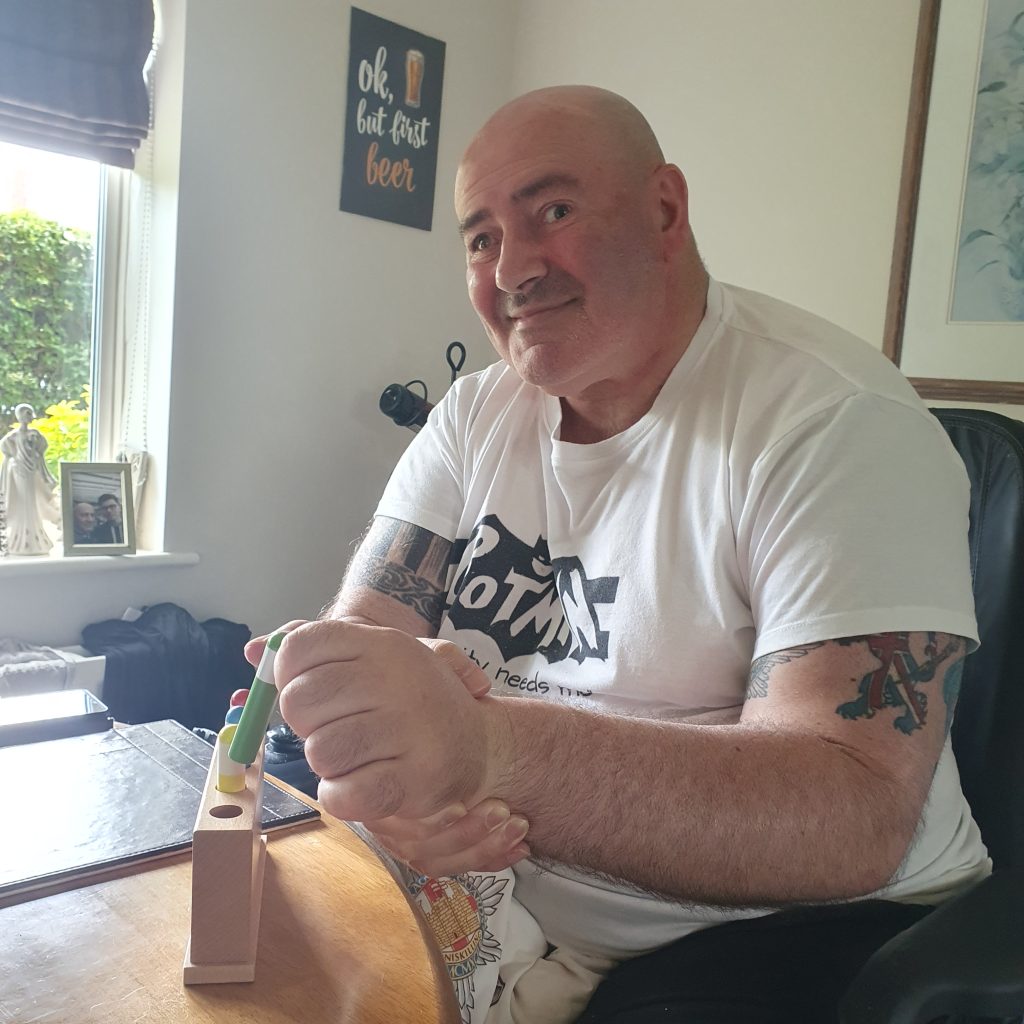 Progress was made but very slowly and it was decided that I would have a better chance of recovery if I transferred to a neuro rehab hospital as they had more facilities and staff I was told many positive things about the hospital and was convinced that when I went I would walk out at the end unfortunately I didn’t have as much rehab as I was expecting and after approximately 3 months I was as good as told that I wouldn’t walk again and that I had come to the end of the road there and was discharged to the community physios in my home town physio continued on weekly basis for a further 3 months until I was able to transfer from my wheelchair I was then discharged I was not prepared to give up at this point and enrolled with the gym at the local leisure centre.
Progress was made but very slowly and it was decided that I would have a better chance of recovery if I transferred to a neuro rehab hospital as they had more facilities and staff I was told many positive things about the hospital and was convinced that when I went I would walk out at the end unfortunately I didn’t have as much rehab as I was expecting and after approximately 3 months I was as good as told that I wouldn’t walk again and that I had come to the end of the road there and was discharged to the community physios in my home town physio continued on weekly basis for a further 3 months until I was able to transfer from my wheelchair I was then discharged I was not prepared to give up at this point and enrolled with the gym at the local leisure centre.
Fortunately some of the instructors had undertaken ARNI training and were very sympathetic to my situation and put together a programme for me to follow it was very difficult at first but luckily I had been a regular gym goer prior to my stroke so found the routine easy to get into and thought doing something was better than nothing also I started to research stroke rehab online to see if I could find any other rehab methods which is when I stumbled across the ARNI Institute and bought the manual having read the inspirational accounts in the book I decided to try and get a trainer for myself.
When I initially contacted ARNI there were no instructors in my area but luckily they make an effort to find excellent trainers in areas where there is demand and need and I was later matched to Maria who had recently moved to the North East we met for an initial assessment and discussed my goals and began working together in 2021.
Getting involved in the ARNI rehab programme has been life changing for me and I continue to make progress we have regular weekly sessions and Maria is a hard task master and continues to challenge me in every session she also sets me home work to do between sessions and I continue to go to the gym twice a week the rewards of this have been tenfold and she has given me back the confidence to challenge myself further not only that but for someone who would never walk again I have progressed to taking several supported steps and am confident that I will definitely walk again unaided. it’s definitely the best investment I’ve ever made it is so good to have hope back in my life I cannot speak highly enough of the ARNI Institute from start to finish.
For example. Another fantastic session with Maria yesterday we’ve made so much progress it’s hard to describe I always feel so positive after our sessions boosts the confidence and makes me want to challenge myself further and gives me the confidence to push myself further in my other training regime’s after yesterday’s work out I felt like I could do more at the gym today so tried standing press ups against the bar hard work but success really feels like I’ve achieved something this week my only regret is that I didn’t find ARNI and Maria 5 years ago.
Maria says ‘Mark is really motivated; always look forward to our training sessions. The first time I showed him those pop-up men or ‘The Houses of Parliament’ as we call them, his eyes filled with fear! But, after massive doses of repetitive training, he’s able to reach forward (with minimal ‘Body English’) take them out with his index and thumb mainly and then put them back in the slots! When I’m there, we are able to ‘open’ his fingers and thumb to ‘get the gap’ allowing him to involve his middle finger also for reps. Actual release without assistance of the slots is coming along too. He’s doing this using our ARNI programme of very high numbers of reps daily. He also is starting to do the same grasp and release task using lots of different items with his ARNI task-board. He does need a way to support his arm as he trains though and I’m thinking he may do well to try a Saebo-Mas. Go Mark!
BRETT GRANT
It’s been 3 years since I had a massive ischemic stroke on the right side of my brain, leaving me weak down my left side. At that time I was 48 and very fit, never smoked, never drank, no health problems. Not only did the stroke occur as a complete surprise but, as of today, and after many tests, the cause still remains a mystery.
Back then there were only 2 things I knew about stroke – the FAST campaign that played out on the radio most ad breaks and that my elderly neighbour was whisked off to hospital after suffering a stroke during the 2020 lockdown. I remember the night of my stroke, awaking to hear my wife mid-conversation on the phone to the emergency services. Given my obvious limited knowledge of stroke, it’s amazing how quickly I worked out what had happened. When the ambulance crew were in the house, I remember looking down at my left foot and seeing it laying on an object that I really care about. Naturally, I would instinctively try and pull my foot away only to see I could not move it. I remember crying out that I couldn’t move it and the ambulance crew replying “it will come, it will come” – words I will never forget
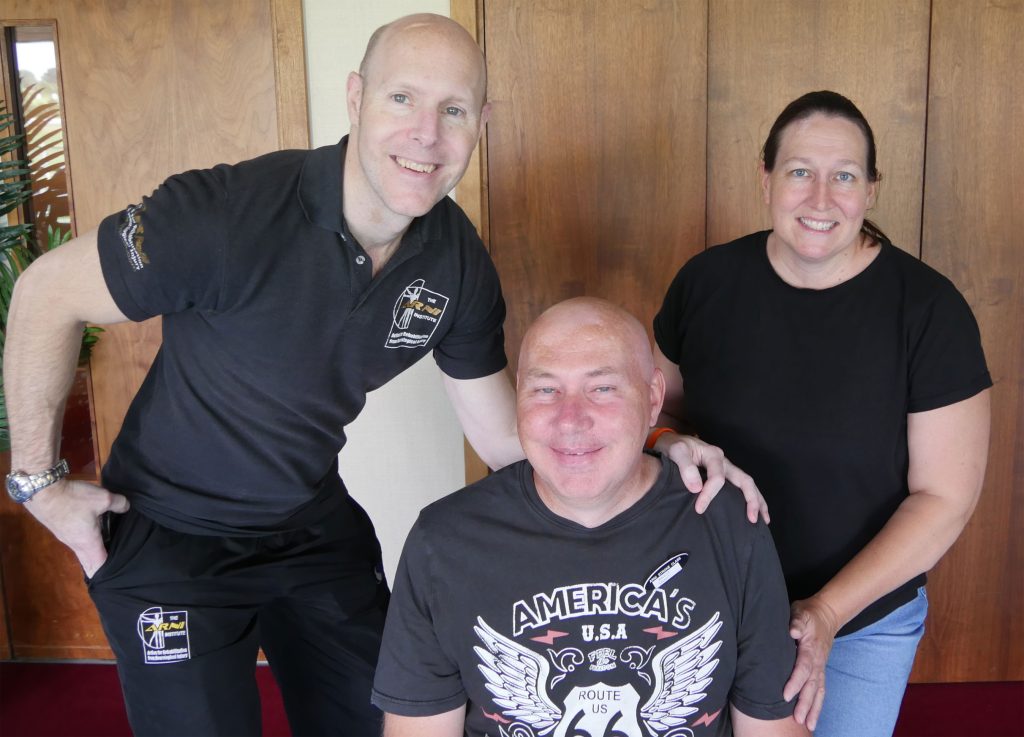
Off to Maidstone hospital I went, alone of course as it was “Covid year”. I spent 2 weeks in the Maidstone hospital stroke ward, receiving brief physio every morning and then being left in my wheelchair for prolonged periods afterwards. I did manage to stand up from the bench using my good right leg during one of those brief sessions, breaking down as I did so. During this stay I thought of my neighbour and how he was back pottering around his garden a few weeks later. Naturally, being younger and fitter, I thought I’d be back up and running in a few weeks – how wrong I was. My neighbour had had a TIA. I never even knew what that was, why would I? After 2 weeks in the stroke ward at Maidstone hospital I was moved onto a rehabilitation centre. That had a bigger bed, nicer food and 2 new physio therapists. It was still covid year, so I remained isolated and was mostly confined to my room rather than communal areas.
I’d always class myself as an outdoors person: hiking, cycling, working as a field engineer and always being relatively free and having never worked in an office. After 7 weeks I was bouncing off the walls and desperate to get home, only to find I’d still end up bouncing off the walls at home. During my stay at the rehabilitation centre, whilst in my room, I wheeled myself into the bathroom. Limited at the time to right side pivot transfers, I failed a left hand pivot and ended up on the bathroom floor. I tried and tried to get off the floor desperate not to get caught. Despite using the handrails and all my might, I still could not get up. After a lot of effort and thought, I did end up kneeling up high – where my physio found me. Where I could have got from there, I do not know: that was a big wake up call! I was no longer as fit or as strong as I thought I was.
This brings me nicely to my first day with Tom. I had found out the hard way both how easy it is to end up on the floor, but how difficult and near impossible it is to get back up. In short, Tom’s way works and is certainly more efficient than my way during my harsh lesson back at rehab. After 7 weeks “in the dog house” for the floor incident, I was finally released to go home. I was one of the few lucky people to be appointed 2 excellent, well experienced, physio therapists on a weekly basis. Having long legs, I found my wheelchair too small and uncomfortable. I hated it. I really, really hated it. I wanted to sit in my arm chair in the lounge. At that time I either had the comfort of the hospital bed upstairs (I had a stair lift) or the discomfort of the wheelchair downstairs. My physio agreed and asked me to get in and out the armchair while she watched on, to both make sure that I could not only do it, but do it safely. With the thought of waving that bloody wheelchair goodbye, I did of course do it.
Like most, I was desperate to get up on my feet, which after a lot of work and determination I did. It wasn’t until I was told I could walk around at home safely that it suddenly hit me “what was the point of being able to walk if you can’t actually walk anywhere? I mean, round the house is better, but I want to walk to the local shops and back. After a lot of walking outside and trying to stretch or beat previous Strava records, I have found half a mile to be around my limit – with a stick, an AFO and my wife. In hindsight, I feel that my focus on getting to my feet has had me lose focus on my arm. I feel that is common amongst stroke survivors.
When in rehab, my apparently very heavy arm used to fall off the side of my too small wheelchair – I was waiting an arm board. That never arrived until I was at home. I used to tie my forearm to the armrest of the wheelchair so it couldn’t fall. – that got me into trouble too! Once home, my weak arm was in agony. I wouldn’t let anyone touch it let alone stretch it or move it. I was put on co-codamol for it, but it never worked in relieving the pain. My physio did a qigong class and used acupressure on my arm. It worked! Instantly. Within no time at all of her pulling and shaking my fingers, the pain was gone and hasn’t been back.
Since that day, every morning I stretch my arm back behind my head and out to the side. – anything to reduce the chance of that pain coming back! My weekly physio sessions continued, staggered with OT sessions on the weeks in between. These sessions involved stretching, gripping a small teddy which then had to be prised out my hands. My regular physio got me walking and to the point I could walk around the house, before my physio unfortunately had to leave for medical reasons. I kind of found myself in limbo. My OT had vanished, but I still had my physio’s assistant. She saw me weekly and signed me up to a 12 week program at my gym using a stroke trained (by my old physio, coincidentally) trainer.
I’ve now been discharged from community care with regards to physio. I continue training the exercises I was shown at the gym. In fact, I’ve joined and go regularly adding different challenges and plans as I go. I found myself willing to put the work in but not knowing how and into what direction. I felt I was just doing random exercises.
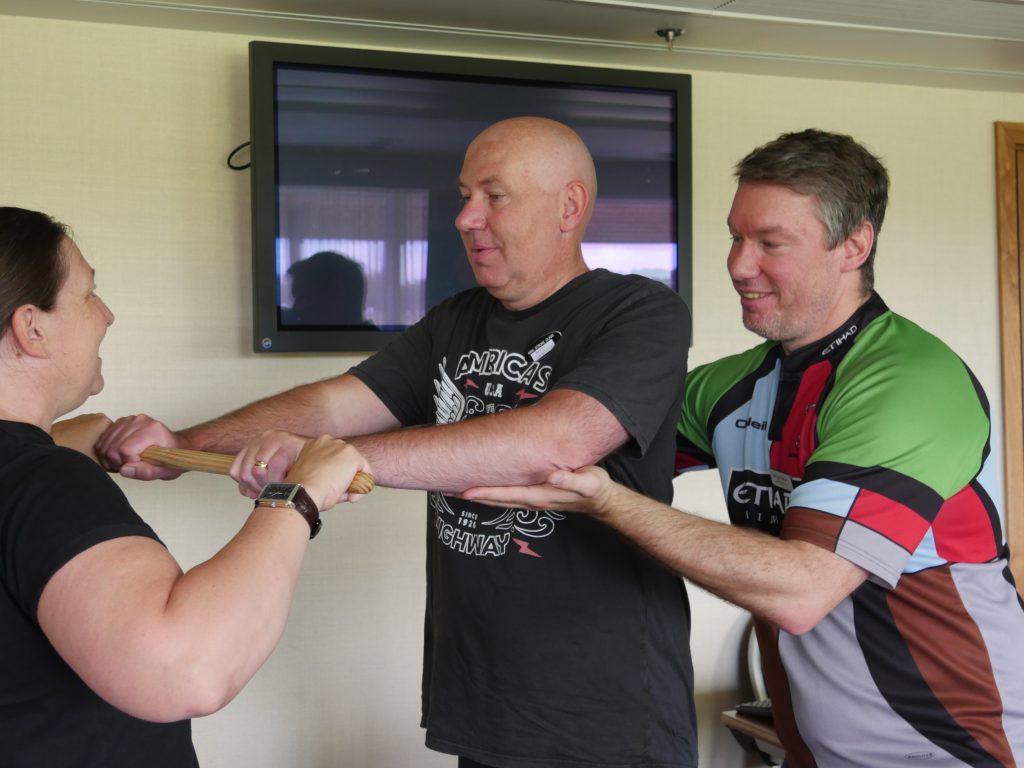 My wife first contacted ARNI way back when I was in hospital, but as I was receiving regular physio. Also, we watched the first video which was about getting onto the floor, and that just seemed absolutely impossible. We just stayed with that rather than having multiple conflicting programs. I read my way through Tom’s book – ‘ How to be a successful stroke survivor’ and secured a day and a half with Tom. Having read Tom’s book and the testimonials within, I expected it to be hard work, but boy it was. To the training mat I walked where I spent time getting to and off the floor. The phrase of the day was “ that’s good, do it again!”. I’d read the book and watched the video so had an idea of what to do, but had think about each step on the fly.
My wife first contacted ARNI way back when I was in hospital, but as I was receiving regular physio. Also, we watched the first video which was about getting onto the floor, and that just seemed absolutely impossible. We just stayed with that rather than having multiple conflicting programs. I read my way through Tom’s book – ‘ How to be a successful stroke survivor’ and secured a day and a half with Tom. Having read Tom’s book and the testimonials within, I expected it to be hard work, but boy it was. To the training mat I walked where I spent time getting to and off the floor. The phrase of the day was “ that’s good, do it again!”. I’d read the book and watched the video so had an idea of what to do, but had think about each step on the fly.
Doing this made me tire and stopped the whole manoeuvre from being fluid or autonomous. After a long session of being on and off the floor, it was time for lunch and then onto some arm and grip training. This is the first time I’ve had anything like it, and it wasn’t just physically demanding, but mentally too. The rest of the day was spent on and off the floor. To rest those tired legs from all that hard work, I got myself in the hotel’s hot tub. My first time completely submerged in water since my stroke!
I lay in bed that night running through the steps over and over again in my head. I was determined to make the whole process fluid. Monday came around and it was half a day. I worked with my trainer Mike and went back to getting on and off the floor. Despite my legs being really, really tired from the day before, I managed the process in a fluid manner, changing the process slightly. After running the moves through my head, I questioned why get up and sit in the chair? Whilst I’m halfway up, I may as well stand up! From there we moved onto me being pushed and having to regain my balance, all without a stick of course! Then some more arm exercises running through Tom’s training program for me.
The following week muscles that I never knew existed ached, but things have changed, I’ve got a direction to head in. I have Tom’s training program and intend to follow it. Previous to seeing Tom, whilst seeking more independence (as my wife, my primary carer, will shortly be having a hip replacement), I figured it be a whole lot easier when I wake up in the morning to just go to the bathroom like everyone else rather than all that faff with AFO, stick etc. So I’ve cut all that out and walk around upstairs bare foot and without a stick. I have to be cautious of course, but I do still like to feel the cold through my feet when I step on to those metal carpet joining strips. I prefer the ankle support as recommended by Tom. In fact, I wore my old small AFO the other day and hated it. I was once told that I wouldn’t be able to get rid of the AFO. That had made me more determined to do so. I’m just stubborn, I guess.
Since seeing Tom I now walk around more without my stick, starting indoors. He is real inspiration and his approach is like a breath of fresh air. I look forward to following up with a local ARNI instructor. This “can do” attitude is excellent. I can’t wait to start seeing more improvements as just one day with Tom showed me what in was capable of.
Prior to the note from Brett, a note from Kerensa:
Tom, Thank you so much to you and your amazing team for the day and a hald that Brett experienced on Sunday/Monday. Brett (a man of few words), said you are very inspirational. Amazing. He thanks you so much for the book and your comments in it. The book will take pride of place on our bookshelf, along with other books about people who have been through life-changing events, such as Aron Ralston. We ended up staying at Lingfield and watching some horse racing on the Tuesday. Brett struggled to get out of the car, up the steps and along the garden path when we got home. Even today he aches. He knows he worked very hard and is pleased. He settled down for the evening with a protein shake and an omelette! Having the programme you prepared for us is amazing. It really gives us something to work with as we were struggling to work out what to do each day. So training starts tomorrow and as mentioned, Brett would be interested in joining the next session you hold in November. You have a fantastic team and I hope your trainees did well in their assessments. I think anybody who proceeds down the route of wanting to help people in any way, shape or form, are really amazing.
MICK RICHES
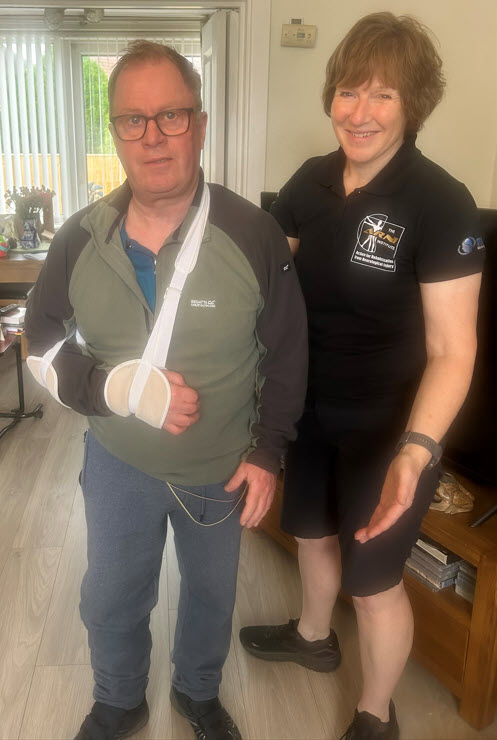 ARNI is now the H4H’s contracted first go-to for stroke rehab in the UK.
ARNI is now the H4H’s contracted first go-to for stroke rehab in the UK.
Armed forces veterans can now be referred by Help For Heroes (H4H) to any of the 135 ARNI Instructors under the new H4H-ARNI contract. Any veteran who has a stroke can apply for an comprehensive assessment and then 10 hours of rehab, followed by a further multiple hours of session if appropriate/as agreed.
Here’s an example testimonial from Mick’s wife, Julie, along with a photo.
ARNI and our lovely amazing instructor Carol have been absolutely fantastic. Mick is a lot more confident and can now get to the floor and back up. The support from Carol has been invaluable and would recommend ARNI to any stroke survivor they give you the tools and confidence for your rehabilitation. All strokes and progress are different for everyone but with ARNI by your side you can do it.
Carol notes:
We’ve been tackling gait control at the moment, and knee extension plus rapid total knee-lockout has been causing Mick distress. We’re tackling this by relatively deep squats and various other squat approaches including using a dipping belt with some weight on.
Then prone leg curls by lying on his bed. I help Mick to do a number of supported repetitions and then get him to use his non-affected leg to help the more-affected leg to mobilise at the knee. We use mental strategies to help him visualise what his hamstrings look like and get him to think of these muscles as they’re moving as strongly as he can.
Then I’ll get him to press both insteps against each other, and do a sequence of curls. Then try for one full rep using his more-affected leg only. And for the next set to do 2 or 3. And on and on like that! We’ve found that he needs to keep doing the curls every 3rd day ideally to assist his walking ability.
DOMINIC DOBSON
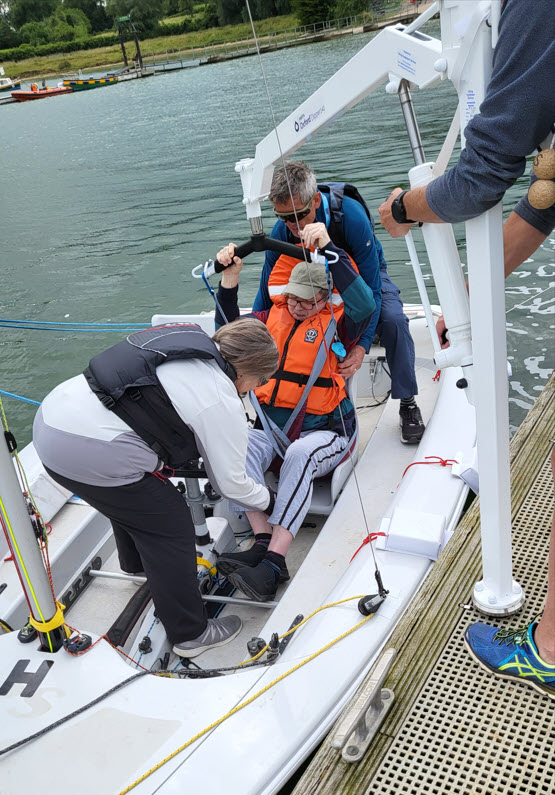
Dominic says ‘Jeanette from ARNI has helped me over the past year and from a poor state of unfitness after three strokes, she has been a tremendous support in assisting me towards my goals. I have been able to make improvements in my mobility and confidence as I thought I’d never manage to sail again due to the effects of stroke. I’m so grateful for the encouragement and support that I have received. She has not only helped with my physical therapy but has been hugely supportive to my mental health, including helping me to get out sailing on Rutland Water. Jeanette is so supportive and helpful, I am very impressed by the work of ARNI’.
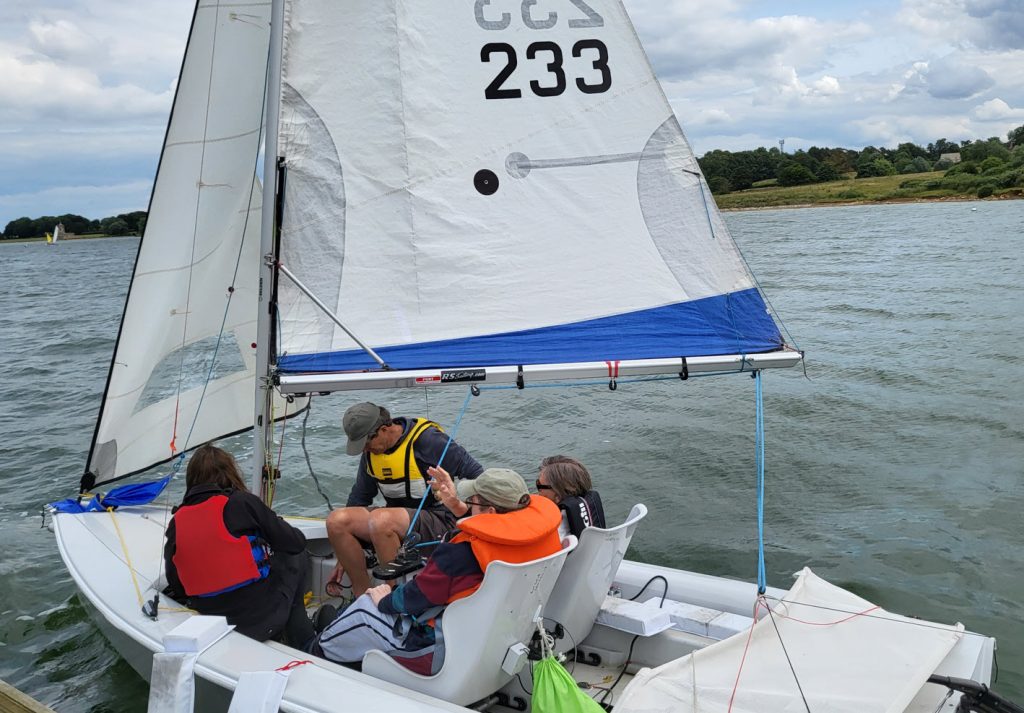 Jeanette says: ‘We thought you might like to see these photos of Dom. I have been working with Dom as an ARNI Instructor for some time now. I have found that his multiple strokes have significantly compromised his capabilities. One of his passions pre stroke was sailing; he is a master yachtsman. I introduced him to Sailability this summer at Rutland Water’.
Jeanette says: ‘We thought you might like to see these photos of Dom. I have been working with Dom as an ARNI Instructor for some time now. I have found that his multiple strokes have significantly compromised his capabilities. One of his passions pre stroke was sailing; he is a master yachtsman. I introduced him to Sailability this summer at Rutland Water’.
‘We have been building his confidence during our ARNI sessions, so that yesterday when he hit the water in the venture boat, I came with him and it was obvious that it was so life-affirming. He told me right at the start of rehab with him that he needed to get back to this, and he’s done it already, much much quicker than he ever expected to do it with the help of a hoist and trained staff. Working alongside this charity, we are planning to make this a regular activity to Dom’s routine. It was a great opportunity for him to socialise and meet new people with varying degrees of ability and skill. This is a fabulous step forward for Dom, I am so proud of him!’
CHRISTINE HERZBERG
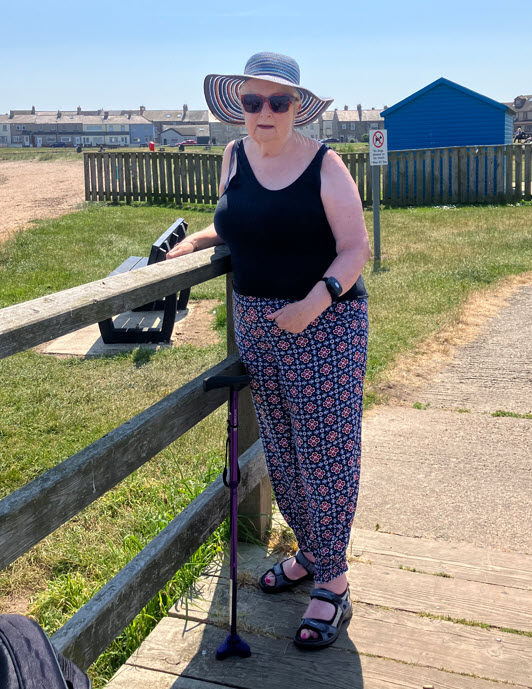 It is now 13th June 2023. I had a stroke 5 years ago, I thought I would be better now. Walking. After spending 10 was in hospital, I had an NHS physio work with me once a week. I foolishly believed that I would work with the Physio until I was better. But no, you get Physio until your allotted hours are up and then it stops. I found a Neuro Physio who was good but very expensive, she believed in me, more importantly got me to believe in myself. I had contacted ARNI when I first had my stroke, but there was no ARNI Instructor in my area. They said they would work on getting an ARNI Instructor in my area to help me. Then out of the blue, few weeks ago, I was told an ARNI Instructor had moved to Seaham, just down the coast from me. So Maria came to see me and immediately started working on my much-neglected left hand and arm, as well continuing to strengthen my legs.
It is now 13th June 2023. I had a stroke 5 years ago, I thought I would be better now. Walking. After spending 10 was in hospital, I had an NHS physio work with me once a week. I foolishly believed that I would work with the Physio until I was better. But no, you get Physio until your allotted hours are up and then it stops. I found a Neuro Physio who was good but very expensive, she believed in me, more importantly got me to believe in myself. I had contacted ARNI when I first had my stroke, but there was no ARNI Instructor in my area. They said they would work on getting an ARNI Instructor in my area to help me. Then out of the blue, few weeks ago, I was told an ARNI Instructor had moved to Seaham, just down the coast from me. So Maria came to see me and immediately started working on my much-neglected left hand and arm, as well continuing to strengthen my legs.
My goal on the 3rd July the anniversary of my stroke, was to walk on the beach and swim in the sea. I’ve Brought. a new swimming costume. ‘We will work towards this ,and if its nice next week we will go down to the harbour by the beach and get you walking outside. ‘ said Maria. My mobility scooter terrifies me but is key to my independence. I got out of the scooter unassisted and held onto the rail, looking out at the sea then took a few steps back to the scooter. Wow! As we made our way home, I realised what I had done, I stopped the scooter and hugged Maria, ‘Thankyou’ I said through tears.
Thankyou Maria for pushing me that bit further. Thankyou Maria for helping me start to recover.
Thankyou Maria for believing in me. Thankyou Maria for giving me homework!
Thankyou Maria for listening to me. Thankyou.
Pic shows Christine walking outside for the first time since her stroke.. with ARNI Instructor, Maria at Amble Harbour.
MARY CADOGAN
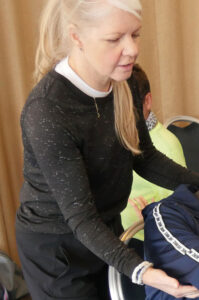 At the beginning of 2017 I had a stroke which left me with little movement on my left side but fortunately no pain. After a few months in Chelsea and Westminster Hospital and Charing Cross Hospital where I learned to walk short distances, I was discharged “into the community”. Unfortunately, the allocation of the promised physiotherapy and occupational therapy took some time. Feeling frustrated my husband contacted ARNI for assistance. Thus. I was introduced to Denise.
At the beginning of 2017 I had a stroke which left me with little movement on my left side but fortunately no pain. After a few months in Chelsea and Westminster Hospital and Charing Cross Hospital where I learned to walk short distances, I was discharged “into the community”. Unfortunately, the allocation of the promised physiotherapy and occupational therapy took some time. Feeling frustrated my husband contacted ARNI for assistance. Thus. I was introduced to Denise.
Now several years later, Denise continues to help me to lead a fuller life. This includes getting me mobile again after a serious fall which resulted in my having a partial left hip replacement.
In speaking of Denise to my friends the adjectives I use are of the nature of “wonderful”, “fantastic” and “amazing”. She is one of the most supportive and gently persuasive people I know. She has the ability to assess within a couple of minutes what approach would produce the optimum result for her clients on that particular day and is prepared to change her session plans accordingly.
As you will know she has a panoply of skills and qualifications at her clients’ disposal. She has changed my diet, lent me her own equipment, and is always avid to learn in order to help others to improve and achieve. So often I have told her that I cannot possibly do something only to find an hour later time that I am doing it with relative facility. Most importantly she has shown me that it is imagination and determination which effect improvement rather than expensive equipment.
She is also an excellent teacher and has enabled my husband to help me constructively. I am 78 years old but she will not allow me to use that fact as an excuse or a crutch. I am simply a work in progress with constantly extending goals. If I say that I cannot do something she responds, “Yet.”
Above all sessions spent with Denise are fun. She may leave me tired and muscle aching, but with enhanced skills and enthusiasms and a sense of well-being. I would have no hesitation in recommending ARNI, and Denise in particular, to anyone.
Jan Killingbeck
My ARNI physio, Richard, is the most caring, dedicated & professional physio I could have wished for.
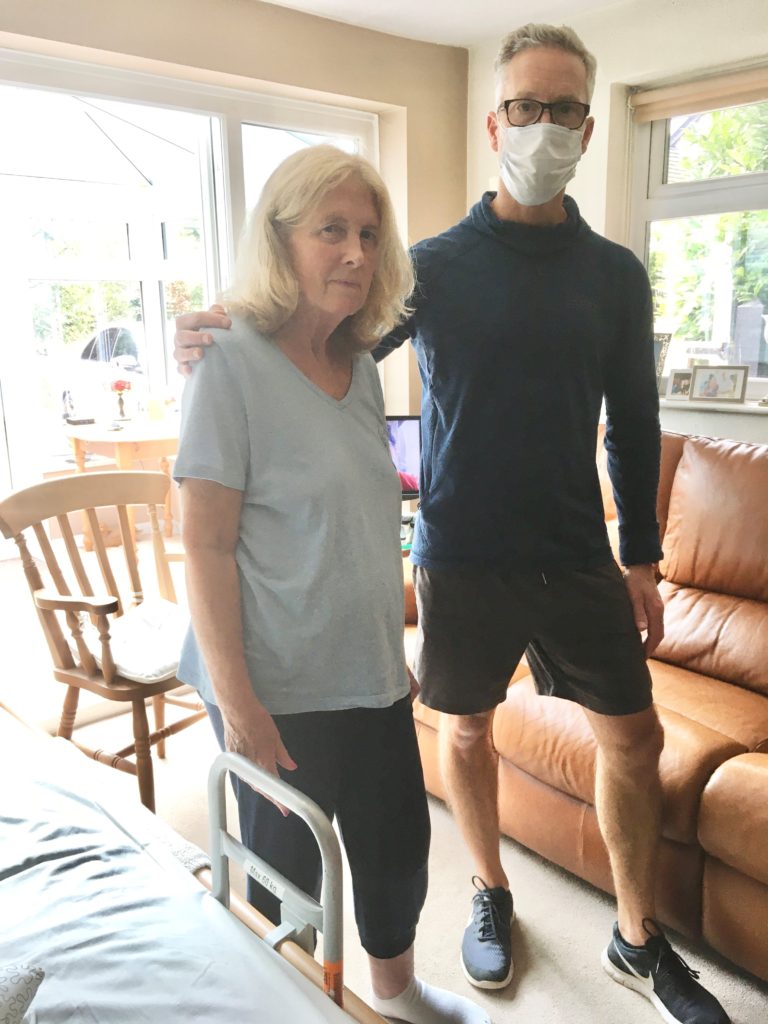 Since having suffered a stroke back in Sept 2019, I had been unable to find any good professional physio care. In desperation one day, my Consultant referred me to ARNI and Stroke Solutions, as I had exhausted all local physio services and simply did not know how I was going to recover.
Since having suffered a stroke back in Sept 2019, I had been unable to find any good professional physio care. In desperation one day, my Consultant referred me to ARNI and Stroke Solutions, as I had exhausted all local physio services and simply did not know how I was going to recover.
It seemed that every minute of every day I was worrying about my limbs. I had lost the use of my left side both leg and arm and thought there was no hope for me, the NHS were all so very negative about my prospects. I purchased Dr Tom Balchin’s book Had A Stroke? Now What, and training manual, and it is these that initially gave me back my sanity and belief that I would be alright. After contacting the ARNI Office and being referred to Stroke Solutions (who administer and regulate the full body of ARNI physios), I was put in touch with Richard. I have had weekly physio sessions and have never looked back since.
My physio, Richard of ARNI, has given me back my hope and belief that I can have a full recovery. I no longer worry myself constantly about my condition or looking further afield. He is the most dedicated, professional & caring physio any stroke survivor could wish for and my only regret is that I didn’t find him so much sooner as I am sure had I done so, he would have had me back to my full recovery a long while ago and saved me from excessive stress. Richard also advises me on my health, diet and my well being. He is such a genuine, caring man.
All stroke survivors should be made aware of ARNI and Stroke Solutions before being discharged from hospital, so that no one else has to suffer the mental anguish and stress that I experienced.
Eleanor Allen
I am a retired special school teacher who was born in 1948. I have always been active and independent. On 25th July 2014 I was staying at the family cottage in Suffolk. I went for a run along the beach, returning against a head wind and rather out of breath. I decided to prepare a snack for my husband so that I could take it to him on his allotment. I noticed that I had a migraine-like headache which was quite strong. I tried to speak and calm myself down, but my speech sounded strange and slurred. I spoke again to reassure myself, and I sounded normal this time.
So I left the house to re-join my husband. It was a hot day and I could not walk straight and started to stagger, but I reached the town’s surgery where I received immediate care, however, what was a TIA developed rapidly that same evening into a major stroke. I spent six weeks in hospital before being transferred to the Albany Rehabilitation Unit at the National Hospital, Queen’s Square, where I learned to walk again. I remained there until November 2014.
On discharge from hospital my left leg and left arm remained seriously affected and I was allowed a district physiotherapist for 4 weeks whom I liked very much and found extremely helpful. When I was discharged by the Re-enablement team, we engaged a private physio who was very nice, but also very expensive. By this time I was taking pills to prevent seizures which were a side effect of my stroke and these pills (since changed) had unpleasant side effects and this seemed to make it very difficult to work even on a one to one basis.
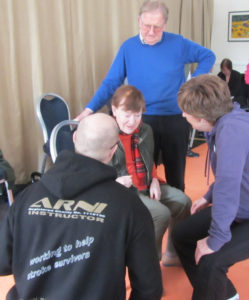 My husband found out about ARNI from reading the Successful Stroke Survivor book and the informative website and he suggested we approach it and ask for an Instructor. I feel I’ve never looked back, although the hip was an interruption. I now have someone who comes punctually once a week, arriving with a smile on his face and an invitation to go for a conducted walk around the corner. We then return home and he spends some time helping me to move my still extremely affected left hand and arm and working on the parallel bars I have in the house. After having stayed longer than he knows is the allotted time, he leaves with a promise to return next week, and a goal or target for me to be working on in the meantime.
My husband found out about ARNI from reading the Successful Stroke Survivor book and the informative website and he suggested we approach it and ask for an Instructor. I feel I’ve never looked back, although the hip was an interruption. I now have someone who comes punctually once a week, arriving with a smile on his face and an invitation to go for a conducted walk around the corner. We then return home and he spends some time helping me to move my still extremely affected left hand and arm and working on the parallel bars I have in the house. After having stayed longer than he knows is the allotted time, he leaves with a promise to return next week, and a goal or target for me to be working on in the meantime.
One very important and helpful thing about my ARNI instructor is that he understands. He knows what it’s like to suffer a stroke and to come back from that. He makes me feel positive about myself and most importantly he makes me laugh. I am beginning to be more confident again after my broken hip.
We find paying over the phone simple, and it helps that we don’t have to talk money with my ARNI Trainer. Thank you ARNI.
Richard Rivett
When I retired from work aged 60 in 2010 and moved to central Hove from Buckinghamshire. I suffered a significant stroke at new home in July 2011. I was rushed to the NHS Royal Sussex County hospital. When well enough I was transferred to the Princess Royal Hospital at Haywards Heath for rehabilitation, mainly bed-rest and occasional physiotherapy. Months later I was discharged in a wheelchair with my left side paralysed.
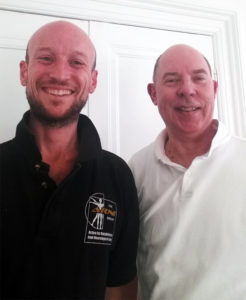 The senior physiotherapist at Haywards Heath recommended a physiotherapy company in Hove who she thought could help with my recovery. With their help I regained the unsteady use of my feet after a long struggle. However, their laid-back physiotherapist ran out of ideas and steam and things started to drift; exacerbated by her unreliable and inconsistent appointment scheduling, appalling timekeeping and crass payment management. I decided to take a break from them and scoured the internet for useful advice on DIY recovery techniques.
The senior physiotherapist at Haywards Heath recommended a physiotherapy company in Hove who she thought could help with my recovery. With their help I regained the unsteady use of my feet after a long struggle. However, their laid-back physiotherapist ran out of ideas and steam and things started to drift; exacerbated by her unreliable and inconsistent appointment scheduling, appalling timekeeping and crass payment management. I decided to take a break from them and scoured the internet for useful advice on DIY recovery techniques.
I found Dr. Balchin’s book ‘The Successful Stroke Survivor’. I thought here is someone who really knows what it’s like and has some useful techniques which could accelerate my recovery. I emailed Tom and asked him if ARNI had anyone in Hove who could help me. A few days later ARNI coach Patrick Hoad appeared on my doorstep. Patrick had walked from his home nearby. He thought that we had already met at Princess Royal hospital where he had served as a physiotherapist, which was correct.
This great start has matured into a respectful relationship based on excellent communication, trust and proven techniques, supported by an efficient appointment scheduling, excellent timekeeping and an accurate payment system (using ARNI Instructor referral group Stroke Solutions), which with Patrick’s stimulating ideas, empathy and a positive approach accelerate my continuing improvement.
When we started, I told Patrick that my goal was to be able to walk my daughter down the aisle at her wedding in a few months’ time in 2017. It was a goal that we achieved. My daughter and her new husband were so impressed by my improvement brought about by ARNI and Patrick’s work that instead of asking their many guests for wedding presents they asked for donations to ARNI. The newlyweds were pleased to send ARNI a sizeable donation. Now thanks to Patrick and ARNI I can now hold their new baby with confidence, something that I never thought that I would be able to do following my stroke.
Also, thanks to ARNI I no longer kick the wall as I climb the stairs and I can get up from the floor unaided; what a transformation. Thank you Tom, Patrick and ARNI for your help, powerful techniques, and support in my ongoing life changing experience. My main regret is that I did not know about ARNI when I left hospital because I am certain that their specialist knowledge and approach would have brought about my transformation much earlier; but I suppose you live, if you are lucky, and learn.
Geoff Neville
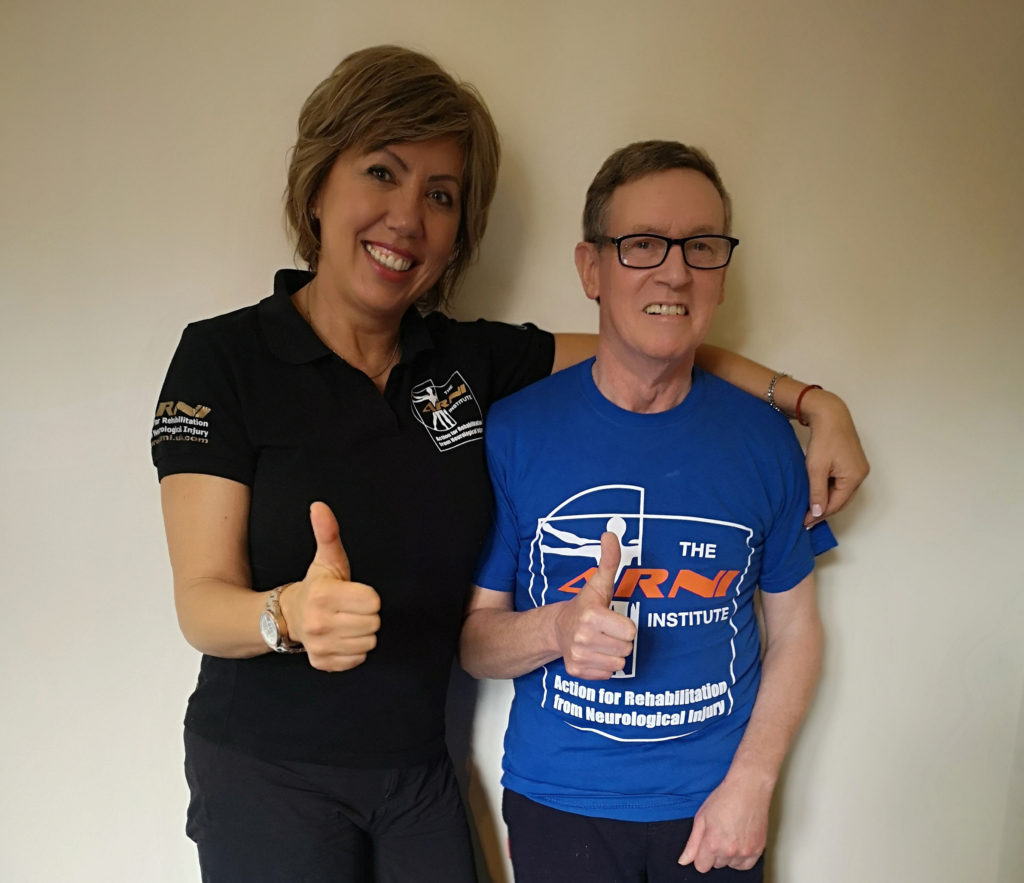 Gabi is fantastic and experienced physio who has helped improve my mobility vastly since I started with her over a year ago. She has a great understanding and positive attitude in each and every session. She comes well prepared with extra rehab kit we can use too and does regular performance measures for me to judge progress.
Gabi is fantastic and experienced physio who has helped improve my mobility vastly since I started with her over a year ago. She has a great understanding and positive attitude in each and every session. She comes well prepared with extra rehab kit we can use too and does regular performance measures for me to judge progress.
With the support of ARNI and Gabi’s excellent sessions, I feel that my physical and mental condition is more positive and I am improving daily.
I use the manual Successful Stoke Survivor and the DVD streaming every day so I can copy the exercises. What I tend to like is that each and every session is different but builds on what I have previously learnt / improved.
For my family and I, we feel that Gabi and Arni Institute is worth everything! I look forward to continuing my rehabilitation with Gabi and Arni Institute.
STEVE SUTTON
I had a right MCA Stroke with decompressive craniotomy in August 2018. On the 27th February 2919 I had the opportunity to travel to Surrey and have a one to one rehabilitation session with the inspirational Tom Balchin at the ARNI Charity.
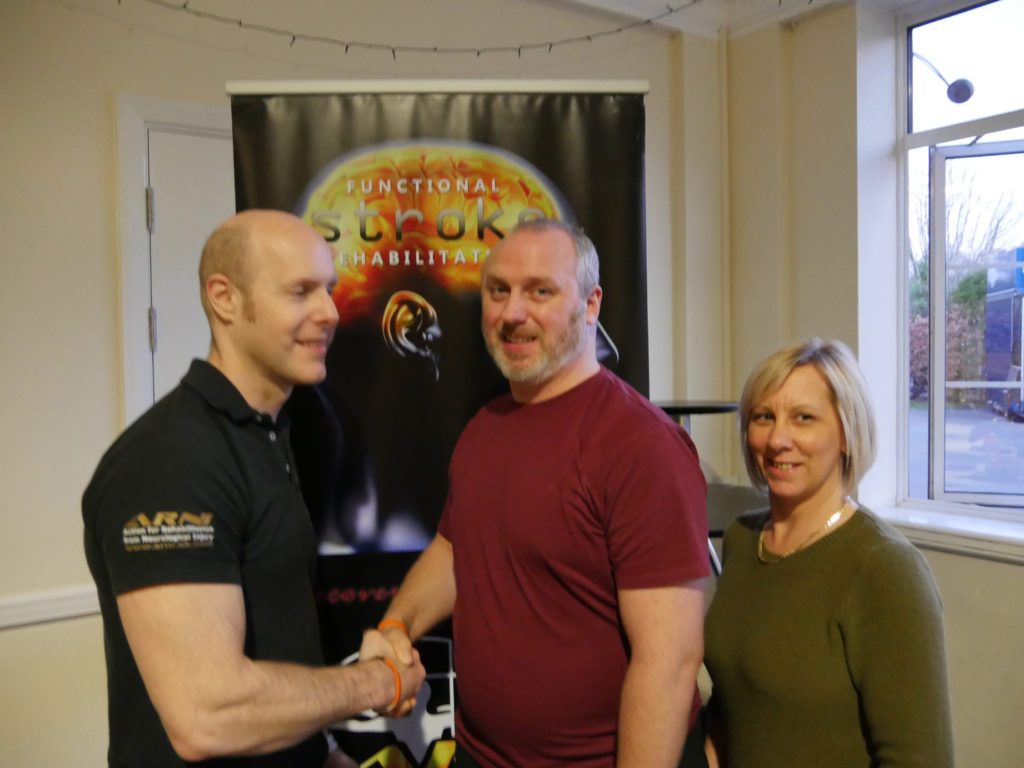 Prior to our visit Tom and his team contacted us in detail of the itinerary of the day and places to stay, which was very helpful beings we didn’t know the area, we stayed in the Lingfield Marriott hotel where rehabilitation took place. We took the opportunity to stay the night before so i was relaxed and could just stroll over to the sports bar in the morning.
Prior to our visit Tom and his team contacted us in detail of the itinerary of the day and places to stay, which was very helpful beings we didn’t know the area, we stayed in the Lingfield Marriott hotel where rehabilitation took place. We took the opportunity to stay the night before so i was relaxed and could just stroll over to the sports bar in the morning.
We arrived a little bit early and Tom and his wife were still setting up the equipment, straight away they made me and my wife feel welcome and at ease, we knew from the of that it was going to be a good day.
The first thing Tom and his team did was sit down and find out my stroke story in depth, generally getting to know how I feel and what I can or couldn’t do.
I told them what I wanted to achieve and things I wanted to work on to make my stroke recovery progress further. After an in depth conversation and some assessments which included doing a stroke impact scale and upper limb measure called CAHAI 9, we began the rehabilitation.
We went over to the mat and worked on techniques on how to get down on the floor and up again completely unaided!! This was the first time I’ve achieved this since my stroke in August 2018 my wife found it emotional to see me achieve things I’ve not been able to do.
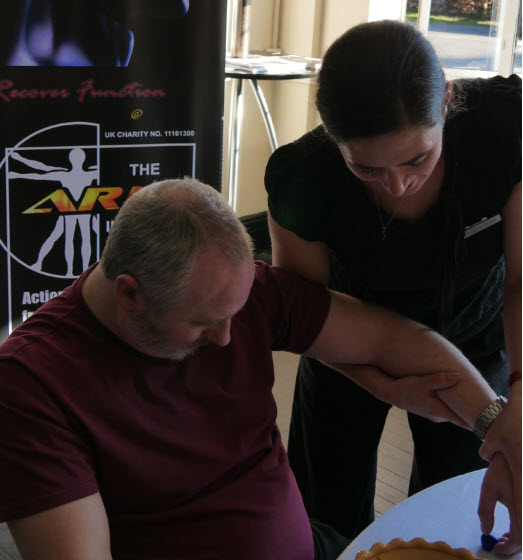 After lunch which was all kindly provided for we got to work on my upper limb, I’ve only recently got a little movement back in my arm but I’ve not been able to extend my fingers out! But with assistance with supporting my arm I was able to grasp and release objects!! Another first for me!!
After lunch which was all kindly provided for we got to work on my upper limb, I’ve only recently got a little movement back in my arm but I’ve not been able to extend my fingers out! But with assistance with supporting my arm I was able to grasp and release objects!! Another first for me!!
I’ve learnt that repetition is the key, as well as lots of other principles such as bilateral and unilateral work, cross-body training and the role mirror neurons can play.
We worked quite a lot with my upper arm and hand with other equipment, I also learnt lots of new stretches to release the tension in my hand which helped with the grasp and release action.
After that we went back to the mat to work on refined walking techniques, balance recovery, including how to change direction quickly, for example, if one was trying to manoeuvre in a busy crowd.
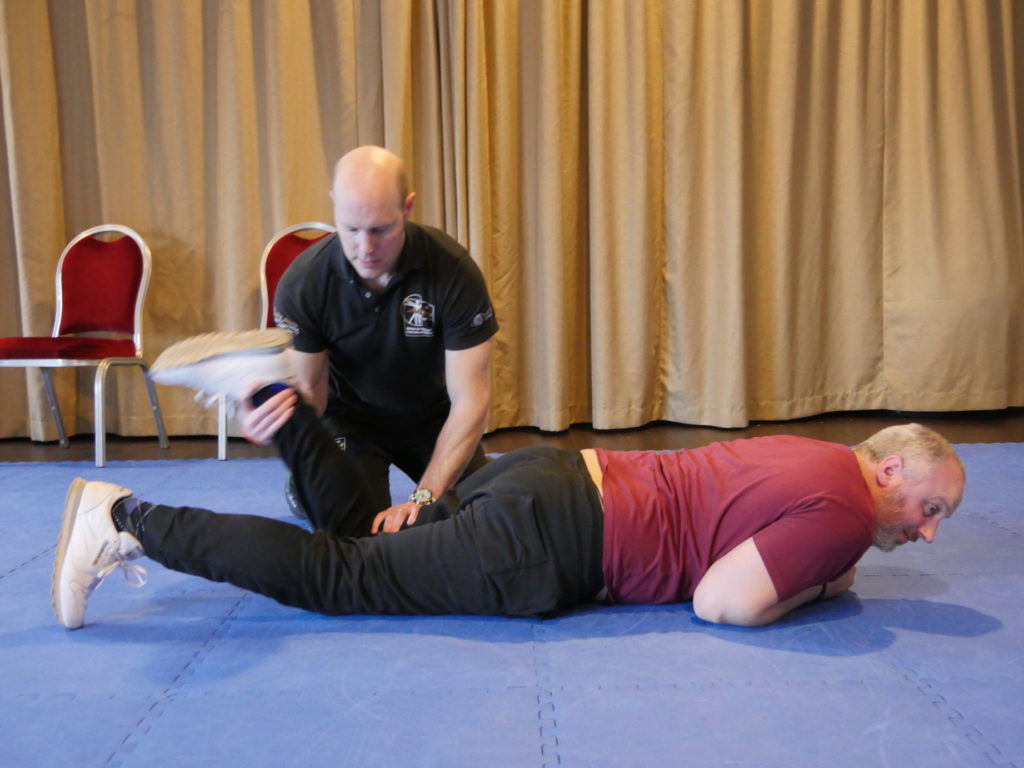 I did lots more exercises including squats, jumping! And rolling!
I did lots more exercises including squats, jumping! And rolling!
Everything that I did in that day was a first!! And I never for one minute thought I would be able to come away from there saying I’ve squatted, rolled, jumped, got on the floor and up again unaided!! Grasped and released objects!! All of that I achieved in one day!!
I think Tom is extremely knowledgeable and has spent many years researching and refining process and techniques which are able to help such a wide variety of stroke neuro related ailments, enabling his UK team to help a wide number of patients.
I would like to thank Tom and his team for there time and dedication in helping me on my recovery and I will look forward to putting everything I’ve learnt in to practice.
GARETH WALTERS
In the summer of 2014 I had a heart attack. I was 66 years of age, fit, and had not previously suffered any serious illness; I was in semi-retirement at the time. A month later, while recovering in hospital I was afflicted by a stroke that affected the left side of my body. For some weeks I was so weak that I could not support myself sitting up. I was eventually discharged two months later, but I was still unable to walk and reliant on a wheelchair. After some months I was making use of a mobility scooter for the outside. On release from hospital I received both basic physical therapy and the services of an occupational therapist on the NHS. The former treatment lasted around two months and was replaced by regular sessions in a hospital outpatient department. The occupational therapy continued meantime and I progressed to the point of being able to walk upstairs although my mobility was still very limited.
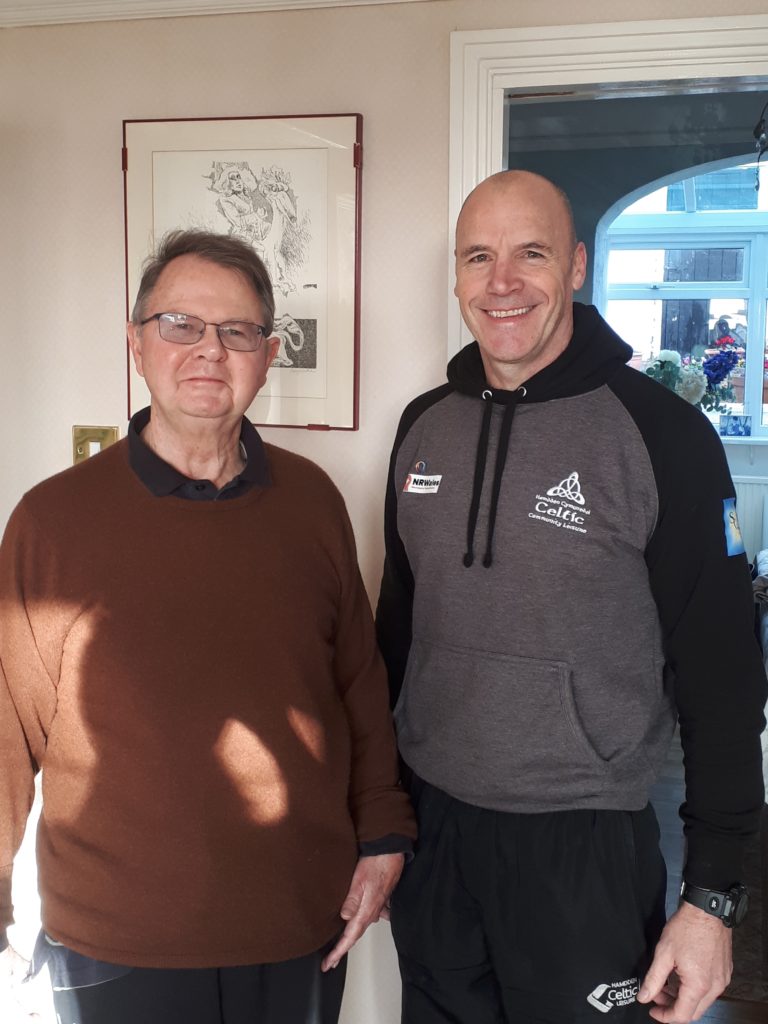 Through my occupational therapist I got to hear of ARNI and around a year after my stroke I had my initial session with David Francis, in Glynneath, Wales, who continues to be my instructor. I was very fortunate that David was willing to travel to my home for all my training as it was not easy for me to attend the centre at which he provides the ARNI sessions. At the start of my involvement with ARNI I also acquired Tom Balchin’s manual *The Successful Stroke Survivor*, and as well as reading about the benefits of the exercises it contained I was very enthused by the account that Tom provided of his own illness and his determination to overcome it.
Through my occupational therapist I got to hear of ARNI and around a year after my stroke I had my initial session with David Francis, in Glynneath, Wales, who continues to be my instructor. I was very fortunate that David was willing to travel to my home for all my training as it was not easy for me to attend the centre at which he provides the ARNI sessions. At the start of my involvement with ARNI I also acquired Tom Balchin’s manual *The Successful Stroke Survivor*, and as well as reading about the benefits of the exercises it contained I was very enthused by the account that Tom provided of his own illness and his determination to overcome it.
Above all, my experience with ARNI has been so positive because of the professionalism and dedication of David, my tutor. With his guidance I started to walk further and with greater confidence and was able to dispense with the stiff plastic ankle brace on which I was reliant. Moreover, with the passage of time I have been able to walk outside without constantly using a walking stick. Supplementing the practice of outside walking has been a whole range of exercises that David has taught me, designed to strengthen the parts of my body affected by the stroke, notably the leg and the foot. A side-effect of my involvement with David and the ARNI programme has been an improvement in my fitness level, important for my cardio-vascular health. In addition to my weekly sessions with David I exercise several times a week alone in the house, making use of the various activities I have been taught.
A stroke is, of course, a life-changing experience, but my involvement with ARNI via David Francis has served to mitigate the worse effects of that affliction. It has resulted in a better quality of life for me, and supplied me with greater independence, confidence and expectation.
CAMPBELL WILSON
It is fair to say that I was feeling a little apprehensive prior to my visit to see Tom in Surrey. While the health professionals around me were all very positive about the progress I had made, I was worried that I may not have been ready for the challenges and intense nature of a whole day of physio with Tom. Also, I had invested a great deal of hope in my time with Tom Balchin. Some aspects of my physical rehabilitation were not where I had hope they would be 8 months after my stroke: despite excellent physio support at my local hospital, I was still finding getting on and off of the floor from a chair very difficult and was still not really attempting this while alone at home; and I had enjoyed very few flickers of movement from my affected arm or hand (left for me).
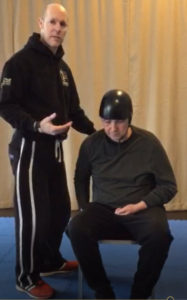 Perhaps my biggest concern was the fact that at the time of my trip to Surrey to work with Tom, I was still protecting the hole in the front right side of my skull by wearing a helmet whenever undertaking any activity that involves moving around. While I knew that my time learning ARNI techniques and knowledge with Tom Balchin was not going to be a ‘miracle cure’, my expectations were very high and all of these factors combined to ensure that I was nervous about the day and determined to learn as much as possible to aid my recovery. Tom was extremely expert, and kind, at helping to overcome these fears: Firstly with his excellent email communication in the days leading up to my trip; Secondly, with his unerringly professional and listening approach on the day. I was reassured before driving down from Scotland that he was used to working with stroke survivors with a missing bone-flap and that all activities and challenges would be appropriate to this fact and my own stage of recovery.
Perhaps my biggest concern was the fact that at the time of my trip to Surrey to work with Tom, I was still protecting the hole in the front right side of my skull by wearing a helmet whenever undertaking any activity that involves moving around. While I knew that my time learning ARNI techniques and knowledge with Tom Balchin was not going to be a ‘miracle cure’, my expectations were very high and all of these factors combined to ensure that I was nervous about the day and determined to learn as much as possible to aid my recovery. Tom was extremely expert, and kind, at helping to overcome these fears: Firstly with his excellent email communication in the days leading up to my trip; Secondly, with his unerringly professional and listening approach on the day. I was reassured before driving down from Scotland that he was used to working with stroke survivors with a missing bone-flap and that all activities and challenges would be appropriate to this fact and my own stage of recovery.
I was also reassured by the fact that Tom had enlisted the support of two other experienced ARNI therapy practitioners, Gail and Scotty (Gail being an acute stroke physio) – knowing that I was working with a team of three helped as it was more like the physio experience I was used to and it was clear that Tom’s communication with Scotty and Gail about my stage of recovery, medication, needs and situation was typically excellent.
The day was due to start at 10:30 am and, despite arriving early, it was clear that efforts had been made to prepare thoroughly for my visit. The journey from the hotel to Tom’s gym in the Sports Bar was straightforward enough. Wanting to preserve as much energy as possible for the day, I elected to use my wheelchair from the hotel which was simple because of good lifts in the hotel and suitable ramps between the main entrance and the Sports Studio where Tom and his team were waiting. Our welcome was warm and positive from the outset. We began with a full and detailed conversation about my stage of recovery, hopes for the day, concerns as well as an opportunity for me to ask questions. While my recovery has not been characterised by having high blood pressure, I had made Tom aware via email that my GP was about to start me on an Ace inhibitor medication to reduce my blood pressure a little. Tom was well prepared for this – he had brought a blood pressure monitoring kit to take my blood pressure at three points throughout the day to ensure my wellbeing and ability to undertake the day’s training. However, the team ended up checking my blood pressure at nine points during the day and recorded the readings for my GP.
Any fears that I had that I was going to be pushed too far beyond my ability were allayed by the team’s professionalism and clear care for me. The majority of the first few hours of the day were focussed on upper limb work which was welcome, particularly as there was access to a wider range of bespoke equipment than I had previously had access to during physio sessions at my local hospital. This helped to boost my confidence as I was quickly achieving more with my left hand than at any time previously in the 8 months since my stroke. The importance of stretching, repetition and persistence were reinforced and recommendations were made for purchasing some equipment once home again.
After this long and enjoyable session on upper limb work was over, it was time to check in with my blood pressure. Unfortunately, the reading was considerably higher than expected or than I had seen since my stroke. We had to have a discussion about whether it was appropriate to continue the session. Tom made contact with my GP and, after a careful and inclusive discussion around my health and the wisdom of continuing the treatment we decided together to proceed. I felt well and was determined that my journey from Scotland was not going to end without attempting to get as much as possible from the day. Of course, the anxiety of worrying that the day was going to come to a premature end did nothing to lower my blood pressure. However, the whole situation was treated with characteristic professionalism and compassion – it was the right decision to continue and much of the afternoon session ‘on the mat’ was the most useful time of the day. Before moving to floor work, we enjoyed a tasty, healthy and well-prepared lunch of sandwiches, crisps and drinks. Conversation was relaxed and fun but always related back to my recovery and mixed with sound advice and positivity.
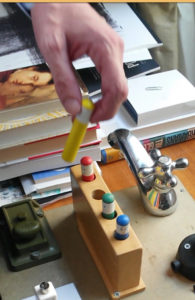 After lunch we spent some time analysing my walking gait and challenging me to walk without my stick while keeping my head up. This was absolutely appropriate to the stage that I was at and I found that Tom’s understanding of my limitations, combined with his expert advice on how to improve, soon had me walking with more confidence than at any time prior to my visit. We soon progressed to teaching me a new technique of getting from a chair to the floor and back up again. This was a real confidence boost and something I have been able to take home, making me safer at home and better able to attempt a more ambitious training programme. Thus emboldened, we returned to more ambitious upper limb work with equipment and techniques that untapped movement in my left arm and shoulder that had to that date been completely absent.
After lunch we spent some time analysing my walking gait and challenging me to walk without my stick while keeping my head up. This was absolutely appropriate to the stage that I was at and I found that Tom’s understanding of my limitations, combined with his expert advice on how to improve, soon had me walking with more confidence than at any time prior to my visit. We soon progressed to teaching me a new technique of getting from a chair to the floor and back up again. This was a real confidence boost and something I have been able to take home, making me safer at home and better able to attempt a more ambitious training programme. Thus emboldened, we returned to more ambitious upper limb work with equipment and techniques that untapped movement in my left arm and shoulder that had to that date been completely absent.
Tom had mentioned that we may have time to attempt getting on the floor and up again without the use of a chair as an aid and, while I was nervous about this, I was determined not to end the day without attempting it. We returned to the mats and Tom demonstrated the technique I was aiming for and guided me through the stages. Unfortunately, I was unable to succeed with the technique but I’m determined to achieve this next. That said, the team were great and were keen to focus on my many successes rather than one failure and I left knowing that I had achieved more than I thought I was capable of before the day. The end of the session was slightly rushed as we ran right over time meaning there was not time for a detailed plenary but Tom, determined as ever to ensure I get the very best experience possible, suggested meeting the following day to further discuss my training programme and offer his advice. I was very tired at the end of what had been a long day. The facilities at the Lingfield Marriott were perfect for unwinding and refuelling. The room was very accessible and the staff, extremely friendly attentive to my needs. We enjoyed a lovely meal in the bar area in the evening.
I met again with Tom the next morning and again I was impressed by the amount of thought he had given to my particular needs and he offered excellent advice on how he thought I should progress my training on my return to Scotland. After one last blood pressure check with Tom, I left Surrey feeling very positive about the future and with a much clearer idea of what I should be doing to maximise my recovery; I have also been very grateful for the ongoing support and guidance via email and I feel I am able to drop Tom a line any time I have a question. There was no miracle cure after my visit to work with Tom but it was never going to be that. I am very pleased that I took time to engage with Tom’s training and was pleased too that all of his advice was complimentary to the advice I have been receiving from the physiotherapists in charge of my care in Scotland. If you are a stroke survivor given the opportunity to work with Tom, I urge you to go for it as his expertise, positivity and professionalism can only take you further down the road of your recovery.
Campbell Wilson. March 2018
SHARON JEFFERIES
25 October 2017. I arri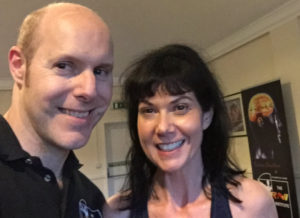 ved at the Marriott Lingfield in good time. Saw immediately the side building to the right of the hotel where the training is run. Had some free time so had a coffee in the hotel bar. At 1050 I wandered over to the building. Sure enough Tom was there. He puts you at ease immediately and we discussed my Stoke which occurred in February of this year, the Auto-Immune illness which caused the Stroke, and my list of medications. Tom had taken time to look up any that he wasn’t familiar with.
ved at the Marriott Lingfield in good time. Saw immediately the side building to the right of the hotel where the training is run. Had some free time so had a coffee in the hotel bar. At 1050 I wandered over to the building. Sure enough Tom was there. He puts you at ease immediately and we discussed my Stoke which occurred in February of this year, the Auto-Immune illness which caused the Stroke, and my list of medications. Tom had taken time to look up any that he wasn’t familiar with.
We were joined by ARNI trainer Jo, who is a personal trainer. I thought this was a good match-up, as I had told Tom how much I used the gym pre-stroke, and how I still do now.
We made a start on the large matted area at the front of the room. Tom didn’t waste time once he saw that I was past my problems of getting down onto, and off the floor. It was clear that he was going to tailor-make it especially for me. After diagnosing my gait control and giving me a great solution to completely counteract my foot swinging out to the side when I walk, the two of them started gently perturbing my balance – in order to see how I performed when unstable. It felt so weird because all balance work I have ever done with Physios (post Stroke) involves non-contact stationary exercises – standing on one leg with the eyes closed. Then we went out onto the grass and they got me to run! But I can’t run I said, they said we’re going to try – Jo ran along side me for safety holding my arm. It was the best feeling – I was running – not at all gracefully and not in any way like I used to but indeed I was running.
Lunch was sandwiches courtesy of Tom’s wife and Jo showcased some of her healthy food. The topics flowed easily – how we have to eat healthily post stroke, taking time to evaluate life after stroke. Stress and stroke.
The second half of the day was spent on Task Related Training and specific stretches to achieve the tasks. I never knew that there were stretches to help you a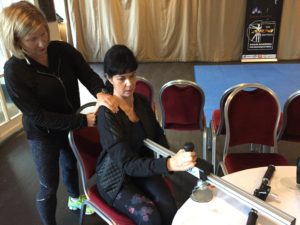 chieve tasks! Tom showed me some best ways to grab objects, and we need to grab them many many times. This was a major part of the day – reaching and grasping objects of varying shapes and sizes – you really do have to do many, many repetitions in order to improve. This is in line with current research – Repetitive Task Related Training, done yourself, with even the stretches done yourself. We also used an amazing piece of kit which helps with arm extension that was bolted to the table which I might buy for use at home.
chieve tasks! Tom showed me some best ways to grab objects, and we need to grab them many many times. This was a major part of the day – reaching and grasping objects of varying shapes and sizes – you really do have to do many, many repetitions in order to improve. This is in line with current research – Repetitive Task Related Training, done yourself, with even the stretches done yourself. We also used an amazing piece of kit which helps with arm extension that was bolted to the table which I might buy for use at home.
And now we were down to the last hour. I was exhausted, and when Tom passed me a 5kg double-handled medicine ball my initial thought was I can’t lift that much, I used to lift 5kg pre-stroke but not now. But I bit my tongue, this because I’ve read in the book the importance of strength and power training after stroke…and before I knew it I was lifting it for lots of repetitions – albeit my good arm was doing most it my bad arm was actively involved also.
And then I bid them farewell – with a promise from Tom that he was put a training programme on paper for me and list all the products and tools which I had found useful over the day. One of my biggest problems has been transferring exercises and techniques which I have found useful into my home, to use on a daily basis.
I headed to the bar in the Marriott again – I was so exhausted and needed time for everything to sink in. Tom works only on the latest research and it is all task-related.
HARRY BAKER
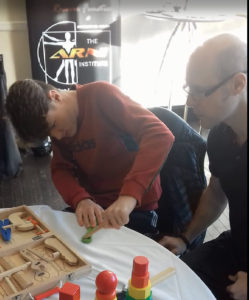 Our 16-year-old son had a stroke in January, leaving him with weakness in the left side and other associated difficulties such as fatigue. Being a very active and sporty young man, he has been extremely keen to regain as much function as possible in both upper and lower limbs. He had excellent neurological rehabilitation in King’s College Hospital, an intensive and effective upper limb programme at Queen Square, and follow-on occupational and therapy for the few months following discharge, but the key to his future development is undoubtedly ARNI.
Our 16-year-old son had a stroke in January, leaving him with weakness in the left side and other associated difficulties such as fatigue. Being a very active and sporty young man, he has been extremely keen to regain as much function as possible in both upper and lower limbs. He had excellent neurological rehabilitation in King’s College Hospital, an intensive and effective upper limb programme at Queen Square, and follow-on occupational and therapy for the few months following discharge, but the key to his future development is undoubtedly ARNI.
It was clear that where hospital and local community resources trail off, there is still a huge need for functional rehabilitation and from our very first contact with Dr Tom Balchin in August, we have been convinced that the ARNI programme fits the bill for Harry.
What is so special about the ARNI approach? Firstly, the quality of personal engagement and the depth of expertise Tom and his trainers bring to stroke survivors meant that Harry saw the motivation needed from the very outset. Work on wrist rotation, stretching exercises targeting the thumb and fingers have already enabled Harry to pick up, transfer and place small objects. Tom seemed to understand Harry and where his motivation lies.
On our second visit to Lingfield, a full day was devoted to a variety of activities, discussing the history of the stroke, current medical situation and identifying key areas for strengthening. The benefits of further specific training were outlined after his balance was tested, and further techniques to mobilise the upper limb were practised. We were also shown a range of “kit” and appropriate strategies and literature to help to vary the repetitions that speed recovery.
Most importantly perhaps, we are enormously grateful for Tom’s generosity and the inspirational guidance, both physical and psychological, that he gave to Harry, and I know he is doing the same for many others. He is pointing a way forward tailored to Harry’s needs and abilities, that involves self-directed exercise and functional practice. He buoyed Harry with personal insights drawn from his own experience and was extremely encouraging about his potential for recovery.
We feel very fortunate to have discovered ARNI and privileged to have the support of Dr Tom Balchin and his team.
Jonathan, Roz and Harry Baker
Eric Le Royer
 I am Swiss, 53 year old and I am a stroke survivor recently back home after a long rehab hospitalization. My stroke occurred a year ago, yielding into a left side hemiplegia. I currently have ambulatory physiotherapy therapy twice a week. Returning home a few months ago, I found it insufficient to continue on a suitable rehab trajectory. Surfing the web, I observed my issue was a pretty common problem for many stroke survivors. While I did not find programs to help me locally, I was intrigued by ARNI, a British charity helping stroke survivors better coping with the “return home” syndrome. We bought Tom’s book. With my wife, who is very involved in my home rehab programs, we read the book and felt encouraged by ARNI perspectives, programs and results, described by Tom. I told her, why don’t we go to England to follow a ARNI practical experience? London is a just a flight away from where we live in Switzerland.
I am Swiss, 53 year old and I am a stroke survivor recently back home after a long rehab hospitalization. My stroke occurred a year ago, yielding into a left side hemiplegia. I currently have ambulatory physiotherapy therapy twice a week. Returning home a few months ago, I found it insufficient to continue on a suitable rehab trajectory. Surfing the web, I observed my issue was a pretty common problem for many stroke survivors. While I did not find programs to help me locally, I was intrigued by ARNI, a British charity helping stroke survivors better coping with the “return home” syndrome. We bought Tom’s book. With my wife, who is very involved in my home rehab programs, we read the book and felt encouraged by ARNI perspectives, programs and results, described by Tom. I told her, why don’t we go to England to follow a ARNI practical experience? London is a just a flight away from where we live in Switzerland.
We contacted Tom on what could be done. Tom was very responsive and showed a kind interest to design a crash course around our needs, which consisted in a day training in Lingfield and another day in London. In two days, we got a download of all the experience of senior ARNI trainers. This was terrific. We enjoyed it fully and we gathered a lot of practical and relevant techniques to bring back home. I was pushed to limits I believe I could never reach. The ARNI approach, based on repeatable tasks requiring few affordable tools, is quite easy to understand and implement in home setting. Besides the learning, the enthusiasm and the drive of the ARNI trainers, some of them stroke survivors, were contagious giving HOPE and WILL to boost my training.
We have now three months of home practice and while we can still improve on the discipline, we can see some visible first results most notably with increased mobility of fingers, leg, and arm of my “sleepy” side. Even if you are not England based, ARNI approach and techniques can easily become your routine using the videos, books and other materials or by complementing them with a trip to England. If you find rehab tough and annoying, you are not the only one (I am often ready to give up), give a try to ARNI, you will soon see tangible results.
Eric Le Royer
ELLIE BOAKES
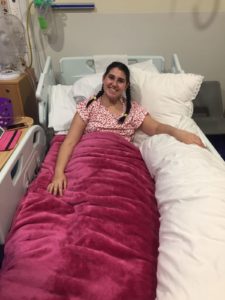
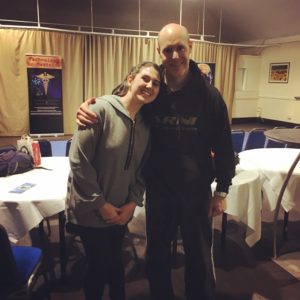
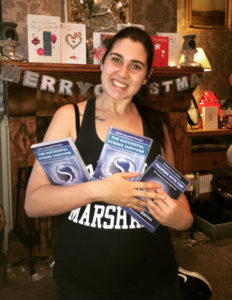
At the age of 22 I underwent surgery in August 2016 to hopefully stop the epilepsy that had plagued me most of my life. Unfortunately things didn’t go to plan and I suffered a stroke, this was due to a blood vessel being clamped and cutting off the blood supply.
I lost the use of my complete left side and was in hospital for three months. Being such an outgoing person who loved swimming, socialising and even enjoyed going to work! it was quite a shock to the system having to rely on other people constantly. Luckily a family friend knew about a company run by Dr Tom Balchin called ARNI institute for stroke survivors who provided specialist rehabilitation and exercise support after hospital and community physiotherapy finishes. I was so eager to meet Tom and his team and have a day’s session. While I was still in hospital, I booked a session as soon as I could as I wanted to get back to being me.
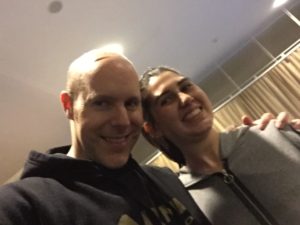 On the 13th December 2016, the day finally arrived! I was going to spend the day working on my left side with Tom. I can honestly say it was such an overwhelming and amazing day, one of the best days of my life!!! Tom helped me achieve movements I never thought I would see again for years! For example, picking and releasing with my left hand. He also taught me techniques to manage everyday life such as sitting position to standing position, steps to side to get out of danger and lots more. I was so inspired by the day that I went home and immediately purchased Tom’s full set of DVD’s called ‘The Successful Stroke Survivor’, which I would say is brilliant!
On the 13th December 2016, the day finally arrived! I was going to spend the day working on my left side with Tom. I can honestly say it was such an overwhelming and amazing day, one of the best days of my life!!! Tom helped me achieve movements I never thought I would see again for years! For example, picking and releasing with my left hand. He also taught me techniques to manage everyday life such as sitting position to standing position, steps to side to get out of danger and lots more. I was so inspired by the day that I went home and immediately purchased Tom’s full set of DVD’s called ‘The Successful Stroke Survivor’, which I would say is brilliant!
As fellow stroke survivors will know it can be quite a daunting, stressful and lonely path to recovery. I feel my family and friends are my important support network to keep me calm, centered and motivated, even at times when I have felt scared and vulnerable. It is nice that I can now include the larger Arnie Institute Group as part of my personal development team.
I found the day fun, motivational and very enjoyable and would thoroughly recommend anyone who is recovering from a stroke to attend this 1-1 with Tom and his team can’t wait to start with an Arnie instructor.
SALLY JACKSON
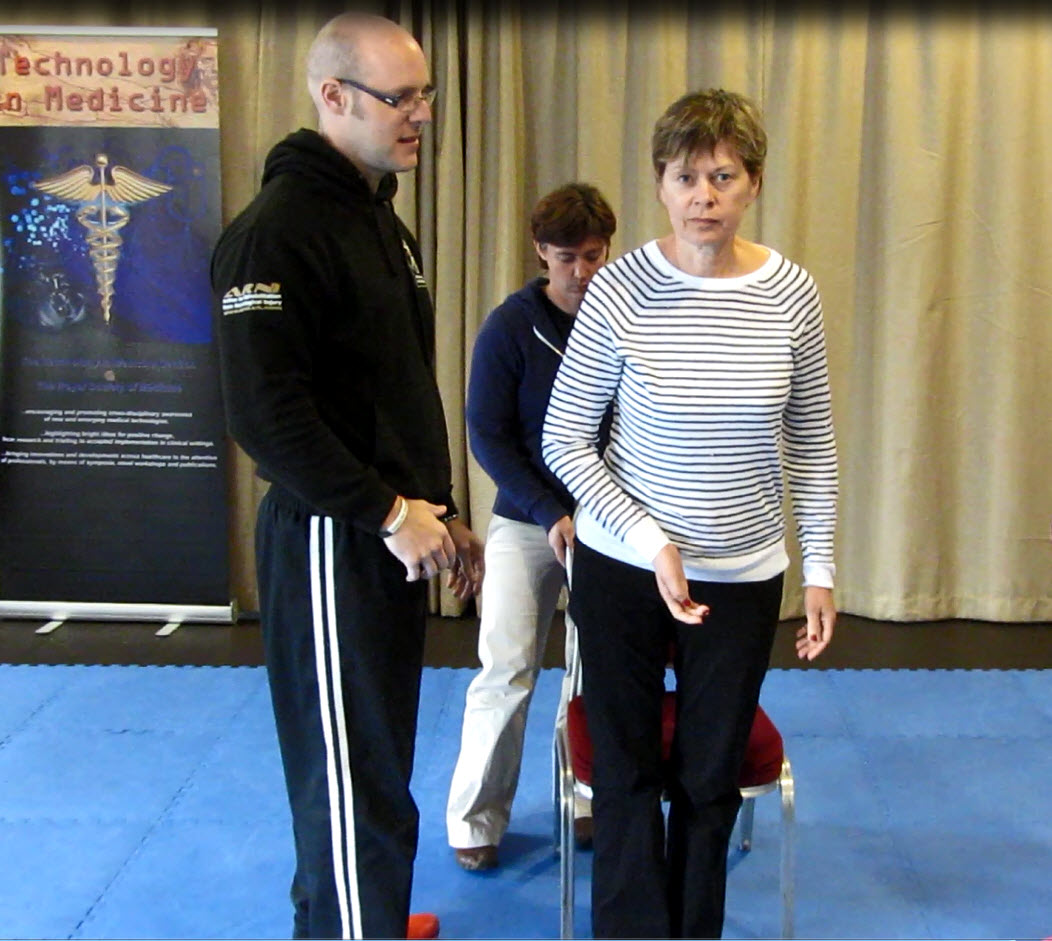
Tom, hope it’s not too long winded-if so tell me & I’ll edit! It’s from the heart…
It all began on the 15th of September 2015. My beloved Sally got up from the sofa at 6.40 pm on that Tuesday evening to feed Crumble the cat. I heard a crashing noise in the kitchen & ran to investigate to find her on the floor unconscious.
She was only 48 years of age. When the ambulance arrived & eventually delivered her to Gloucester A & E I honestly believed that she’d be back with me again the next day. Little did I know what was before us!
So, the diagnosis was a large left hemisphere stroke. Ten weeks of care & rehabilitation in the stroke ward followed under the supervision of a wonderful consultant. Her right side movement was severely restricted & along with her speech & language. They managed to get her to stand, partially dress herself & say a few words. Why had this happened to someone who was very fit & healthy with low blood pressure & low cholesterol?
Then came discharge & we are home again but in a totally different world. I’m now a full time carer & trying to keep myself together with a full time demanding job. Wonderful care from the NHS via “early supportive discharge team”. Occupational therapy, physiotherapy & speech. At the end of twelve weeks she was walking upstairs with help, walking around the house & saying a few more words.
The next phase in January 2016 saw us having out patient care at North Cotswold Hospital. As great as it was it just dwindled over the coming months & we are on our own.So now I’m investigating additional help & of course I turned to the internet. I read so many heart breaking stories & realised that we were amongst so many. I read about Andrew Marr, the journalist & how he had made a good recovery from a similar stroke. He spoke of the need for constant early repetitive tasks & physiotherapy to promote the journey to recovery. He had been in contact with the ARNI institute & had positive results under the guidance & supervision of Dr Tom Balchin. So, that was where I headed. I also discovered his publication “The successful stroke survivor” which we read from cover to cover. He also sent us straight away free copies of his new video publications as a special preview copy which is brilliant in no non nonsense terms & explains & demonstrates how to achieve daily tasks which Sally has been unable to do hitherto.
I e mailed Dr Tom & he responded with a call to home. How nice is that? We had a long conversation on that Sunday evening about Sally’s situation & progress. I came off the phone & felt motivated & excited. Here is someone who understands what we have been going through & genuinely wants to help. The ARNI Institute is exactly what we need. A date for Sally, 25th of October 2016, to see Dr Tom was arranged with a one to one session, so now we wait with anticipation.
The day came & in the first few moments he challenged Sally’s need for her tripod stick & right arm sling after thirteen months. (She hasn’t worn the sling since & uses the stick much less).
Straight away we were aware of his empathy with Sally’s situation because we discovered that he had suffered a stroke too some years ago.Later that morning after a diagnosis with two of Dr Tom’s colleagues Laura & Liz, we were walking unaided around the gym area. Constant guidance & coaching on how Sally should position herself, where to propel the energy for most effective results, sitting to standing & sitting to floor. It was a joy to watch.
The most dramatic moment came in the afternoon when he worked on upper body areas. Sally hasn’t moved her right arm for thirteen months & was previously told that it probably will never work again. Quite frankly we had given up on her arm & resigned ourselves to managing with one arm for the rest of her life. Within a few minutes Dr Tom had her lifting her arm & gripping small objects, lifting them in the air, down & back to the table. It was a most emotional moment & several tears were shed! She then got better and better at this over 2 hours!
How did he do that I asked? The potential was of course always there but it needed the right specialist coaching. He used different strategies than we have previously been used to. His methods are up to date, researched & inspiring. So, now Sally is a different person – she has an arm that moves albeit in tiny increments but thirteen months of inactivity have taken their toll. She has her zest for life again & sees recovery, in what ever form it takes, on the horizon.
We’re back to see Dr Tom for our second session later this month & Sally can’t wait. For the first time we have real hope of a recovery. He is a very gifted man but in his kind approach he is very firm when he needs to be to get the results he knows are possible. I would urge others who are stroke survivors to approach the ARNI institute.
Well done Dr Tom we are indebted to you.
Simon & Sally Jackson
Jackie
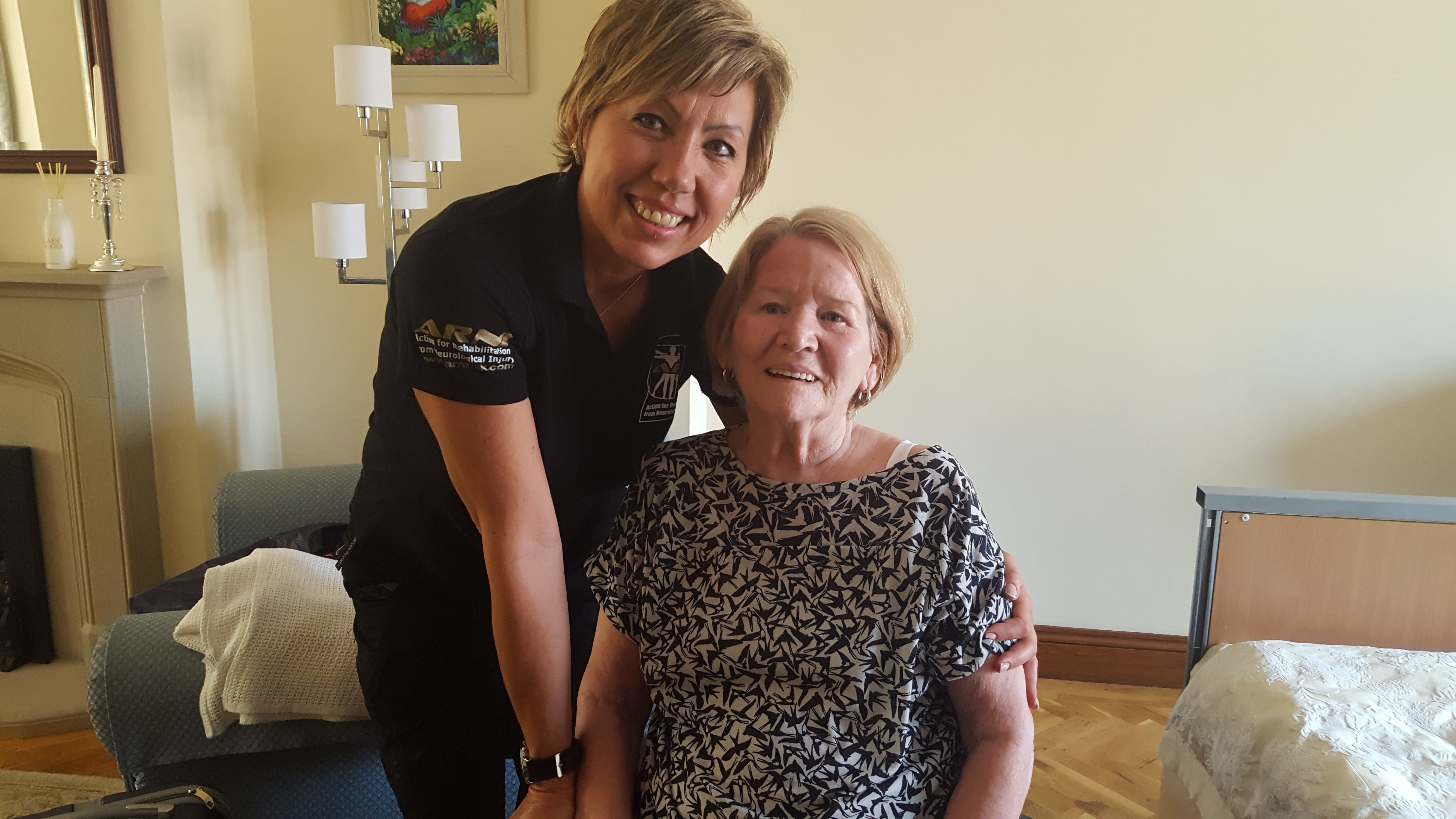
I first met Gabi towards the end of September 2015, after being in hospital for almost 6 months. Even though I hadn’t had a stroke, I was recommended ARNI for physiotherapy rehabilitation.
Spending the previous six months, laying in bed with hardly any physio, meeting Gabi was a breath of fresh air. From the very start she has given me confidence and hope, and had me on my feet from the very first session! Her knowledge of medical matters is vast, and this coupled with her infectious confidence made me feel better from the beginning. Gabi is much more than a physical therapist, she is interested in your whole well being and has recommended and carried out many complimentary therapies.
What Gabi has given me and my family is immeasurable. I look forward to her visits (even though it’s hard work!) and thanks to Gabi, I look forward to the future with hope.
North London Success Story
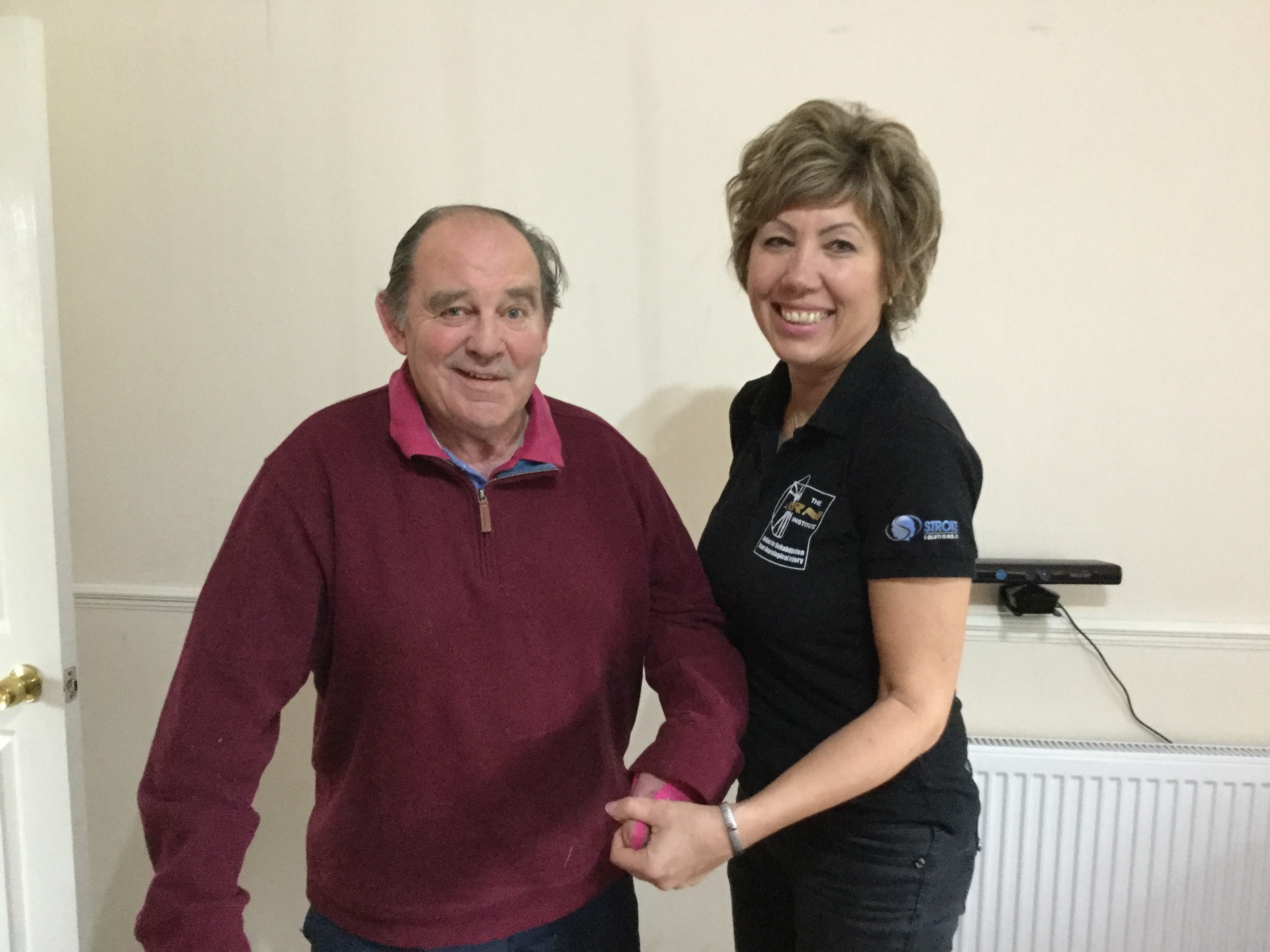
I had a severe stroke in February 2012 caused by a bleed on the brain. I spent about 2 weeks in a coma and as a result I lost the use my left leg and arm. I was in Hospital for 5 months before discharge.
In many respects I have been very lucky in that having spent 37 years in a Cavalry Regiment of the British Army and also volunteered and spent 3 years serving as a paratrooper with the airborne forces. So I have been reasonably fit and active all my life. This has all helped to give me a fairly robust view to adversity and a stronger mental approach towards what life can throw one’s way. To this must be added the invaluable help and encouragement given to me by my wife Elizabeth and family who have thought laterally to get round problems where and when they have cropped up.
In July 2014 a friend who had also had a stroke introduced me to Gabi and ARNI, for which I shall be forever grateful!! On my first meeting Gabi instantly gave me encouragement that my progress had not plateaued and has astonished me by the simplest changes that have made such a difference. With her depth of knowledge and skill and encouragement, my confidence and abilities have grown. She has been able to push me further over the last year, and that, and the many progressive exercises she has shown me, are helping me enormously.
I am much stronger and more confident in my ability do things which others do as a matter of course. Such as going up and down awkward steps that have no handrails and going into strange environments, and even being able to get up from the floor! Most people also remark as to how well I look and seem.
In summary, my year spent with Gaby has left me far better prepared to face life’s challenges. The exercises I have been given have been progressively made more challenging so that I feel that I can continue to achieve more generally.
David Banks- 2016
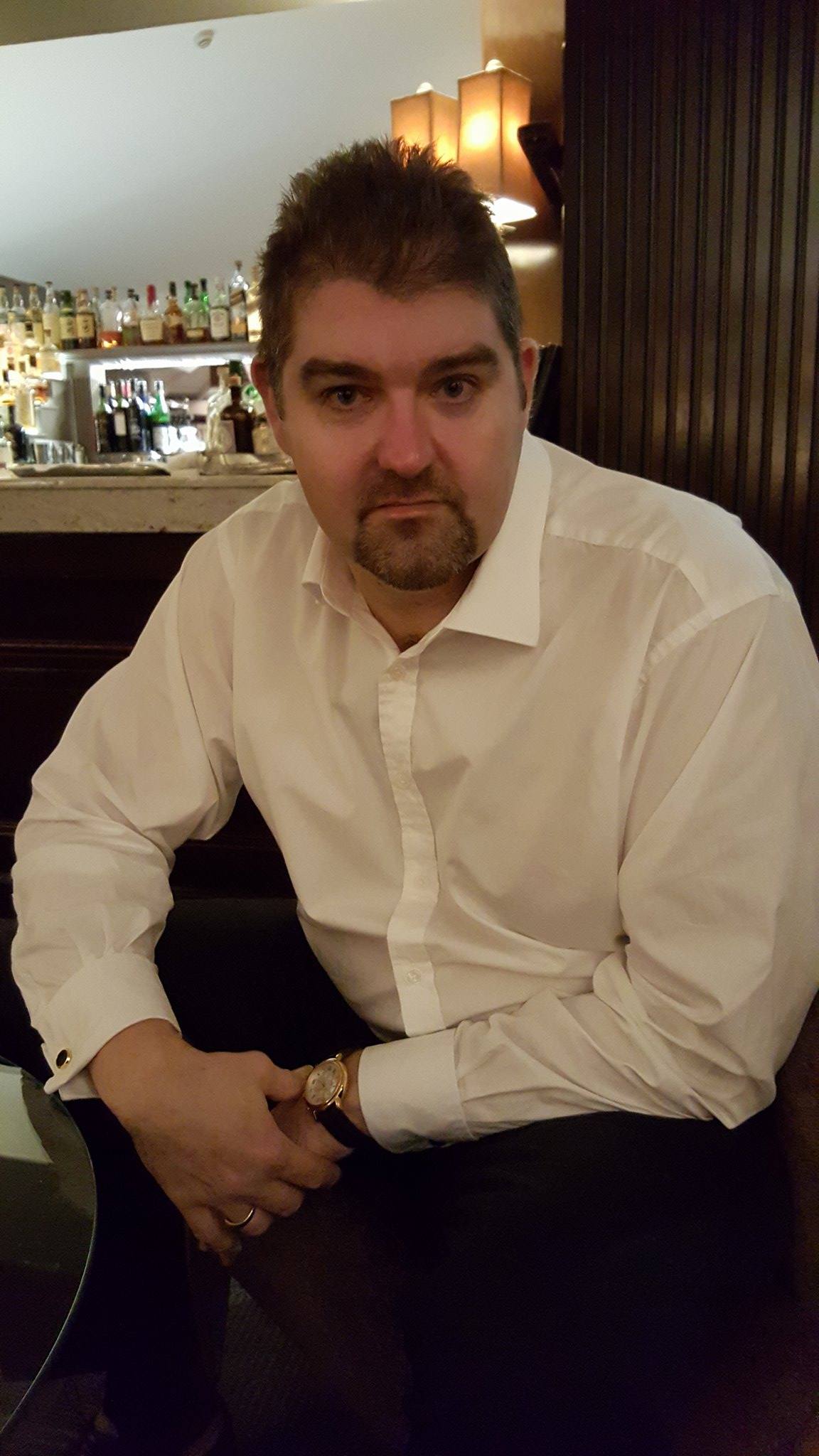
Having suffered a stroke 5 months earlier, I had become concerned by the lack of progress I was making. I began looking for other resources that I could draw upon to supplement my Health Service Physiotherapy. I was fortunate enough to come across the excellent book “THE SUCCESSFUL STROKE SURVIVOR” BY DR TOM BALCHIN.
I found the book to be a great resource of exercises, practical advice and inspiration. I credit the book with helping me improve my ability to get around with less effort. Having had positive results following Dr Balchin’s Advice in his book I decided to attend a one-day training course run by Dr Balchin.
Being based in Aberdeen and not having flown since my stroke it was quite an undertaking for me, however I am delighted to have made the effort because I found the day to be hugely beneficial in terms of how my recovery could be enhanced by Dr Balchin’s techinques and exercises. There were 5 other therapists there to help me.
Subsequent to attending the course I received personally designed exercise program from DR Balchin that will allow me to maximise my recovery potential.
David Carter
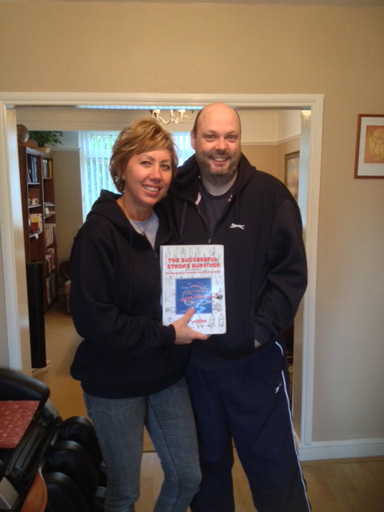
As a stroke survivor of 4 years with left-sided hemiplegia in both my upper & lower limbs! I approached ARNI for help in March 2014. In my particular circumstances post-hospital NHS & private therapy, although extremely useful at the time, had failed to deliver the required level of improvement that I had expected.
ARNI were very easy to contact (in my case, via email) & they were very efficient in matching me with a locally-based professional instructor. My instructor, Gabriella, made me feel very welcome & relaxed on our first session & although she was very thorough in assessing my specific requirements the induction process was far from arduous.
Once accepted as a client I arranged to attend weekly 1 hour therapy sessions. My wife has been made more than welcome to sit in on all of my sessions & has been positively encouraged to provide input & feedback. This has been a massive help for me & ultimately very informative for my wife who now feels better equipped to support my specific rehabilitation requirements outside of the therapy clinic.
My instructor, Gabriella has been able to explain everything about the ARNI methodology in terms that I find easy to understand & together we feel that I have made significant progress. Importantly I have had a big input into defining my own achievable goals & aspirations.
I particularly appreciate the fact that my instructor wants me to improve & achieve my goals just as much as I do. It feels like we have developed a partnership for success.
Based on my experience I would not hesitate to recommend ARNI to any stroke survivor with physical rehabilitation needs & I feel very lucky to have been looked after in such a professional & dignified manner.
April 2015 update: My rehab is still ongoing & I’m still making progress despite not being any good at all at keeping up my exercises when I’m at home! It’s a good job that my angel Gabi always ensures that I’m worked hard during my sessions with her though!
October 2016 update:
Dear Tom,
It has been such a long time since we have seen you.
How do we ever thank you for introducing us to Gabi. She has totally gone
above and beyond in every session.
If we had listened to the doctors David would of still been in a wheel chair
with no movement in his left side but thanks to ARNI, Gabi and Beth David is
now walking (not just around house but really walking around parks even
using public transport!!!) and David has major movement in his left arm.
The other day we stopped in park for coffee and in one hand David had a
coffee the other he was eating a biscuit with his bad arm while
standing!!!!! Wow I was blown away to be honest I screamed as he just did
all this naturally like other people take for granted!!!! But for a stroke
survivor this is major independence which is all David asked for and you
have given this precious gift to him.
David is a Doctor so when all the best most expensive doctors said when he
was in a wheelchair with no movement in his left arm hand at all said this
is the best he can get. David beloved it. But thanks to Google you
appeared at 3am after many many late nights search for help on the net!!!!!
And now he is standing, sipping coffee and nibbling on a biscuit all at
once!!!! What else can you ask for!!! Anyway the point is Doctors see the
problems ARNI see so much potential for improvement!!!! Ypu never promised
us anything which I do appreciated.
Gabi has been working with David for 4 months and wow her positivity and
dedication I think is stronger than mine!!!! Her belief in David is of such
respect and kindness but oh she gets him doing extra exercise and he does
not even know it!!!! Gabi has got me also joining in the sessions which had
been so good as it is the closest people who also need a little left too.
Gabi every session brings a new tool or something to try she never turns up
without her huge smile and huge amount of positivity.
I can not thank you enough Tom and Gabi for all you do for my husband but
what you have done for me, our children, our families and friends. As you
have given David independence which improves yes him but improves all of our
lives the people that love David.
I would love to meet when you have time as I have a few crazy ideas for ypu
to think about!!!!! Check out ‘thenofycoach’.
All my best,
Mandy
Gemma Price
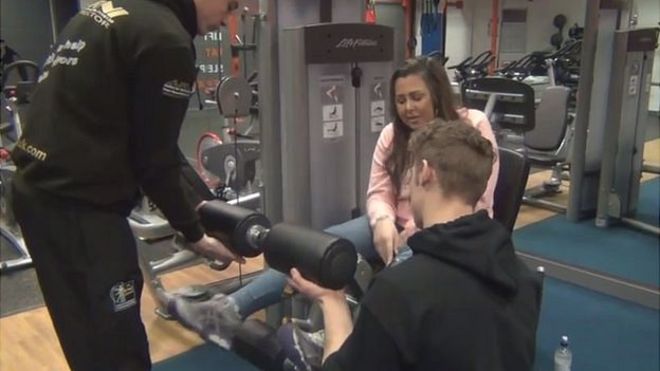
BBC News featuring ARNI Neath Port Talbot
Hit over the head 15 times with a claw hammer and left for dead by her ex-boyfriend, Gemma Price is now learning how to walk again thanks to a ground-breaking programme, also used by BBC presenter Andrew Marr after he suffered a stroke.
Gemma Price’s parents were so convinced their daughter would die after a vicious attack by her ex-boyfriend that they planned her funeral.
But against the odds the 32-year-old survived and, after almost two years in hospital and numerous brain surgeries, she is now learning how to walk again.
It is a far cry from the early days after the attack in May 2011, when Miss Price, then a shop manageress, arrived home one Saturday to find her ex-boyfriend Kyle Llewellyn waiting for her.
He was convinced bubbly Miss Price, from Briton Ferry, Neath Port Talbot, had started seeing his best friend and flew into a rage – smashing her over the head 15 times with the hammer when she tried to ward him off, before leaving her for dead.
Swansea Crown Court later heard he phoned his father and told him: “Dad, I killed Gemma. I’m sorry, she was seeing someone else. I lost my head I hit her with a hammer.”
His father rushed to the house where he found Miss Price covered in blood. Llewellyn, then 24, was arrested at Briton Ferry train station.
The court heard he had become jealous while looking on Facebook.
‘Just jealousy’
He was jailed for 14 years in November 2011 after admitting his ex-girlfriend’s attempted murder.
“It was jealousy, that’s all,” she said.
“I had never seen it in him before, he was a lovely guy but then it just happened out of nowhere.
“I loved him, you think you know someone then you find out you never did.”
Miss Price was rushed to Swansea’s Morriston Hospital with severe brain injuries, her ear was ripped off, her eardrum had been torn out, her jaw broken and her hands broken.
“What I remember from the attack is horrendous noise of my eardrum being knocked out,” said Miss Price. “My right ear was ripped off too. Then I blacked out.”
Her parents, Joan and Kieron Price, were told to expect the worst.
After being in a coma and on life support machine for a month, Miss Price was moved to the University Hospital of Wales in Cardiff.
‘Reconstruct my skull’
A brain surgeon and specialist team started the long and painstaking process of operating on her injuries.
“When he attacked me with the hammer my brain was completely damaged and brain fluid leaked into my ear, they had to completely reconstruct my skull,” said Miss Price.
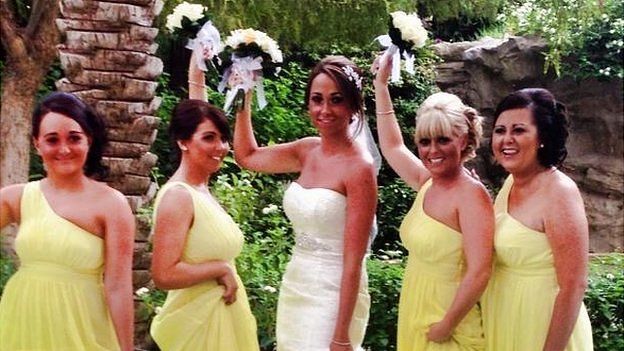
Miss Price (far right) underwent intensive physiotherapy to be a bridesmaid at her sister’s wedding in 2013
“Part of my skull has now been completely been taken away.”
Because she had a tracheotomy Miss Price had to learn how to speak again as well.
Reconstructive surgery was done on the ear which was ripped off with skin grafted from elsewhere, although she still does not have an eardrum.
“They say I might be able to have surgery at some point to replace the eardrum,” said Miss Price. “We will see though.”
She is thankful some things did not change, though.
“I have always been a bubbly sort of person and I’m so happy my personality didn’t change after the attack,” she said.
After additional stays in both Rookwood and Neath Port Talbot Hospital Miss Price finally returned home.
Learning to walk
“When I got home I couldn’t even get up,” said Miss Price. “I was not able to walk unaided and had four members of my family running around helping me, but I was determined to live alone and in the end relied on my wheelchair to get around the house.”
But that year her sister Donna Charves, who Miss Price describes as “my rock” was to get married. Miss Price was determined to be there.
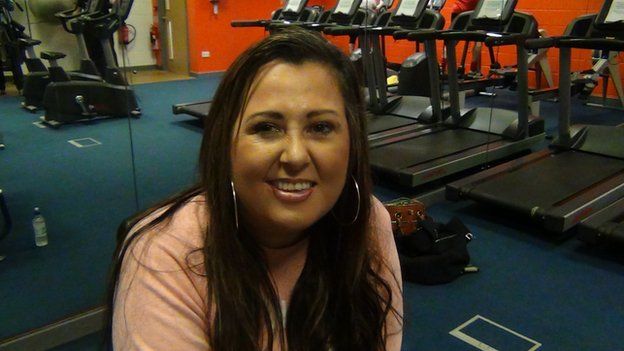
Gemma Price said she has had to learn to live again
“I had a lot of physiotherapy to be there that day,” said Miss Price. “But it was so amazing to be a part of it, no one thought I would be there, so Donna was thrilled I was there.”
Four years on, she is learning to walk again thanks to an innovative new programme which helps stroke victims.
She started the weekly sessions last October and can already walk unaided – something she had given up hope of ever doing again.
“I learnt to walk when I was little, but now I’m starting my life all over again,” said Miss Price. “I have gone from having my life taken away to being able to do things again.”
The Action for Rehabilitation from Neurological Injury (ARNI) programme Miss Price is on was founded by a stroke survivor. It was set up to help people who have suffered a stroke or brain injury gain better control of their actions.
Just three trainers work in Wales, and they work with Celtic Leisure in West Wales. They qualified thanks to Abertawe Bro Morgannwg University Health Board grants.
Miss Price said: “Before I started this programme every day I would wake up not being able to do anything, the physio was not working, and my parents were told I would never be able to walk unaided again.
“I’m proving the doctors wrong. It has given me confidence again. Last year I wouldn’t leave my house at all, I have found it frightening to go out after coming home from hospital.”
‘Daunting’
But Miss Price has to be very careful, because she does not have half of her skull, a fall could be fatal.
“It has been quite daunting because I had trained myself to live in one way – just in the house – and now I’m learning to live again,” said Miss Price. “I am walking around the house with no help but I have got to be careful though as if I fall I could go back to square one again.”
Miss Price was one of the first patients to be accepted onto the pilot ARNI programme which started last year.
She said: “They do a lot of balance work with me, I’ve been on the bikes, used leg weights, worked on my core muscles and they have helped me to try different types of walking styles.
“They work me hard but I love it – it’s my favourite day of the week. They have helped me learn how to get down and get up, which is amazing as I wasn’t able to get up before.
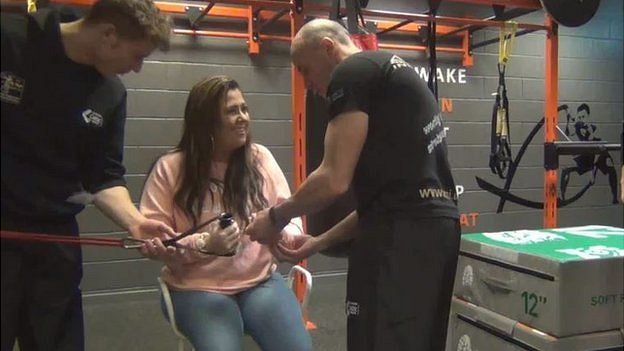
Miss Price does a combination of exercises to help her build her core strength
“My left arm was dead, but now I can move my fingers a bit, which is a massive difference.
“It makes you believe that you can do it, it has been brilliant for me.”
Celtic Leisure’s Sport and Physical Activity Development Manager, Natalie Hawkins, said: “We have worked on functional things with Gemma, the programme is about improving each person’s capability levels to do every day tasks.”
‘Better person’
Miss Price says the rehabilitation has given her hope.
She said: “In May it will be four years since the attack happened. It seems a lot longer though, it seems like it has been forever.
“My family and friends can’t believe how well I’m doing, this rehabilitation has given me my life back again.
“It has been the hardest four years of my life. But it has made me a better person, you see things differently when you go through something like this.”
Elizabeth Ashmore

”stroke survivors this side please”….
Today I was lucky enough to train with Tom Balchin who created ARNI Physio and works with Andrew Marr (recent presenter who’s had a stroke).
Me and mum turned up early, sat on a table, and I spoke to some physio who was going to be training us during the day, (stroke survivors not my mum).
Was a while until others turned up, with their leg swing walks and some in wheelchairs and drooped faces, hands and arms swinging down by their sides, I hated sitting in a room with so many people in my situation, mum could tell I was so nervous so she gave me my bottle of coke to calm down.
This lady started talking to me and my mum, the usual questions, ”What’s your name? have you been here before? Tom’s ever so good”
”What are your limitations?”
I kind of looked at her and thought ”is it not obvious?” But i’m not that rude so I just replied in a scared and nervous voice;
”oh I can’t use my arm or hand, I suffer really bad fatigue and memory problems” She smiled and thank god carried on talking so I could just breathe and concentrate on trying to hide my nerves.
Then they slowly appeared, One at a time, All smiling at our table of ‘stroke survivors’ trying to hide their paralysed arms.
The lady said she was cold so I offered her my coat which she refused, which I was shocked about, cause she then complained she was still cold…
I kept smiling at everyone Tom Balchin came over and shook my hand asking my name and how far i’d travelled to get there.
More stroke survivors arrived, this time in wheelchairs, I was the youngest there which didn’t help my nerves.
Tom then asked us to all stand opposite the Physio’s so he could pair us up, I stood their trying to hide the fact my Clonus (leg getting tired and shaking unable to stop it) was so bad my whole body was shaking. I just held my head up and kept smiling at some Physio opposite me. I got two girls who were so lovely;
Annie and Carol (around my age)
We then sat down to do an assessment where we had to scale things we could & couldn’t do 1-5 ( 5 being extremely difficult).
They asked me loads of questions about me, my stroke, my lifestyle. This is the first time i’ve spoken about it face to face with someone I just sighed and explained;
”Well I had a numb arm a month before my stroke and my face had started drooping I went to a&e but they told me it was a trapped nerve, I then went to sleep feeling really unwell knowing something wasn’t quite right and woke up paralysed down my left side”
The Physio just looked at me and replied ”wow, how old?”
”20 but i’m 21 now :)”
”oh so you’re a year into recovery?!”
”no, only 9 months :)”
Tom came over and read that I was asleep, he looked at me in shock ”blimey! so you couldn’t even be thrombolised?!” (getting rid of the blood clot within 4 hours of having a stroke)
I just looked at him and went ”well shit happens aye, i’m still alive and thats the main thing :)”
”yes Lizzie you’re right, just unfortunate you’re so young” (as if I don’t hear that enough)
We started by walking to the matt, where all the unfortunate stroke survivors walked to (or were pushed to for those in wheelchairs) My first task was to get onto the floor & learn to get up again, I was so scared, i’ve tried so hard teaching myself because NHS Physio’s don’t actually see me anymore. But Annie literally taught me how to do it in 2minutes and after the first go I did it! I smiled so much, I literally looked so queer, She saw how happy I was and said she was proud of me :).
I didn’t want to give up even though I was exhausted so we carried on training for 2 hours ( longest Physio session i’ve ever had) In this time I learnt how to; stretch my arm, Open my hand, squat, place my feet, balance on my left hand, Do leg exercises. Probably the best Physio session i’ve ever had!
After we’d all finished our training, we sat in a line opposite the Physio’s each one of us having to say; who we’d been training with, what we’d learnt and some of us show what we’d learnt.
Okay so this lady who was 75, in a wheelchair and couldn’t speak was with her husband, she’d learnt how to stand up alone, She showed us how she stood up and how to get up & down from the floor.
My heart sank, I literally had tears streaming down my face but tried to hold it in because I didn’t want her thinking I was feeling sorry for her, when all I wanted to do was walk over help her up and hug her so tight all the pain would disapear.
The most inspiring thing to me was a 7year old boy who’d had a stroke at 5. And he was so happy, running around and being so cheery. Such an amazing little boy.
I never knew how much a stroke could actually affect someone until today, The swallowing, speech, confusion, memory problems, walking, Use of limbs, Fatigue Oh god the list goes on…
This broke my heart, two ladies talking about the operation they’d had to removed half their skull, My mum told me in the car that apparently if I hadn’t recovered as well as I did in the first 24hours i’d of been sent to London to have this operation. Like, what the fuck. You never realise how lucky you are until you hear something like that.
My thought for the day is;
to just make the most of what you have, enjoy life and live it to the full, party hard and be healthy oh and get your blood pressure checked to make sure you don’t become a ‘stroke survivor’. It’s hard and will never end no matter how much I recover..
And whatever life throws at you, you can do it, nothing is impossible. You just need to stay as strong as you can.
Jeremy Kingdom
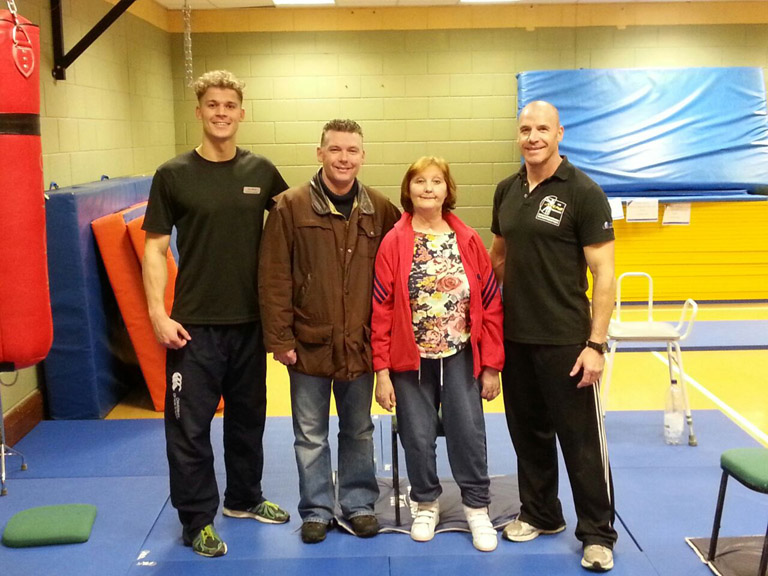
(on behalf of his mother, Mrs Suzanne Kingdom)
My name is Jeremy Kingdom and I am writing feedback for the Arnie project on behalf of my mother Mrs Suzanne Kingdom. My mother suffered a stroke in April 2013 and was admitted to hospital in Cardiff. Since then my mother was then admitted to a neurological – physiotherapy department at Neath/Port Talbot hospital where she spent 6 months recovering from the stroke. Whilst there she had regular physiotherapy and other help from occupational therapists to help her recover. After being discharged from hospital we then had a private physiotherapist come to the house once a week plus a weekly appointment with a NHS physiotherapist.
Whilst these other various therapies were of benefit to my mother’s recovery we have found as a family that the Arnie Programme that she is now involved in is of massive benefit. I have found that although the other therapies are in their own right very beneficial to patients there is a big comparison to the Arnie Project and these other therapies. The Trainers at the project, in particular David Francis are very professional and very knowledgeable in their understanding of the neurological affects and the recovery process of those affected by a stroke. I have found that David has an excellent way of relationship building with patients to make them feel comfortable within the Recovery Relationship and also has an outstanding ability to create confidence and motivation.
I have found that the Trainers at Arnie have a vast knowledge of techniques to aid patients which are of major benefit to the recovery of my mother. In particular, some of the techniques I observe are to teach the patient to be able to get up from the floor if they fall. Other techniques such as grasp and release, walking unaided, concentration skills, balance skills, various training techniques to build up strength and many more techniques. Also the Trainners provide an excellent training programme for my mother that she can follow at home which helps her strengthen her weak side affected by the stroke and also overall strength building exercises.
I have found through my own journey as a family member of a person who suffers a stroke that there are therapies out there that do a lot of good in helping those recovering from a stroke. I have found that although these therapies help those suffering from a stroke they do not compare to what I have experienced in observing my mother recover in the Arnie programme. Since my mother’s stroke I have always looked for all kinds of therapies to help her recover. I sadly say that in the 18 months of my journey helping my mother recover that there was no mention of the Arnie Programme and we stumbled on the Programme by sheer luck
I think that there should most definitely be much more publicity whether on television via a documentary of the programme or within the NHS or Local Health Authority. I can honestly say that the Arnie Programme is the “Therapy of Today” which is the way forward in helping those recover from a stroke. I really hope that my feedback to those who could make a difference in Promoting the Programme is valuable. If there is anything that I can do in further helping the Arnie Programme then please do not hesitate in contacting me.
All the Best in making the Arnie Programme Public and I hope that the Programme would run as part of an NHS scheme alongside the other therapies.
Yours Sincerely,
Jeremy Kingdom.
(Thank you Jeremy – and David Francis and your ARNI trainers in Wales – Tom)
Karin Matthews
My One to One Day at Lingfield with Dr. Tom Balchin
What a warm and positive welcome my husband Tony and I received from Tom and his physiotherapist colleague Daniel. I explained my stroke occurred in March 2011and we were soon going through some important paperwork while Tom watched my physical movements and verbal responses. Tom explained the principals behind the ARNI Approach and the many challenges he personallyhad to overcome after his own stroke to achieve his return to fitness and how these learning curves plus the work of researchers, therapists and trainers over the years to create a continually updated ‘evidence=base’ helped him to devise his strategies to help stroke victims, atwhatever stage of their stroke survival they might be, to reach recovery goals.
Everything we talked about was so very pertinent to what I, and I think so many other stroke victims experience. The plateau we reach after NHS treatment and physio ceases. No one appreciating that with more ‘hands’ on physio/training help so much more can be achieved. This is the gap that ARNI can so successfully fill. It is unbelievable that ARNI does not receive the recognition it deserves through government ‘funding’ channels to enable it to enter the ‘mainstream’ services so vital after a stroke. Tom and I then moved on to video baselines after a sfroke quality of life scale and upper limb function measure with 9 things to do. We did some mat based exercises identifying what areas of physical help I need and identified where my ‘edges of current ability’ are with lots of things. The going was tough but Tom modified everything we did to achieve maximum success and build up my confidence that so much, which I had thought impossible, can be achieved following his example and lead going through the challenge of getting down to and back up from the floor. Such a confidence building exercise as this is a hurdle which removes some of the ‘vulnerability’ experienced by most of us after our strokes. When we are down on the floor, most of us feel like ’turtles turned over on their shells’. Utterly helpless and reliant on others to help us get back up. A horrible, frightening place to be. Mastering this gives us back much more than just the physical ability to get up but removes the emotional feeling that we are helpless. Tom knows this feeling and he knows what a great boost mastering this is in motivating recovery. We did other strengthening exercises designed to overcome leg weakness especially for the back of the legm called ‘prone leg curls’.
We broke for a delicious sandwich lunch continuing our stroke experience conversations. Every experience and hurdle I encountered after my stroke Tom could identify with everything with. His knowledgable responses and suggestions offered such encouragement and positive predictions for future ongoing recovery. Tom then spent time working through oarticular stretches I can do myself for my left upper sided affected limbs to create a plastic template. We did task related training exercises to reduce the spasticity in my fingers using a task training board and also a challenge board, while encouraging stretching of fingers, techniques to relax the hand as it fights to clench, etc. We then proceeded on to picking up and moving different shaped objects correctly, using his specially designed ‘Velcro’ Board, with my affected hand and releasing them again. Screwing up and unscrewing jars and using the prototype Hand/Finger stretching heavy metal device’ also designed by Tom. The ‘unclenching’ techniques assisting these exercises greatly.
I finished this thoroughly positive and Successful Stroke Recovery ‘enlightening’ day with Tom on a personal high looking forward to setting out on the ‘Successful Stroke Recovery Journey’ with Tom and ARNI’S ongoing support.
Three days later I received a very long email with all my exercises and strategies to do, all personalised for me to do by myself and/or with Paul, my new trainer, who Tom was able to match me up with via his referrals manager, Kathy. Kathy sorted all this out and now I’m also coming back for a free training half day in a week’s time, with another 3 or 4 of these free days to come during early 2015.
Thanks Tom at ARNI (and Stroke Solutions which admisters the matches to qualified, accredited and insured ARNI neuro exercise instructors)
Karin Matthews
An email came in two weeks later – we don’t usually place emails up like this, but in this instance, an exception is made – have a read and you’ll understand why..
Hi Tom
Thought you would like to know that, after a fall last night, I managed to get back up on my own using your wonderfully thought through method.
Tony got the chair which I then used as you showed me.
With just a slight adaptation, using a pair of nearby floor weighing scales, which helped me more easily raise myself up on my right side and roll onto my right leg and knee. This worked and put less pressure on my replacement left knee as my right knee took the weight straight away being in the right position you had worked out. Then, it was a case of putting into practice what we had done together and you again showed me at the end. It worked and I and Tony can’t thank you enough for going through that with me on the day we came to Lingfield.
It means a fall can be overcome and you know only too well what a feeling of relief that is.
Working with Paul, your trainer, is working out so well too and I am working my way through your e-mailed exercise plan, alongside what Paul is working with me on, every day building up my strength. I can already feel the benefits
and that, through your and Paul’s help, has motivated me to step out of my comfort zone and work hard every day to maintain recovery progress.
I know you will be pleased to hear this.
All for now, Karin
Steve Aarons
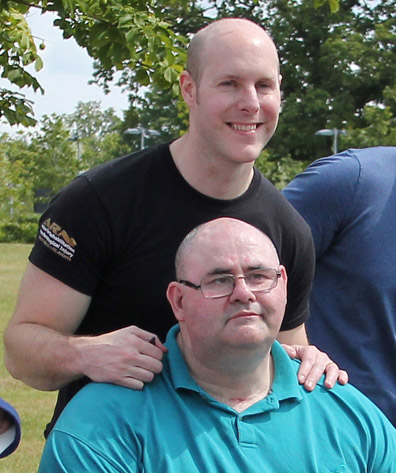
Hi Tom
Well, what can I say, my family and I have just had the most wonderful day with you and your instructors at Lingfield. You made us all feel so very welcome and inclusive.
Steve was a little apprehensive in coming to see you but things certainly changed when we got to you. We noticed that he was relaxed right from the start and we have not seen him work so hard for three years. It was so great to see. It was fantastic to see him trying hard and willing to try anything you said and to be quite honest astounded us with a couple of things. It seems that ARNI is just what Steve needs.
It was lovely to meet you and your instructors, each and every one of you spending your time to talk to us all, listening and caring, you all are quite wonderful people. We thought Steve may be a challenge to you but you didn’t tell us that at all, you just carried on training and teaching him and we thank you so much for that.
Steve has returned home quite positive, very weight conscious and right now getting ready to work on the ‘bar’ in the kitchen with everything you taught him yesterday. I’m popping out shortly to buy the tools you suggested and we’ll be working on sessions with these too.
We were overwhelmed when you invited us to return next week and we would be very happy to do that if the offer is still there. Hope to see you soon.
Kindest regards
David Gill
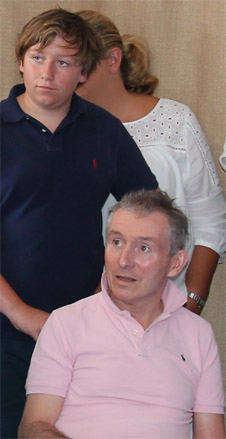
Initial day training Session with Tom at ARNI, followed by one free training day at ARNI Central.
I am a stroke survivor who has just been discharged from hospital. I have just been to 2 A RNI workshops. So I am, as it were, just “on the threshold” of the full ARNI experience. What I would say so far is that I fully support ARNI’s general idea. Clearly, the “medical model”
(what doctors can do for us) is likely only to have limited returns from this point on, so ARNI’s emphasis on the importance of the individual “self-training” to try to overcome residual effects is, in my opinion, going to be “just what the doctor ordered”. I can’t wait to get started with my new trainer!!!
“””””””””””””””””””””””””””””””””””””””””””””””””””””””””””””””””””””””””””””””””””
thanks again for 2 inspirational sessions, and all your dedication and hard work
Sue
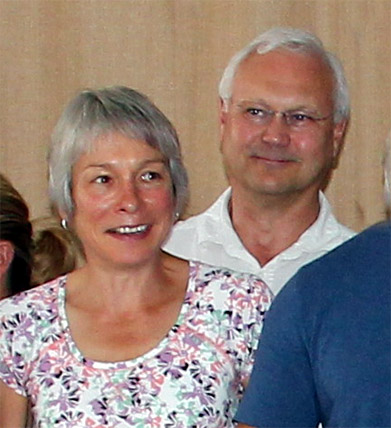
Sue attended the RSM ARNI Stroke Technologies Conference 2014 and had just been discharged by the community team a few weeks before. She was marched with an ARNI INSTRUCTOR (an occupational therapist) and she also came to free training day at ARNI – ENTRY ONLY TO PATIENTS WHO HAVE ATTENDED ONE TO ONE ALL-DAY TRAINING SESSIONS WITH DR TOM AND TEAM AT ARNI LINGFIELD.
Wednesday was amazing and I seem to be even more motivated since !!!!!!!….if that is possible : )
Trainers and stroke survivors meeting up and sharing experiences.
Learning from others how to overcome and deal with different issues you have as a result of a stroke.
Survivors did a range of exercises watched over by their allocated trainer for the session. Tom circulated and spent a few minutes with everyone and gave us advice on exercises to add to our programmes, highlighting the areas, obvious to the experienced eye, that need to be concentrated on.
Everyone had a common desire to improve. It was a very happy and uplifting day which left me eager to get on with it.
Good to meet you again an get another dose of your very infectious enthusiasm and encouragement to raise the bar and put in the effort to achieve their goals.
Cheers
Sue
Mat Head
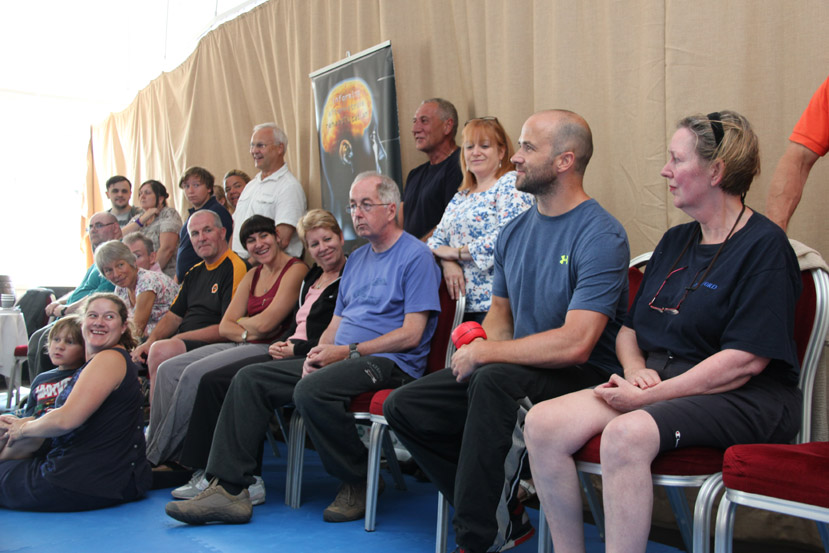
Initial training Session with Tom at ARNI, followed by 3 free training days at ARNI Central spaced out during 2014 (example, below). Mat has also taught on the ARNI FRETS Course and attended at the RSM ARNI Stroke Technologies Conference. He is a total star.
Mat 35 from Brighton.
After suffering my stroke during a craniotomy in January 2013 I woke to complete paralysis of my left side. 2 months later I was discharged from hospital still restricted to a wheelchair although able to walk very short distances with the quad stick and climb small flights of steps using the hand rail. Having been a personal trainer / strength & conditioning coach since 2001 my rehabilitation has been massively helped by my previous physical condition, motivation and extensive knowledge of training methods, exercises and progression.
I have now completed 2 days with Dr Tom and his ARNI instructors. Each time I have found myself challenged physically as they really know the boundries of stroke rehabilitation and so are uniquely able to explore every individual’s limitations and needs.
I have left both sessions full of enthusiasm and with many new ideas, techniques and progressions to play with and further my recovery..
Thanks Tom, bring on the next day!!
Stephen

(from Sharon)
My husband, Stephen, had a stroke in January 2011 when he was 50. It resulted in Right sided weakness, whilst he has good gross movement and strength in his right arm, fine movements remain a challenge; in addition he has significant foot drop and weakness in his right leg and currently walks with a stick. Stephen is also aphasic. As with any stroke survivor that day in January changed his life in so many ways.
We spent a day with Tom, the best thing we could possibly have done. Tom is an incredibly motivating individual and where he is a stroke survivor Stephen was able to fully relate to him; he got so much out of the day. Not only did he open up about how the stroke made him feel, the techniques he was shown allowed him to feel more positive about his ongoing recovery and future. He came away from the day buzzing and looking forward to continuing the exercises at home. We are so grateful that we found ARNI and Stephen would strongly recommend it to fellow stroke survivors. As the wife of a stroke survivor I would like to say thank you to Tom for giving Stephen hope for his future! I also recommend his book and manual Successful Stroke Survivor highly to anyone who has had a stroke.
My husband and I have set up a group for stroke survivors of working age, we have recently held a fund raising event to raise money to sponsor two people to attend ARNI Instructors training and also to fund members who have not been able to fund and benefit from one to one sessions with Tom.
Alex Roantree

My husband and I recently took our son Alex to see Dr Tom and his team. Alex had a stroke in december 2011 which left him with right sided hemiplegia.
He has been having regular physio and OT, he walks with a limp but is pretty stable, we are having problems with his hand. He can use his arm quite well but he has no fine motor function in his handand is prone to clawing.
OT have told us that this is as good as his hand will get, my husband and i are not going to accept that.
I already had Dr Tom’s Sucecssful Stroke Survivour book and followed ARNI on facebook. I received an email inviting us to a massed training session so i contacted ARNI to book a place for Alex.
After speaking to Dr Tom we arranged to meet and we were lucky to get a one to one session, it was the best thing we have done.
After our first session Alex and ourselves left feeling so positive. We had a fantastic day, we were all shown exercise’s and a ” magic trick” as Alex like’s to call it to relax and work with his hand. We hadn’t seen Alex use his hand that much since his stroke but he was happy to use his hand with Dr Tom, and he used it alot that day and has done since.
We have just had our second session which was free, with five other Instructors there too and we are already seeing improvement in Alex’s hand movement, he is more positive and willing to use it. He has also just ridden his bike for the first time post stroke.
My advice to any stroke survivour and family is go to one of the session’s it will change your life.
We are so grateful to Dr Tom and his wonderful team and we look foward to our journey through Alex’s rehabilitation with them.
Trevor Router
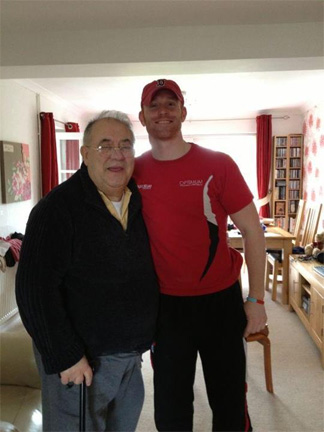
Testimonial from Valerie – Wife of Trevor Router
In October 2011 Trevor was diagnosed with a brain tumour (acoustic neuroma). Many months went by and Trevor had lost his ability to walk, relied on a stair lift and any enthusiasm to enjoy life had gone. All Trevor did was sit in a chair and watch TV. He had no interest in even answering the phone or using his computer. Prior to him suffering from the brain tumour he loved to play the tuba, but due to the deterioration in his breathing he was also unable to play.
In November 2012 I contacted a friend who worked at the Stroke Association who recommended ARNI and this led to me contacting Scotty. On the 23rd November 2012 Scott came and started with Trevor and began a programme of 2-3 sessions per week.
The change in Trevor by Christmas was greater than we could have ever imagined. Trevor was walking around the home with his frame, and his co-ordination was noticeably improving despite the tumour not reducing in size.
In late January things really started to come together. Scotty got a reluctant Trevor walking outside with his frame and within the house unaided. Trevor is also now able to get up and down the stairs independently without his stair lift. Trevor is now capable of getting up and down from the floor by himself that has allowed Scotty to add floor exercises to sessions.
Trevor’s interaction and conversations with Scotty has lead to him once again wanting to answer the phone and he wants to see his friends. Trevor is simply a different person from last year and it all thanks to Scotty’s hard work and professional advice. Last week (now in February 2013) thanks to Scotty’s persistent encouragement he turned on the computer again, wet shaved, helped with cooking and washed up.Scotty has made an enormous difference to Trevor’s life. A difference noticed by our family, friends and at our must recent checks up at the GP surgery. Trevor’s GP has asked us to send a well-done message to Scotty as he too is overwhelmed by the improvements.
Tony Ledger
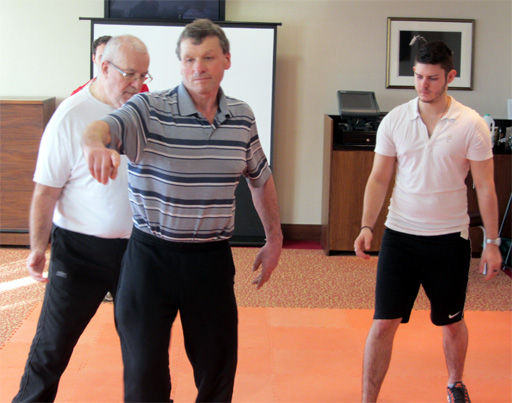
Hi Tom,
I have been to see my brother Tony today who spent the day with you and your team on Thursday. I cannot begin to thank you enough for the difference you have made to both him and his wife Lisa. I spoke to him on Thursday evening and he sounded so upbeat and said he had had a brilliant day. He said he had done loads of things and he loved every minute of it. I told him it was not my idea of a great day out.
On a serious note he told me he had got so much from the day and how much confidence it had given him. I think he surprised himself and your team with what he could do and again this was a massive boost for him. Lisa said she was so glad she could go with him as she was able to see just how much Tony can already do but also what it is safe for him to do moving forward. I am sure you understand she has been very worried about him overdoing it and causing more problems, but she now feels very confident in his ability.
I had a really long chat with him today and he told me all about the day. It certainly sounded very comprehensive and very challenging. Tony had so many positive things to say about you, the team and what the day had meant to him but two things stood our for me. He said it was nice to be treated as a “normal” person again and the other thing was he was only looking to the future and the past has gone. I have always loved and admired my brother but his strength of character so far on this long journey ahead has amazed me.
I know that he was inspired by you and spending time with somebody who has a real understanding of the challenges he faces but has overcome them and gone on to do so much with there life like you really gave him hope for the future. I am so grateful that you were able to see him so quickly as yesterday he had his first visit from the physiotherapist. He was utterly disgusted as she was there about half an hour asked him some questions, made him stand on one leg looked at the sheet the hospital had given him and left. No offer of a “training” program or joining a group. Once again thanks to you he has clear guidance on what he needs to do now to help himself. We said today imagine if he had not had your manual and spent the day with you what chance of a recovery would he have had? He has waited two and a half weeks for a supposed urgent referral and this is what got, absolutely nothing.
Tony said he is coming back to see you in April and said that there is no charge, if there is please tell me as I don’t want him to pay. He also said he will do a testimonial for the website so I will sort this out for him when he decides what he wants to say.
I feel so thankful that I found your website and sincerely appreciate what you have done for him. I will share this information whenever I get a chance to do so as everybody deserves the best possible chance to recover and I genuinely believe your organisation can offer that.
Best wishes, Lorna
From Tony:
Tony 57
Having very recently suffered a stroke that left me with right sided weakness I was left completely unsupported by the NHS. By chance we found the ARNI Institute on the internet and I am very glad we did.
Last week I spent a day with Tom and his trainers. They worked me really hard throughout the day, gave me lots of very useful tips and information and I came away with a program of exercises and feeling much more confident about my future. My wife came with me and she said that she was surprised at what I was able to do and how much reassurance it had given her in terms of what I should be doing moving forward.
It was a really good day and I found it very valuable. I would recommend this day to anybody else that has had a stroke.
Liam Waters

This following message is from Liam’s dad:
Hi.I am writing this testimonial on behalf of my son Liam.
In July 2011 he had a massive stroke which was a result of severe heart condition. This left him paralysed on his left side. During his time in critical care he underwent very limited rehab due to being on a heart machine. Therefore for approx 5 months he could not exercise and lostsome crucial time straight after stroke.
After leaving hospital he had a course of physiotherapy from our local authority,which was very good and got his walking stronger and his left arm moving.
But as with lots of stroke survivors his left hand had no movement.
After 12 weeks the physio was stopped and we were left to find our own alternatives.
With Liam being only 18 when he had a stroke we felt he needed to find younger stroke survivors for him to be able to relate better. When a friend told us about ARNI we got in touch and made an appointment. We weren’t quite sure what to expect but were open minded.
We went to meet up with Tom in Lingfield and after intro’s Liam was shown a whole range of exercises and techniques to improve arm ,leg and hand function.
The day went very well and Liam came away tired but much more optomistic.
Before that day Liam had been very depressed and felt he would never be able to use his hand again.After meeting Tom and seeing what he had achieved
Liam is much more positive and now has the belief he can do the same if he uses the ARNI methods.We have been back again and had another great day.
The follow up was very good and Tom’s always on hand with advise if needed.
As Liam’s parents it was a great relief to us to know that with some hard work he can live a relatively normal life.
Andrew Irwin
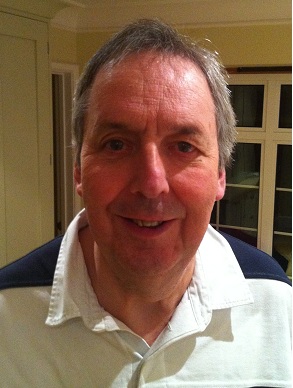
I was introduced to Tom Balchin by a mutual friend who had heard that I was becoming frustrated because I was experiencing problems following my discharge from hospital after having a stroke in Jan 2011 and was not getting much help from the medical professionals .
Their response was that these things happen after the type of stroke you have had which affected the deeper ganglia in the brain and you have to learn to live with it.
Well those of you who have met Tom will know that he believes that there is a lot more that can be done after discharge that will regain you action control, balance, gait, strength.. the kinds of things that I was lacking.
He immediately started me on a series of exercises, and having worked in the Health Service myself I hold fairly traditional views about treatment so you wont be surprised that I was feeling slightly sceptical when I found myself “flowing around the room” like a trainee modern dancer only to follow this with a poor imitation of a samurai warrior with a shortened broomhandle.
As we discussed what I was doing it became obvious to me that it was not only the movement that was important but also the coordination throughout the body, which is so important in maintaining one’s stability.
THE other important feature was that he focussed on what I could do and not what i couldn’t do thereby giving me a much more positive attitude to my situation.
It was certainly the positive attitude and confidence which he instilled in me that has enabled me to continue the significant improvement in my recovery which started at our first session when having hobbled in using my stick I ended the day carrying heavy boxes across a rough drive and up steps totally unaided.
I was shattered when I got home but I really amazed my wife by getting out of the car without stick or help and walked into the house up a steep step without stick or help. I’m not going to use the stick or plastic orthotic again.
I would certainly strongly recommend the ARNI programme to anyone recovering from a neurological injury
Becki
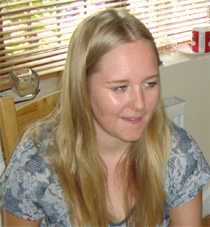
So lovely to meet you the other week, you are so inspirational its unreal and really gave me the motivation I no longer feel from my community rehab. You will be pleased to know I am no longer getting an electric wheelchair and fully regret letting my occupational therapist talk me into it and am instead applying for funding for a saeboflex to help with my hand, which i think will be a much more positive investment.
I have been keeping my splint off in the house (i still feel quite vulnerable leaving the house without my splint & walking frame but i’m hoping to try this soon!) and have found that I have a tiny bit of movement in my ankle now! My tone is much lower in my arm thanks to your strengthening exercises and stretches and I find the exercises you showed me much more exciting than the ones I had previously! I have also been walking much further than before (i can get to the beach from my house and further!!) so I just wanted to say thank you for giving my attitude an extra push. Your book is absolutely addictive and I have learnt so much from it.
I have written you something to put on your website to help others see what’s going on at ARNI: if its too long feel free to delete wherever you feel appropriate.
I was shown the Arni website by a member of Different Strokes when I was going through a tough time with my community rehab team and was worried their treatment was no longer suitable for me. Things with my community team picked up but the closer the discharge date came the more I wanted to look into seeing a trainer from the trust. My parents organised for me to attend a day training with Tom, I was very nervous to start with, having seen the website I knew he aspired to get people out of their wheelchairs and onto their feet.
My Stroke was only at the end of Feb and at the age of 21, I was already more than happy to be out of my wheelchair, I knew my walking frame and walking stick was a no-go for seeing Tom which I felt confident about, though I still foolishly took my stick and was asked not to use it petty much straight away, again something I was fine with but what I was worried about was being asked to walk without my leg splint. Although it was something I was desperate to get rid of it was truly embedded in my comfort zone, mostly down to the fact that I was told I wouldn’t be without the splint until at the earliest January 2012.
Arriving at the ARNI trust I walked from the car to the door using my stick and wearing my splint, getting through the door Tom asked me to not use my stick which I happily did. It has been clear for a while that I don’t need it often walking across the room and realising I’ve forgotten something.
The first part of the day we talked about my experience, assessing what abilities I had and discussing how important it is to be positive. Tom also kindly shared his experiences with me, making me feel very comfortable and motivated to try anything he threw at me. Beginning the physical training still wearing my splint we began exercises. having a break Tom asked if I would like to take my splint off, nervous I knew he wouldn’t ask me to do anything he didn’t think I could do so I removed my splint already knowing I could stand without it. He then asked me to walk around a square mat, i slowly made my way around it surprised that I didn’t fall flat on my face.
I then continued for the rest of the afternoon without it, being shown how to get on and off the floor, walk and turn, move out of peoples way if they were walking into me without realising I couldn’t move out of the way well, balancing on each leg and even kicking out to the side. I also learned how to do warming up and about cardio. These exercises kept me much more entertained than the ones I have been doing since leaving hospital as they felt more like a work out and the best thing was I wasn’t wearing my splint. Throughout the day Tom introduced me to different approaches to therapy, different equipment, a new confidence, and offered me to buy a copy of his unpublished book “the successful stroke survivor” which of course I did.
I left the building with my mum carrying my splint and my Dad carrying my walking stick and my god did it feel AMAZING! I now no longer use my splint or walking stick around the house and begrudgingly put it back on when I walk outside because I haven’t quite plucked up the courage to walk outside without it or my walking frame something that thanks to ARNI’s positive attitude I know won’t be far away.
As for the book I am about a quarter of the way through it making notes as I go. I feel like I’m studying and I guess in a way I am, It has helped me to understand how stroke recovery works and why different therapies help with it. It keeps me motivated even after the shortest skim over the parts I have highlighted and helps me understand why ARNI’s approach is so special, teaching you to train and strengthen your whole body not just the side affected by stroke. It also helps diminish many of the worries I had about the way I am recovering learning that ‘compensatoriy stratergies’ dont have to be a negative thing and can be worked with to increase strength in muscles. I also learnt that despite what I had been told, hard work doesn’t mean increased muscle tone, and even after my full day with ARNI, spending hours exercising out of my splint my usually high tone was relatively relaxed.
I would definitely recommend the book and ARNI way of thinking to any stroke survivor no matter what stage of recovery you might be at. I’m sure you will find something useful from it that I have not yet found anywhere else, be it that extra push to get you out of your wheelchair, the confidence to push yourself as far as you can go or the information about equipment you never knew existed. If it wasn’t for visiting ARNI there’s no doubt that I would still be putting my splint on every time I wanted to walk across a room.
Becki has an excellent blog which can be accessed here.
Roger Clynes

I was 81 when I had a stroke, following an episode of atrial fibrillation. I had been fit and active until then although somewhat hindered by having weak ankles and knees from having been hit by a speeding car twenty years before. Paralysed on the left side, I was taken to one of the specialist acute stroke units in greater London, where I was given a clot-busting injection, which led to some slight movement of my affected arm after a few hours. To cap it all, I developed pneumonia the next day.
After excellent care there, I was moved to the stroke unit in the hospital in our borough so that I would be eligible for local social services etc on release. The doctor who met me said that their medical staff’s main role was to assist the work of the therapists in the unit. Once the pneumonia began to be under control the physiotherapist got me onto my wobbly legs – at first walking a little with a frame and after a while a stick – and pressed me to begin to move and use my left arm a little through the pain. I was also made to begin to wash and shower myself as best I could. Although I had not lost my speech, it had been affected by the stroke and, more importantly, swallowing had been impaired (perhaps the cause of the pneumonia?). This gradually improved through following the rigorous exercises of the speech therapist and meant I could after a while eat normal food instead of only puréed or, later, mashed.
Before my discharge, four weeks after the stroke, an occupational therapist came with me to my home to advise on and arrange for the provision of special chairs, and support rails in the shower and along the steep staircase. The hospital also arranged for regular visits from a community matron, who liaised with my GP over my general health and improvement as well as a physiotherapist who gave exercises and encouraged me to gradually walk further and, after a while, to stop using a stick indoors; I still used one outside as the footpaths are so uneven. It was she who put my name forward to join a group that were to have twelve weekly sessions with Tom Balchin and his colleagues as part of a research project set up by Brunel University. I went along to the first not knowing exactly what to expect, but keen to try anything that might help me improve my limited recovery.
Two things impressed me at once. First, the diversity of those in the group: in age range, range of disability (e.g. one person could hardly walk and another had difficulty speaking) and as to when they had suffered their stroke – varying from a few months to several years ago. Second, Tom’s enthusiasm and directness in pushing us further than we thought we could go in gaining strength and increased mobility through the exercises he had evolved during his own recuperation from a major stroke. This positive approach and seeing what the other people were achieving were great incentives to continue his exercises at home between classes. I would come home from the first classes exhausted, but healthily so. But I had to find the balance between “pushing through the pain” and not doing too much.
By then 82, I could not pretend to work in the way of a twenty or thirty year old and my earlier accident caused by a car restricted me to some extent in what I could do, as did the onset of a hernia at the time of the later sessions. Nevertheless, my family and friends all commented on how my mobility, confidence and general strength all improved class by class. There have been minor milestones since: the first time on a train, on an escalator, driving the car. I owe so much of this improvement to Tom and his ARNI approach and, not least, the manual he wrote (‘The Successful Stroke Survivor’), the clear drawings and descriptions of which remind me of the exercises and procedures he offered. I hope to be able to follow up with more such work.
Thank you ARNI.
Anthony
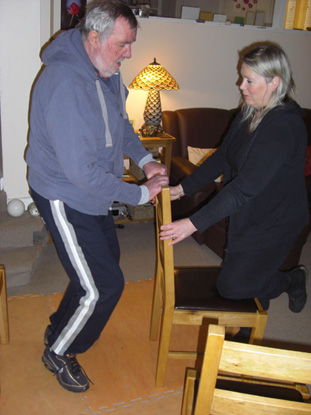
(from Abi)
Tony was 54 years old when he had his stroke 18 months ago which left him unable to use his right arm and leg and also his speech was badly affected. He was living alone at the time and we still don’t know how long he had been lying there on the floor before I found him – it could have been 3 days. Since his release from hospital Tony has been living with me and although his speech greatly improved, his mobility hadn’t which left him extremely depressed and feeling that life was not worth living.
We recently learnt about the ARNI Trust through one of the mental welfare team who was supporting Tony through a very low time and had found out about Dr Tom Balchin and his work via the internet.
We immediately made arrangements to see Dr Tom and spend 2 days with him going through various techniques of training and came away totally inspired. Tony now feels totally uplifted and extremely positive that he can now make improvements to his mobility with practicing the techniques shown to him by Dr Tom and following a proper routine of exercise.
Now we are home, Tony has started his ARNI training this week with determination and enthusiasm – we have set specific times and days to go through the regime of tasks in his training diary – I have improvised using a ‘Wii Fit’ board instead of the step for the Cardio exercise – it’s much shallower than a step and he still found it very difficult, but it’s a start! The new ankle brace fits very snugly – it was hard to get on at first, but getting easier and he wears it at the moment just for exercise – he does feel that it supports his ankle and his foot doesn’t seem to be dropping.
I have also set up a laptop with the CD with example videod strategies on for him to access – this is great because now he has found a reason to learn how to use a computer! (it’s another start!) I was so pleased to come home from work to not only find that he had followed your hand stretches, but also to find the Neurogripper on the table! Early days but a promising start!
Thanks also for the link re Aphasia – will certainly look into it . Tony’s speech is the one very noticeable improvement since his stroke – maybe ‘forced’ by necessity whereas the mobility hasn’t – yet. As discussed, we are going to access your Hove ARNI trainer for Tony with the view to regular, probably weekly training.
Jill
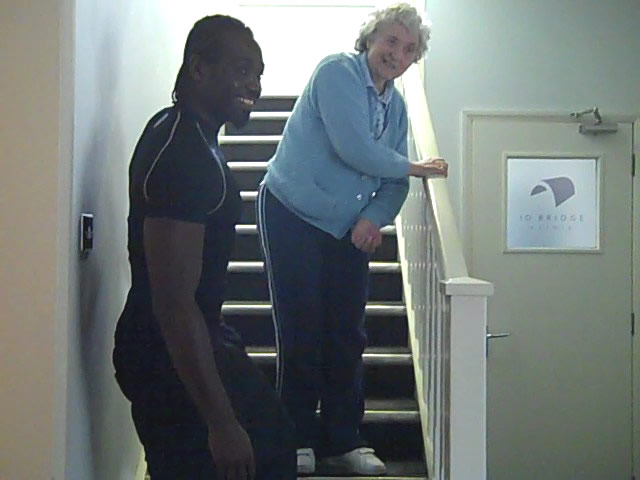
From Jill- about my Mum, Peggy.
Here is my testimonial!
My mum, aged 70, had a major stroke due to atrial fibrillation at the end of June 2009. She was in hospital for six weeks, during which time she was lucky to receive half an hour of physiotherapy three times a week. As she believed she was going to make a spontaneous recovery she didn’t see any problem with that. In fact on more than one occasion she felt she was too tired to attend and the staff didn’t push her.
She came home in a wheelchair with no perceptible movement in her left leg or arm. The physiotherapists led us to believe that she would never walk again, and she couldn’t even stand without aid. She started having out-patient physiotherapy twice a week concentrated purely on her walking, and at around this time her leg seemed to suddenly regain some movement.
Her walking, however, improved very slowly and I scoured the Net seeking ways to help her and also to work on her arm, as regaining its use is very important to her for her craft hobbies. At some time during that search I found ARNI and some other websites that talked about lots of work to regain movement.
My sister and I began ‘forcing’ our mum to practice walking every day. Her physiotherapist noticed an improvement straight away from this daily walking, and we increased the time and distance.
We also worked on her hand and arm as much as we could but at that stage she found it very painful. Eventually she was able to walk through the house using a quad stick but her balance was still wobbly and she was anxious about walking when on her own. I realized that we seemed to have reached a plateau and that although she could walk slowly with the quad stick she was still nowhere near achieving much independence. I contacted Tom Balchin of ARNI who recommended us to Terry Samuels in Chester.
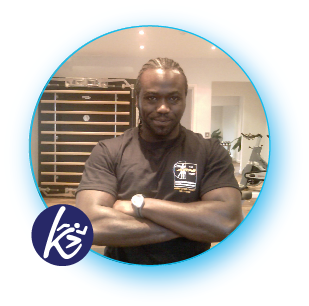 The first time we went to see Terry (in July 2010) we took Mum in in her wheelchair, and he started to assess her on the ground floor. Within a few minutes he had her taking a few steps unaided for the first time! I told him she had managed the stairs at home with our help so he got her going up the stairs which she did slowly but successfully.
The first time we went to see Terry (in July 2010) we took Mum in in her wheelchair, and he started to assess her on the ground floor. Within a few minutes he had her taking a few steps unaided for the first time! I told him she had managed the stairs at home with our help so he got her going up the stairs which she did slowly but successfully.
Coming back down was more of a problem, as there is only a banister on the left hand side. She tried it alternately backwards and on her backside and it seemed to take half an hour but eventually she made it. Terry made Mum walk to the car, so she had gone in in the wheelchair and come out walking.
Terry gave Mum lots of exercises to do and told her to walk as much as possible at home and leave the wheelchair. On one of our subsequent trips he encouraged her to use a wooden stick instead of a quad stick. Now she’s walking unaided daily and her balance has continued to improve. In addition, Terry has been working on her hand and arm and she has increased her grip strength and finger movement and she can now lift her arm outwards far more.
She now walks around the house at will, albeit still with a stick unless we are present, can bend down to pick things up, can walk downstairs frontwards, can get up off the floor and is a lot more cheerful and motivated. A couple of weeks ago she walked around a supermarket pushing a trolley for the first time – something it seemed she would never be able to do again this time last year.
Jill
Nick Cole
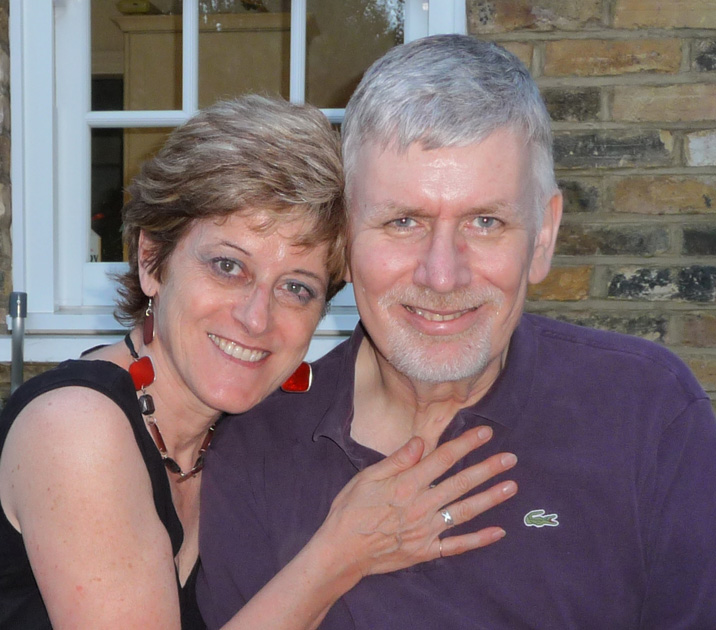
The following are a few excerpts from a personal blog by Professor Letizia Foroni (Imperial College, London).
April 1st 2010
Today, Nick was discharged from hospital.What the future has in reserve for us, I don’t know, but we must try and enjoy the day (though still full of anxieties for the future). …BUT to keep him on his toes, we have booked already a two days residential rehabilitation training course with an instructor from ARNI (Action for Rehabilitation from Neurological Injuriy) on April 22-23rd where he will have a 1 to 1 training for 5-6 hrs per day to practise how to improve his mobility, walking, transfer etc. We have been promised by ARNI that Nick may walk without a stick in the future. I just want him to walk, no matter if he is going to use 1 or 2 sticks.!
April 23rd, 2010
Miracles happen! Nick walked with no stick for the past 2 days!
Tom, his trainer, took away the stick from his hand 3 minutes after we arrived yesterday morning at 11 am and Nick was not allowed to use it for nearly 95% of the time we spent with him. He made him walk across a gravel entrance and go down three steps when we arrived. This was the easy part of the day! He made Nick get up from a normal chair about 60 times or until Nick could master the procedure without almost thinking about it today! We were both absolutely physically and mentally exhausted last night but we left the place today at 5 pm so exhilarated by the experience that I am still floating in mid air tonight! Nick has not used the stick since we arrived home at 7pm tonight and although he tends to lean on furniture and bookcases etc when walking around, 50% of the time he is trying to walk with no support at all. We found someone who believed that Nick could do it… and Nick did it!
After Dianne (our Mrs Bean!), Tom Balchin (the founder of ARNI, Action for the Rehabilitation from Neurological Injury) is the second angel sent to us to help with Nick’s recovery. He said to Nick: “Nick you will be walking in 1 year or less”! And Nick was smiling as I have not seen him smiling for months! I think he felt inspired by finding someone that believes in his ability and empowered him to control his future. You need to know that Tom at the age of 21 in 1997 suffered a stroke due to an aneurism on his right side of the brain. He had surgery and has an L shape scar on his head to prove it; he was left paralysed on the L side and despite this he has recovered almost 99% of his moto-neuro-activity on his left side. Because of this, Nick and he were comparing notes about the use of Sodium valproate to control seizures, how best to control the lack of function of the right foot (for Nick) or left foot (for Tom) and many other common problems and deficits. The common problems, seeing that Tom made it, the way Tom was understanding Nick’s problems made it so much easier for Nick to find the required motivation and keep trying harder and harder.
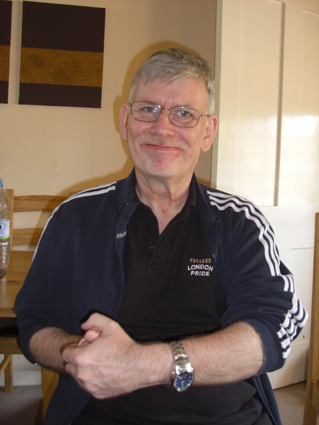 So, for once the results were better than the expectations! Tom had prepared a much easier day and challengingonly for Nick’s upper body. Again, I witnessed Nick moving the right arm as he had not done in the previous 10 months. Yes, by the way, April 20th was our 10th anniversary. But Tom said yesterday:” Nick you are a ‘young stroke sufferer’ and you has really great chances to achieve a lot. But this is a life commitment, and as long as you make it fun, you will enjoy!’ My contribution was “Nick this is like skiing, the better you get the easier it will become! So let’s get the skis on and face the mountain, it is sunny and the sky is blue! And as with real skiing I will be coming down with you all the way!” Funny, for the first time in 10 months I think of facing the mountain going down rather than going up!!
So, for once the results were better than the expectations! Tom had prepared a much easier day and challengingonly for Nick’s upper body. Again, I witnessed Nick moving the right arm as he had not done in the previous 10 months. Yes, by the way, April 20th was our 10th anniversary. But Tom said yesterday:” Nick you are a ‘young stroke sufferer’ and you has really great chances to achieve a lot. But this is a life commitment, and as long as you make it fun, you will enjoy!’ My contribution was “Nick this is like skiing, the better you get the easier it will become! So let’s get the skis on and face the mountain, it is sunny and the sky is blue! And as with real skiing I will be coming down with you all the way!” Funny, for the first time in 10 months I think of facing the mountain going down rather than going up!!
April 24th 2010
MANY thanks for spending the last two days with us! We are over the moon with what Nick has achieved and really inspired by the fact that we have found a person that believes that Nick CAN MAKE IT! This is what we neded. At present Nick has not used the stick at all since we arrived home tonight at 7pm! and he has been going to and from the bedroom already three times. He only used the stick to walk from the car to the front door because the 2 hrs driving (M25 was the usual chaos!) had left him with a lot of disconfort on the R leg having to keep it in one position for a long time. So, I am determined to continue the hard work going…..thanks for showing the way and believing Nick could do it, it was what we both needed.
April 25th 2010
just to tell you that Nick has not used the stick (only once) since coming home and the wheelchair has been relegated to the conservatory. We are now sitting on an office chair intead like the one you have. He also is enjoying the ankle support we got from you which is not that difficult to put on (not more than the stockings for DVT anyway) and Nick feels more ‘normal’ with that.
I wrote to Peter asking to establish a contact to discuss plans,
May 8th 2010
his personal trainer (Peter) was starting to work with him. Peter arrived in the afternoon and has started setting up a number of exercises to do with Nick that will aim at him regaining balance and mobility. He is coming twice a week and has already sent a schedule to follow daily with him in bed and off the bed.
May 15th 2010
Peter and Nick are really doing well and Peter has struck a good balance between challenges and making Nick feel safe. Yesterday Nick walked 10 steps up and down the stairs and then walked outside the house to the corner of our street, not probably more than 40-50 metres but a progress, I followed with the wheelchair in case Nick felt tired but we didn’t need it at all. Peter is also not as soft as one thinks, and Nick has little margin for diverging, if he does not follow instructions Peter threatens Nick with taking him back … and do 10 more steps! but he is also very encouraging and keeps telling Nick how good are his chances to do well.
May 23rd 2010
We visited the Northwick Park hospital last Tuesday and everyone was so happy to see Nick and for him to look so well, as well. He showed them how he can now walk with a single stick and how the ankle-support is so much easier to wear and allows him to wear normal shoes and feel more ‘human and normal’. Nick has continues to climb the stairs with both Dianne and Peter. Does not yet feel confident enough to do that with me, but I am not taking that personally. On Friday we set up the Wii platform and Nick stepped onto it and managed to control his position and balance without holding onto his stick and that was great! Every time Peter comes he steps up the target and Nick is very … tired at the end of it, but also VERY pleased with himself. When I am here, I video him and then we can watch the video which is helpful for him.
June 7th, 2010
Just few words as an update of our last 7 days. Pretty quiet last week and in fact I was getting worried that we may have been approaching a plateau. Of course I was wrong, again. Nick has achieved another first in three new targets in the past week. He walked even further than ever before from the sitting room to Grange rd which is approximately 100 mt away from our house and which is really almost 1/2 way to the pub now! This happened last Friday in a 290C temperature and Nick thought it was really a challenge.
June 14th 2010
Nick’s right side is still a major problem and his leg in particular. It seems to have improved somehow but very slowly but it remains a major limitation to his indipendence and ability to move freely. I feel we should push the exercises as much as possible but at the same time I feel I don’t want to alienate him from what should be pleasant experience. It is difficult to strike the balance.
July 2nd 2010
In the past two weeks Nick has continued to cheer me up with how different his right side of the body is feeling. It is becoming /feeling more and more as part of his body and a new sensation is that he is now feeling its weight. He describes it like when following an injection for a dental extraction, your side of the face is returning to ‘life’! His entire right side is going through a similar experience. This continues to amuse him and provides a nice and cheerful topic of discussion while we walk around the house or having dinner. I have filmed him the other day describing these feelings and also trying to push his wheel chair using the right hand. This also proves that his shoulder is getting better and acquiring a wider range of movements. He has also now being ‘upstairs’ in our house at least 5 times and he remains dismayed by how chaotic the study looks. ‘One more reason for you to come and help me to clear it up’…is my comment.
July 20th 2010
Hi,
Just a brief update: no major news but ‘no news, good news’. Nick’s strength in terms of muscle power is no doubt increasing albeit very slowly. Nick is also becoming more adventurous. Last week he decided to go upstairs in our house to check if the windows were closed. This was while he was at home alone for 30 min between Dianne leaving and me coming home. He was quite adamant that he needed to make sure that the windows were closed! This has always been one of his concerns before his stroke and I am pleased to see that it still is!!!
We have a new assessment with his PI trainer, Tom Balchin from ARNI on August 4th and both Nick and I are anxious but excited about this. It changed Nick’s approach to his recovery and no doubt it will be a new boost of energy and inspiration!
August 4th 2010
Hi,
today we met with Tom from ARNI, who has been leading Nick’s recovery through a new rehabilitation programme in conjunction with Peter, Nick’s trainer (who in turns is trained by Tom).
Tom was impressed by the progress Nick has made in the past 3 months, mainly the improvement of Nick’s speech and his ability to perform tasks with his right hand. Some of these activities could not even be evaluated at our last visit (on April 22nd) because Nick could NOT carry them out and therefore there was no score. Today Nick scored top for each of them.
Unfortunately Nick’s right foot decided to ‘go on strike’ and refused to hold on a position that could allow Nick to walk. This is a very rare situation which occasionally happened before when Nick is particularly tired or ‘worried and emotional’. It is the ‘weakest link’ in his body and responds with a ‘mind of its own’ when under pressure. Neither Tom nor I were particularly worried. To confirm our feelings, Nick was walking with no stick and with a perfectly positioned foot tonight when we came home! A bit annoying, but such is life! Otherwise, the day went well and we are both looking forwards to a good night sleep as we are both tired (Nick physically and me emotionally).
August 5th 2010
Hi Letizia
Can I insert a note into the next bulletin to say how impressed I am at Nick’s progress? If this will alter the nature of the blog, just keep it to yourself as a note from me;)
When you both came to see me in April, Nick basically did not speak. Today, it was hard to hold him back… and I realised that it was like meeting a new person..as we were conversing without prompts from Letizia. His drop-foot was an anomoly, so I’m not worried about regression- Peter and I had a long talk tonight about the training and I’m happy things are going very well.we also talked about new strategies for encouraging fine motor movements in the fingers and increasing the ability of grasp/release. One of my other trainee instructors was also at training, and he gave Nick a very useful weighted squeezy ball – and Nick almost immediately did better with his reach, passing the ball round his lower and upper back without dropping it. Fantastic work and you should both be really proud of yourselves. Next time, it’s no stick, or you’ll ‘get some stick’ from me! Only kidding!! I would also like to say that Letizia makes the very best pasta… and I’m very grateful to her for taking over lunch-making duties from me, as my abilities do NOT extend into the kitchen!
All the best,
Tom
Matt

ARNI training – August 2010
Hi Tom
It was great to meet you and I’ll go through the material you gave us and the weekly programme spreadsheet after my holiday. Here’s a first try at a testimonial:
Having spent just one day with Tom, we felt more hope and got more pointers in our pursuit of trying to solve the riddle of Stroke, and forge a way forward towards recovery than we got from several months of conventional physiotherapy. This is a thoroughly professional and cutting edge sevice. We both feel much more confident about going away on holiday. Thanks so much.
Matt and Branca, London
In one day, Matt learned a number of techniques including how to get down to and up from the floor, and subsequently feels able to try and get into and out of the swimming pool on holiday. Well done Matt!
Sharon Kennedy
ARNI training – May 2010
Andrew, my husband and I had been expecting our first child, I was 37 years old and we had been married 17 months. I mis-carried on Saturday 13th February and was rushed into hospital. If that wasn’t bad enough, on 15th February 1999 at approx 10.30am, my life changed for ever. It was the day I should have been going home. I got out of bed and felt pain in my legs, this turned out to be a DVT which then developed into a PE (pulmonary embolism). A couple of hours later, a clot from nowhere hit my brain, within minutes I was paralyzed down my left side. Although the medics could not discover where the clot came from a consultant later on has said it was probably pregnancy related.
I spent 3 – 4 months in rehab I left walking with a stick and a useless left arm. Over the years I have not given up trying to regain use, I’ve tried acupuncture, reflexology, electrical stimulation, anything to help. Then following the birth of my son in 2002, my fist opened up. My little miracle had caused a miracle to happen! I had to be functional with my arm. Then in 2003 I developed frozen shoulder on my right side! You may have heard of constraint therapy, well this was inadvertently forced upon me. This had the upside of forcing neuron plasticity to take place in my brain thereby enabling more use in my left arm.
Then in recent years I plateaued, became depressed following a TIA, and got fat! Having recently been referred back to community neuro-physio for a problem with my gait, I was told about ARNI. When I got home I contacted ARNI and have just returned from having some one to one training with Dr Tom Balchin. I have spent a lot of money at private gyms over the years to no effect just because the instructors don’t understand brain injury. Although at the start of my journey with ARNI, I feel encouraged, I can get stronger and fitter, I may not get 100% back but I’m not going to give up on trying! Having walked with a stick for over 11 years, since getting back from ARNI I am trying to walk short distances without it, I feel my confidence growing. Thank you Tom!
Anthony Verdin
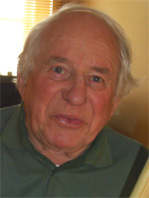
ARNI training – April 2010.
I came across ARNI in a note about a new Technology in Medicine section at the Royal Society of Medicine. A presentation on Stroke Rehabilitation by Dr Tom Balchin was listed for the first meeting in June. With the help of my wife I found information via Google, which was sufficiently interesting for me to call the contact number given, where I spoke immediately to Dr Balchin. After a short talk he offered me a session in Lingfield on Tuesday April 29, warning that it would be hard work and I accepted.
I am 77, and until I had a stroke in December 2008 I had thought I was fairly fit for my age. Apart from moderate Asthma, no acute attacks, but walking up steep slopes difficult I was still energetic and regularly playing tennis. After 8 weeks in the stroke unit at Oxford’s JR and local Abingdon hospital I came home able to walk short distances with a stick, but mainly in a wheelchair. With outpatient PT I progressed to walking reasonable distances with a wheeled frame and was then referred to the Oxford Centre for Enablement (OCE). I was accepted for a 4 week inpatient stay in May 2009 and made considerable progress in confidence, in mobility and regaining some function in my hand. Although my right hand, arm and leg were still badly impaired, with much muscle loss, I found that I could get into most cars, and get up stairs with a left hand rail to assist, and could, with help, therefore begin to live and enjoy much of a normal life, visiting children and friends, going out to restaurants, theatres and travelling. I still hoped to improve, but had given up on e.g. expecting to play tennis again, and had begun to accept that I could go on fairly happily as I was.
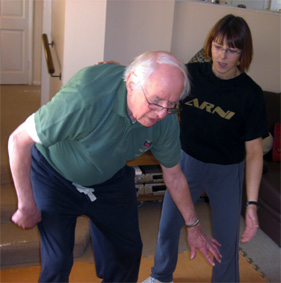 The visit to ARNI was both a shock and a reinvigoration. Tom (we were immediately comfortable on with first names) started by insisting that I leave my frame behind and got myself past the few steps into the work area. This accomplished we went over details and programme, then my wife left, a trainee assistant arrived and I embarked upon the core exercise of getting down to the mat and standing up again without using any external aid. For the next five hours with a short break for lunch this was the main event. I mastered getting down fairly quickly, but in spite of early promise and getting very close I did not quite manage a complete stand up. At the end when we had hoped to demonstrate to my returning wife my remaining muscles were really tired and I realised I needed to do much more to be generally fitter. Around lunch time we also tried a series of hand exercises to improve grip and flexibility with a short broomstick and grip device.
The visit to ARNI was both a shock and a reinvigoration. Tom (we were immediately comfortable on with first names) started by insisting that I leave my frame behind and got myself past the few steps into the work area. This accomplished we went over details and programme, then my wife left, a trainee assistant arrived and I embarked upon the core exercise of getting down to the mat and standing up again without using any external aid. For the next five hours with a short break for lunch this was the main event. I mastered getting down fairly quickly, but in spite of early promise and getting very close I did not quite manage a complete stand up. At the end when we had hoped to demonstrate to my returning wife my remaining muscles were really tired and I realised I needed to do much more to be generally fitter. Around lunch time we also tried a series of hand exercises to improve grip and flexibility with a short broomstick and grip device.
I left ARNI exhausted, but inspired with enthusiasm that I could regain much of my lost function, and also with the knowledge that it would only happen if I was prepared to put in the effort and time that was needed. So far I have recovered from the many aches that first session left, equipped myself with sticks and gripper and hope to make contact with the local trainer to retry the standing up exercise. My priority is to achieve this, while still finding time for the normal life, which I enjoy and which I need to stay in good spirits
John Risely
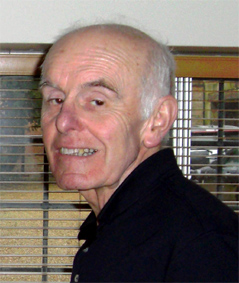
ARNI training – February 2010
From Fran, John’s wife.
My husband John had a stroke 6 months ago and his right leg and walking has recovered very well. But his right arm and hand are not so good, with little movement.
We had a two day session with Tom recently and it was fabulous. Tom got John’s hand moving for the first time – it was my birthday, so rather a good present! He was very encouraging and understanding – he’s had a stroke and so knows what it feels like. We came back feel very fired up and inspired.
Tom set up an exercise programme for John that is easy to follow. He watches the video clips I took of the two days when he needs help. Tom has remained supportive and helpful from the first phone call and since the training. It’s a different approach to NHS physiotherapy as it focuses on task related work, ie getting the “bad” hand to start doing some work or at least thinking about it and reminding the brain it still exists.
When we looked at the ARNI web site we saw a lot of testimonials from young people, but John is 68 and the approach seems to work for him too.
John’s got aphasia and so has problems talking and writing at the moment so I’ve written this on his behalf, with his agreement. We would both like to thank Tom for all his positive help and guidance to date, we plan to be back for a refresher fairly soon.
Dr Byony Elliott
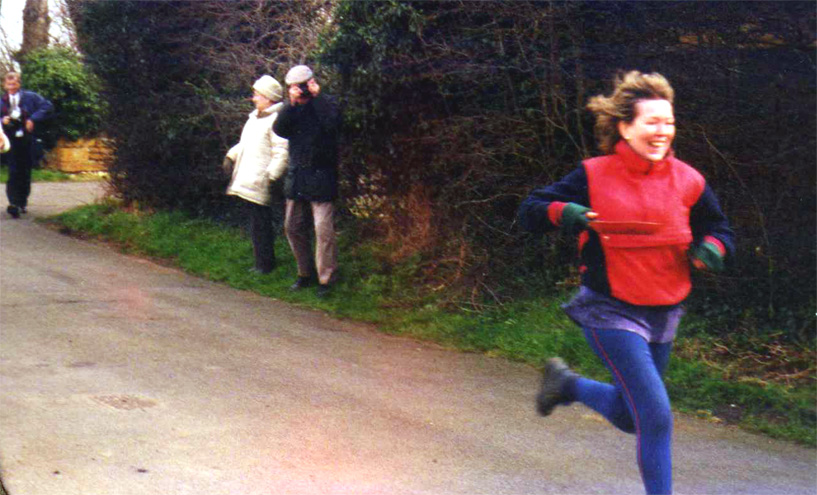
ARNI training – October 2009.
Dear Reader,
We returned from our adventure to see Dr Tom Balchin, Director and originator of the Arni method for stroke suvivors last Friday 23rd October. Let me tell you what a worthwhile experience it was and why. I will briefly tell my own story to establish my baseline :
I was age 47 when my major stroke occurred in 2004, one year after Twin Towers, so nine/eleven has additional ramifications for my partner and myself. Initially I benefited from so-called therapy in a rehabilitation centre for young adults before being cast to community care in Northamptonshire, which excommunicates clients as soon as they ‘plateau’. Left to my own devices, it dawned on me that my task was to assume responsibility for my repair and maintenance.
Accordingly I did work at the exercises prescribed by the physioterrorist, especially the knee strengthening ones.
Five years after the accident, I walk unaided inside; outside, I use a stick for any distance or complications . Most of the time, my left arm works hard at a spastic clench which I hide from prying eyes. I resigned from my career in 2008 and now continue as half a housewife (unbelievable for a full on marxist-feminist). So that is my story.
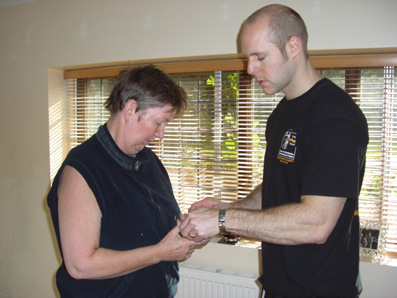 Now the Arni adventure.
Now the Arni adventure.
- Heard about Arni via the Different Strokes journal and contacted Tom via e-mail.
- We organised a two day meeting at Lingfield.
- Kevin, my partner and I read the blogs, so we were prepared.
- We received a warm welcome, and a chat over coffee in his private suite of rooms
- Tom has a collection of manuscripts for clients to browse. I was interested to read Tom’s story and his psychological approach, as well as the illustrations of the Arni methods.
- Next a couple of trainees arrived for tuition (observation and shadowing), Kate and Carol Anne, who turned out to be an extra benefit in the session as there were more demonstrators (assuming hemiplegic disability) learning on the hoof, like Kevin, for me to observe.
- Now reader, a caution about Tom’s approach. If you are the kind of person who, when faced with the delivery of your first ever commode told Social Services (very sweetly) to stick it where the sun does not shine (thereby preferring the challenge of the stairs to reach the loo), then Tom is your kind of person.
- First of all the method of reaching the floor, other than simply falling over. Don’t worry, just think of those ski-iers crouching before they jump off the hill.
- Unfortunately I did not manage to synchronise all the instructions and neglected to protect my right hand which was bruised in the process of descent. However I did stand up as promised with no-one to help me and proud as punch too.
- I intended to repeat the deed quickly but my hand was sore. Tom has researched, sourced and acquired a collection of devices to assist recovery, including the remarkable Magic Box. This simple tool tricks the brain into believing the nerves in the stroke arm are firing and working the fingers. Yes it does generate activity, although I think the real benefit is in the long term, as with the Arni method itself. Who cares? I’ve got the rest of my life.
- In other words reader, if your are stroked, stuck, and looking for hope. Look no further – go to Lingfield. If in doubt, you can speak to us (ask Tom for contact details).
(The intervention referred to in point 10 is a Mirror Box. See the ARNI Product page. Well done Bryony!!)
Dr John Marks
ARNI training – September 2009.
My husband, John Marks, had a stroke in August 2008, which affected the left side of his body and he was unable to walk or use his left hand. He gradually regained some mobility and after six months in hospital we were very pleased that he could go up and downstairs. He had regular physiotherapy for two months after leaving hospital and continued to improve, but then reached a plateau: he could walk short distances using a stick, but lacked confidence without it and was fearful of falling.
Dr. Tom Balchin, the founder of ARNI, invited us for an intensive training session. I think this came at a good time for us, as we were both feeling despondent about the lack of further progress and we had given up trying. Tom is not only an expert in the field of stroke rehabilitatio, but he is also extremely sensitive, tactful and firm. He got John to walk without a stick or any support – something I couldl never get him to do. To my amazement, John walked much faster and more upright. Although John is now 75, Tom was adamant that he ‘should not walk like elderly man’. For the first time since John’s stroke I could see a resemblance to the man he was before the stroke.
Since then, using Tom’s authority, I have been able to persuade John to walk short distances without a stick, while I hold his hand and he continues to walk a little faster and more upright.
Tom also succeeded in getting John onto the floor on his hands and knees to demonstrate how to get up again from this position. Although this was less successful (John was very reluctant and anxious about this exercise), this was very helpful for me to observe and try to put into practice. I haven’t managed to get John to try it again, but this morning when he slipped from the bed onto the floor and called out for me to pull him up, I was able to get John to move onto his hands and knees and then pull himself up onto the bed. This, for me, is good progress and I think also gave John more confidence.
John is continuing to use the ARNI grip strengthener and so we hope he will be able to use his left hand more.
Tom’s help has been a great boost for both John and myself. Although John can be negative when I try to encourage him to do more things for himself, invoking Tom’s authority usually does the trick!
We are both so grateful for all the assistance and encouragement as well as the practical exercises.
John Pendreich

ARNI experience – September 2009.
It was with some trepidation that I arrived at the ARNI trust for a two day session with Dr. Tom Balchin. After all this was Lingfield not Lourdes! Recovering from a stroke the year before, I felt that the rehabilitation attention that I was receiving from the NHS although good at the resident rehab stage, now needed to be bolstered somewhat. |I was not going to accept that my paralysed side (leg and arm) were not going to get much better, My goal and vision (I saw myself physically back to my pre-stroke condition, if not better!), had kept me sane during my five long months in hospital and rehab.I knew that to really progress I now needed the right type of exercise, as well as physio.
Luckily my wife had spent hours continually researching all the latest advances in stroke rehab, I therefore arrived at Lingfield with a very positive mindset, I knew that Tom was going to show me how to achieve this. Knowing from the ARNI website that wheelchairs were frowned upon, I walked to his front door with a walking stick, this effort was still frowned upon. Two days later, after a mixture of floor work, lashings of encouragement, 20 balancing exercises and stretches I was able to walked back to the car on gravel, albeit slow and shaky, without the stick.
Furthermore Tom was able to build on exercises that I am already familiar with – I used to be quite good at sword fencing – so part of my exercise routine includes the lunging and parrying routines that I was already familiar with. He encouraged me to prepare a series of exercise routines (which he will monitor)that I felt comfortable with into which I have inserted the more traditional TAI-CHI warm up exercises and exercise bike routines.
Above all, I believe that with persistence and my new found self-belief instilled in me during those two days that I will achieve my ambition.
Len Faria
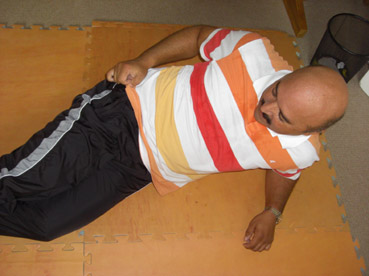
Hi there
Just wanted to let you know about our experience of ARNI and in particular our 2 days with Tom at his home in Surrey.
Our story:
Len had a diving accident in March 2008 whilst on holiday in Egypt this in turn led him to suffer a basal ganglion haemorrhagic stroke which affected his right side with paralysis – he was 48 at this time. Since March 08 Len has made amazing progress and has been walking since end of April 2008 – this has been progressive over the period of the last year. He has received OT and physiotherapy since his stroke until May 2009. He was then told that he had reached a plateau so therefore there was no further treatment available to him.
We discussed other options however it appeared that there was no further options available this was to our minds unacceptable. It seemed we had another obstacle to overcome, we have never given up hope that Len will get back as much use as possible in his right arm. He has a small amount of movement in his shoulder which has been achieved – however this needed further help and assistance. We didn’t know what to do to improve this arm …….
It was then having searched the internet for exercises and any information on stroke survivors that we discovered Tom’s website for ARNI. It seemed to be too good to be true that we had possibly found an alternative for us to pursue. That evening I emailed Tom to advise him of Len’s condition and ask for his advice and support…….I spoke to him a couple of days later and felt really excited about the possibilities that he had talked to me about – I spoke to Len and together we decided to go and visit Tom in Surrey for a 2 day introduction to ARNI and how this could help Len.
We arrived at Tom’s middle of July 09 Len was walking with a stick at this point – one of Tom’s first questions was Why are you walking with a stick my friend? Stick’s are for old men! Len hasn’t used hi s stick since – this is due mainly to several techniques that Tom showed to him in order to help Len with his confidence in walking and balance. We also had a student working with us Shirley who was from Middlesex University. Both Tom and Shirley were so friendly and helpful but equally were there to ensure that Len was pushed that little bit outside of his comfort zone in order to get as much from the 2 days as possible.
Our priority was working on Len’s arm which a lot was achieved over the two days – with all the exercises which Len was shown and worked on he was able to turn his wrist over and back – also he was able to grasp a small object “very carefully” and transport this to another person’s hand.
Since we have been back home – Len has abandoned his sticks and continued with the exercises that Tom and Shirley have worked with him on and already we can see more very small but definite improvements.
Having previously been advised by OT and Physio not to use a ball to exercise the fingers and refrain from walking too far – so as not to over do it! It is frustrating that the exercises Len has done so far have been within “other peoples” comfort zones……We would advise anyone to push themselves that little bit further on the road to getting better if you don’t use it you will lose it. So passive exercise really is of no use – you need to be active. Tom is a hugely inspirational and energetic person to meet he is absolutely the right person to take advice from after all – he has been where all stroke survivors find themselves – and got himself back using the techniques he shows and innovates directly for others’ individual requirements!
We are really looking forward to meeting with Tom again to show the progress that we know Len will make over the coming months…..
Jo and Len Faria
Coventry
Beth Williams

Our ARNI experience – June 2009 – Who needs a Wheelchair anyway?
My wife, Beth, had a stroke 10 months ago due to a brain haemorrhage which left her paralyzed on her left side. She is young, 36, so it was a shock to myself and our 2 young children. She spent 8 months in hospital where she slowly regained use of some of her leg muscles and after daily physio sessions and was able to walk very slowly for short distances with the aid of a walking stick.
After she was discharged her physio sessions went down to 1 per week and I saw she was making no progress and that the physios were concentrating more on relieving any muscle tightness without working with her to get her do any tasks which could start movement in her limbs. And she was definitely not given any motivation to try.
At this stage Beth seemed to give up and accepted that this is how it was going to be and settled into her electric wheelchair.
This is when I searched the internet to try to find a better approach and found ARNI.
I spoke with Dr Tom Balchin (founder) and he tried straight away to pair Beth with a trainer, but as we live in North Wales we were some distance from the closest ARNI trainer in Chester so Tom offered us the opportunity to go down to see him and have an intensive one on one training session covering a 2 day period. We gladly accepted and saw Tom this June.
Beth was used to getting around on a wheelchair and only walked as part of her physio program so it was a bit of a shock to her when we arrived at Tom’s house to be told that he didn’t want her to use the chair and asked her to walk with her stick down the drive to his front door so he could assess her abilities, which she did (slowly).
Tom has 2 steps leading into his house and Beth had not attempted steps before but was able to get up these and then down 3 stairs into his training area and then Tom asked for Beth’s stick which she begrudgingly gave up and then walked her first unaided steps. I was amazed at what she could actually do but also very disappointed because she was obviously capable of this yet nobody had tried to push her past her “comfort zone” before!
Tom has a great talent at persuading people to push themselves further than the boundaries they think they have and Beth said she listened much more to him than her usual physio because she knew he had gone through the same as her yet was stood in front of her as if nothing had happened. So she gave him a lot of respect for that.
During the 2 days we were given a lot of advice and shown various techniques to help Beth which were really helpful, and then after four tries she managed to get down to the floor and up again without help! I was so pleased to see this, and she is going to have less fear of the floor. The training mostly concentrated on her walking, which is more important at this stage, which she did most of the time unaided.
When we arrived back at home the first thing we did was to send the electric wheelchair back and Beth now walks around the house and her walking is improving. We are now happy to make the 2 hour round trip to see an ARNI trainer and feel very optimistic about the future.
I cannot thank Tom enough for showing Beth that there is light at the end of the tunnel and with hard work, a good recovery is well within her reach.
—————————————–
Update from Jeff 8th July 2009:
Great news about your new books. Soon be able to help a lot more people 🙂
We met ARNI trainer Terry Samuels, nice guy, his gym is on the first floor but beth flew up the stairs no problem! Seeing him again on Fri and every week from now on, seems to know his stuff when it comes to the ARNI program.
All the best
Jeff
Update from Jeff 11th July 2009:
Just to let you know, Terry worked on Beths arm yesterday to try and trigger some kind of movement and she managed to close her fingers AND move her arm up to her chest!!!!!
So we are all overjoyed, great news eh:))))
Getting on really well with Terry he’s a top guy.
All the best
Jeff
Update from Jeff 6th August 2009:
We are doing good thanks, seeing Terry weekly and Beths progressing well, she gets on well with Terry and enjoys her sessions.
She’s going upstairs at home now which is good considering we were contemplating a stair lift 6 months ago!
Not on holiday (I wish) but sure we will go somewhere soon.
We will order a gripper as her hand is starting to work now.
Bout time you had a break and visited Wales eh?
All the best mate
Jeff
Alan – age 6

(from Rosemary, his mother)
Now to Alan he is doing really well what I really noticed since we came home is that his attitude has improved, he does not seem to be hiding his right hand as much as he used to and even while watching T.V. he is working it sometimes I think without realising it.
He is doing his excercises a little more willingly but still wanders off on me all the time but hopefully this will improve with time as I have to keep reminding myself that he is 6 and his attention span is short. The experience for him and us was very positive and has renewed the hope we had when he was a baby.
The other children help with the excercises and encourage him along he talks very fondly of his trip to England and his party piece is now doing the Queen’s wave pulling the funny face for effect. I think meeting you made a big difference to him as I think he could identify with you better than children he has met at physio they were often in wheelchairs and had learning disabilities he had never never met anyone who had been through disability and over came it before.
I will write something for the newsletter and will send it to you so I hope to get a chance to do this next week and get Alan to sit down and contribute,
I have not forgotten your DvD you lent me so I will send all to you then. Thanks again Tom for giving Alan your time we all really appreciate it.
Rosemary
Pat Grocott
Off the floor – ARNI Training 5 weeks
Since my stroke in Dec 06, the need to improve and sustain a reasonably adjusted life has been foremost in my life. The need NOT to be totally dependant on the wheelchair, the need to make my hand semi functional, and the desperation to try and gain some independence. I decided to go ahead and seek more help by asking Dr Tom Balchin of ARNI to recommend an Instructor.
Sally Furnell, a trained Personal Trainer with lots of experience in helping people with various disabilities came to my rescue. She is now a trained ARNI Instructor and yesterday was my fifth session. With the full knowledge of my physio in hospital, my training programme with ARNI and the hospital physio is paying dividends. One of my bedrooms looks like a mini gym. I have a Pilates Swiss ball where I have balance exercises to do, a tubing hung over the door to do exercises to build up biceps/triceps muscles, and due to severe muscle wastage on my legs, lots of muscle strengthening exercises. One of the main aims of ARNI is to get off the floor, using leg muscles of the good leg, with the assistance of the good arm. It was so difficult. Sally ends her session with floor work, getting on the floor without holding on and ends the session with getting off the floor without holding on.
The first 3 sessions were a nightmare. Most strokees are afraid of getting on the floor, understandably. Yesterday 5the session Sally did lots of stretching exercises. I’m flexible and she stretched the ham strings by lifting my leg (good and stroked) 90 degrees. She stretched the gluteus muscles and the Quads. With patience, and using every breath, I got off the floor without hanging on to Sally. I was stunned.
Sally/ARNI is a godsend and although its going to be long term, I can see some light at the end of this dark tunnel. I have fears all the time. High tone in foot, big toe clawing, wobbly walking, weak arm etc etc all the challenges the befall a strokee. Tom Balchin, suffered a stroke 10 yrs ago, is a martial arts grand master and he uses martial arts techniques to train strokees. I do lots of exercises to strengthen leg muscles but on Sally’s (ARNI Trainer) recommendation, she suggested I drink a Whey Protein drink daily to assist muscle build. Sally is a qualified nutritionist so have just ordered some. Went to physio this morning 8am to do circuit session with 5 other people. The physio gym has a machine called a Balance Master for assisting core stability and helps to strengthen ankles. Another 8am session with physio to do arm exercises.
Jeremy
64 years old, after 10 months of weekly 1 hr training.
Jeremy – ARNI Training gives a new lease of life
I had a lot of physical exercises to do – many of which I learned to practise at home. My mobility is better now. I walk better, without a limp most of the time. This class has helped me to understand how important it was to practise everything I’ve been through. No pain no gain attitude. I’ve learned how to protect myself if I’ve had a fall – ie how to fall safely. How to manoeuvre oneself on the floor into a position to get up again without any help from people. This takes away the fear of falling especially when alone. Hand massage and exercises has helped with picking things up and learning to grasp objects again. I can now lift a whole mug of water to drink with my weak hand. Before, I could not lift my hand onto the table.
My posture has now also improved, but I still need more work on my right shoulder. Breathing exercises has helped with my anxiety following stroke. The class has been helpful to me I see other people with similar problems. This gives encouragement to me and others who may have just commenced the course. We learn from each other. Its also a nice social interaction with others. I like going there every week. I also think that Dr Tom does a very good job. He is very friendly and patient with everyone. His method of teaching is relaxed, and he also includes everybody no matter what stage of their stroke.
Paul
56 years old
Improvement all the time!
I joined the class in Feb/March 2006 and enjoy it very much. I travel from Bristol to London every week and back so I can attend ARNI, and wouldn’t miss it. It has aided my recovery and helped improve my confidence. I am now able to stand unaided, and this has become easier and faster. I had a fall a few months ago and was able to stand and walk for help. I would like to continue to improve my strength and mobility, to feel more confident walking without a stick and to gain more use of my right hand and arm. I enjoy the social side of ARNI and meeting others with similar obstacles to myself, and following this seeing their improvement. The instructors are great and I appreciate the time and effort they put in. It was good experience having acupuncture and discussing alternative recovery methods (eg diet and massage) with the Korean masters. I enjoy gardening and feel ARNI helps to improve my balance – I now never use a stick – and I am happy to walk around at train exhibitions, which are often very busy.
Margot
Hiya,
I know now that I have left Arni my continuing recovery does not mean much but today I did something amazing that I have to tell everyone about. Since March we have been working in this modern building where access is via some bridges suspended over a sort of stream so getting to the front door is fraught with danger because one slip and you could be swimming for your life in freezing water. it’s usually very slippery especially when it rains. . I usually walk at either end, holding on to the railings for stability but today I thought I would try something new as I have been doing leg lifts with my “baby” dumbells suspended from my ankle as I think my ankle is very weak. I wasnt wearing my brace either. To cut a long story short, I walked to and from the bridge, walking in the middle without any support from the railings. It was a fantastic feeling to realise that my ankle was strong enough to support me. I am still on a high!
Margot
Bernice and Herb
Dear Dr. Balchin,
Friends in Chiswick sent us a copy of The Chiswick February 17, 2006
article, “Arni: Now there is life after a stroke.” Thank you for highlighting what seems to be a wonderful program and for your attention to stroke, which in the U.S. is the greatest cause of long-term disability.
Key to the Arni program, and our book, ONE STROKE, TWO SURVIVORS (published by The Cleveland Clinic Press and just released this month) is that stroke survivors must work hard and keep working. Progress is not limited to 3-6 months, as many physicians claim. Nor is it limited to 3-6 years. Advancements are slow but with effort they can be continuous.
Please check out our website: www.onestroketwosurvivors.com. Your members may find it of interest. Our book details the many programs that my husband has participated in since his massive stroke in July 2001. Exercise, including treadmill, is very much a part of our regimen.
Do you have plans to bring your program to the U.S.?
Best wishes,
Berenice E. Kleiman
berenice@onestroketwosurvivors.com
On July 14, 2001, at around 9 a.m., my life turned upside down. My husband Herb survived a massive and debilitating stroke. Our world today is totally unrelated to the past. Energies that we previously focused on family, business, hobbies, and our community now converge on rehabilitation and recovery.
I have lost—temporarily or permanently—my mate, best friend, and business partner. I lost the man who walked the dog on rainy nights, cleared the dishes, and fixed what needed fixing. I miss the concerts, plays, intellectual discussions, and the long driving trips we shared. I worry about who will be my caregiver when my time arises. And I miss making love and the intimacy that comes from being held with two arms. This total loss is so incredible and inconceivable that I refuse to accept it as final.
For these first three years, I’ve driven my husband and myself in a continuing effort to further his recovery. As we inch our way forward, the process seems frustrating, agonizingly slow, and sometimes beyond our capabilities. But we keep going because the alternatives are worse.
Stroke survival lacks a well-defined roadmap. Even professionals report little patterning. No two strokes are the same; no two patients follow an exact progression. Projections are at best educated guess work but I believe that our dogged resolve and hard work will beat pessimistic percentages. Indeed Herb has already made remarkable advances.
Forty-one years ago Herb and I vowed that we would not live our lives based on numbers, clichés, or societal molds. We didn’t then and we haven’t now. The post-stroke journey is not easy and we continue to encounter setbacks. Along the way Herb remains ambivalent about his own progress.
Was it worth the time and trouble to not warehouse me? The question has been ever-present since I first came home about three years ago. My moods are erratic, ranging from complete despondency to a much more hopeful outlook. At one extreme, the bleakest, is the consideration that things are different, drastically so. I sometimes have the feeling I’m a total drudge, not only to my wife but also to anyone lending a hand.
As wife and caregiver I, too, wrestle with questions. When do I acknowledge enough is enough and no longer demand continued improvement? At what point do I back off and let Herb choose an easier existence, whether that be facing his wheelchair to the wall, working at his crossword puzzle, or vegetating in front of the television set?
More determined than my husband, I continue to push exercise, experimental therapy programs, seminars, and even a nutritional regimen. Our contest of wills is often abrasive. Herb would gladly trade me and everything he owns to feast on rich desserts as often as he wishes. I, on the other hand, long for him to move his right hand and become self-directed.
A good compromise would be reaching with my right hand for a piece of cake. Is that possible?
It is tempting to give up and walk away. Often I want to. I miss my independence and want to enjoy life. But I can’t turn my back on my soul mate.
This book shares lessons and tips that, had we known up front, would have made our journey much easier.
We recount our experiences in two voices and sometimes differing viewpoints. Mine, as the caregiver spouse, are interspersed with Herb’s selective comments, as the stroke survivor. We hope our message reaches the family members, and especially spouses, who love and care for survivors with disabling and chronic illness. Perhaps as we lift the curtain to reveal personal and family issues, our candidness will ease the journey for you who follow us.
The total loss from Herb’s stroke was so unacceptable, and the dour predictions so limiting, that I refused from the beginning to accept one or both as final. Don’t allow yourself to accept this utter finality either.
Together Herb and I urge you to work hard and not give up hope!
Billy Matthews
Dear Tom,
Thank you so much for your reply. We would very much like to visit you, and when we have a trip to the UK planned, we will let you know.
I hope the attached document will help you. It is a very brief account of the past nine months, as well as a story of love and dedication that we have for each other and our determination that Billy will make a full recovery.
Billy’s stroke was two weeks before we were to have been married.
Also attached is a photo if you would like to use it. If you ever need additional articles or research/statistics about strokes, please let me know. We plan to be very active in this area and have already undertaken a lot of research. I am a published author and have written speeches for some
well-known people.
We wish you good luck with the endeavor and promise to follow your progress.
Paula Holmes & Billy Matthews
Unless you’ve been close to someone who has had a stroke, you aren’t likely to know what a stroke is about. And unless you have had a stroke yourself, you can’t know what a stroke really is. After our first-hand experience with a debilitating stroke, we found that there was a deficiency with understanding the impact of strokes by doctors, nurses, therapists, caregivers, and patients themselves, and we were given conflicting information and advice. There just was no good overview– specialists who might have known their own field well enough, but who didn’t know strokes, couldn’t answer questions about them, and couldn’t “see the forest for the trees.” Traditional therapy just did not seem to give answers to many of the puzzles of a stroke that we encountered.
In our search for a good overall approach to recuperation/rehabilitation from a stroke, we discovered the UK group Different Strokes (www.differentstrokes.co.uk). We began reading chronicles of stroke survivors posted on the site, and that is where we found Tom Balchin’s story. His approach to recovery made more sense than anything we had been told or had read. It was this approach that inspired us to take a wholistic view of stroke recovery, and to put it into practice. In following Tom’s progress through his organization, ARNI, we are, nine months post-stroke, still convinced that this is the most efficient and positive path to recovery. The following is a brief chronicle of Billy Matthews’ stroke and our approach, based on the brief but inspiring story written by Tom Balchin and his work with ARNI.
Billy had a massive left-brain ischemic stroke on April 30, 2005, at the age of 62. He awoke at 7:30 am, really didn’t feel well, but had some coffee and went back to bed. He fell asleep and awoke twice more– the third time we knew that he was having a stroke. Unable to stand properly, he was bouncing off the wall, his speech was slurred, and the right side of his face was beginning to droop. And so began the long journey down a road we never imagined we would take. We now realize this was a life-changing event, and one that would require more patience and hard work than either of us had ever faced.
We managed to get Billy dressed and to the car for the ride to the emergency room. He was somewhat stabilized in the emergency room as paralysis was spreading. The last movement that Billy was able to make was to squeeze Paula’s hand. By the time he was taken to the intensive care unit, right-side paralysis was complete and he couldn’t speak. After several days, Billy was taken by ambulance to a rehabilitation hospital where, during the next three weeks, he learned to swallow, speak, sit, transfer from a wheelchair, stand, walk with a quad cane, go up and down steps, fall safely and then get up on his own. And then at the end of May, one month after his stroke, Billy came home.
And our work together began. Outpatient therapy at a rehab hospital was supplemented by an intensive passive exercise program at home. The dining room was turned into a gym– stairstepper, recumbent bike, treadmill, weight bench, balance board, stability ball, soccer ball, tennis ball, squeezie ball, various types of hand grips, cones, weights, therabands, rubber bands, stretch cables, pulleys and ropes– you get the idea. As Billy slowly began to work on his own, each exercise slowly transitioned from passive and gentle to active and aggressive. Even today, nine months later, there are still some movements that require both of us to accomplish. But nine months! Miraculous!
Billy’s complete recovery is our goal. And it takes both of us to get where we want this journey to go. When the weather was warm, we would go for a walk almost daily along the river, at first with a gait belt and quad cane, and only for a few feet. By the time the weather turned cold, the gait belt was gone and Billy could walk more than a mile with a single-point cane. Today, he walks around the house without a cane, and we are working to perfect his gait technique.
The right arm and hand are slower to recover, but they are recovering. He has complete movement but lacks some range of motion and needs more strength. We know that with patience and hard work, the arm and hand will return. Billy’s speech is fine until he gets tired at night. Then some of his words “get wadded up” and we know it’s time to call it a day.
We both believe in a wholistic approach to stroke recovery. Lots of what are now called “brain foods”, vitamins and fish oil supplements, massage, relaxation, tai chi, and of course, hours of exercise and strength training. We also break the routine by taking long rides in the car and stopping at interesting places to eat or have a coffee. We know it’s working. Billy’s progress is remarkable by any standard. In December he was retested by one of Indiana’s “senior driving specialists” and got a new driver’s license. He was fortunate in that his vision and cognitive abilities were not affected by the stroke. And we are fortunate in that both of us have a tenacious personality type. We have spent a lot of time and energy researching strokes, therapy techniques, non-traditional approaches to recovery, and synthesizing the information to come up with our own personal program. We will continue to work and play together, to love each other, and to have a good life together. To all who say the most important keys to success are persistence and a good attitude, we add our voices. And remember, if you lose your sense of humor, you are, indeed, lost.
Margot
Hiya Folks,
Just letting you know that I am back at Arni and letting my hand do the talking for me as usual.
I hope I will not bore you but I find that being back at Arni is wonderful, in terms of motivation and well being. I returned especially to work on myaffected hand/arm but its a different Arni to what I knew before. This timeI am taking advantage of free sessions of exercises which include free acupuncture. Its runs for a period of 8 weeks and I must say its very different indeed to my first stint with Arni. This time I have two very experienced professionals working within me. The first one is a Grand Master in the martial Arts, also proficient in acupuncture, having successfully treated around 40 people afflicted with stroke in Korea, the second one is my nemesis who has returned to haunt my dreams. I speak of none other than Dr Balchin, a task master if there ever was one. Regardless of what I see as his inflexibility, ( I am always in dire pain which he refuses to acknowledge), I have tremendous respect for his professionalism, he is fiercely determined to ensure that others who have suffered a stroke are in the same position as he is, i.e. 99 % recovered or 100% , depending on how you see it. I enter the training room with some trepidation as I know he will be relentless but I acknowledge that his heart is in the right place and that he wants me and everyone else in the class to improve, we have group sessions which are working out well. We are all at different stages of recovery but are working together as one, each learning what is most appropriate and suitable. The second thing I have to contend with is the acupuncture. It is painless and already, after just two sessions, I could see a little improvement in my hand /arm as the high tone was reduced to medium tone after session two.. I wait with anticipation for additional sessions of acupuncture as for the first time, after my second session , I wasable to extend my hand in an upright position, repeatedly., helped no doubt by the hand exercises I had been doing (taught by “Grand Master” Balchin ). I find them fascinating and do them all day at work when I am not engaged in typing or writing or .
Apart from the torturous experience of getting up from the floor, the other exercises are simple and can be done discretely all day long. I will say that despite good intentions, I have forgotten how to get up from the floor and spent an embarrassing session 3 on the floor wishing the ground would open up and swallow me as I couldn’t remember how to do it, but not for long because, this is the beauty of Arni, once there you feel compelled to practice and I will conquer my inability to do this within a week.
My walking is much the same as when I stopped attending with Arni in 2005 but I do lots more walking these days and go outdoors more often, especially to the shopping centre, a nightmare at the best of times. I am hoping to have some great news to report at the end of February as I will, hopefully, have had more sessions of acupuncture..
Margot
Margot was invited to come to the free group sessions, and the combination of free dedicated ARNI training and acupuncture will help her offset the cost of the taxis she keeps taking when she should be braving public transport! (Only kidding Margot)
Paul Edgar
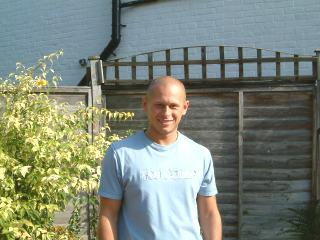
My name is Paul Edgar and on June 17th 2003 at the age of 21,I suffered a stroke. This left me with left sided paralysis. I was transfered to Kings Colledge Hospital,London from Queen Elizabeth Hospital Woolwich, I underwent a six hour operation just Three days later.
After two weeks I was transfered to Frank Cooksey Re-hab unit for a further six weeks. I left there able to walk; But my left arm and hand I was still unable to use. It is now approaching a year since I had a seizure of which I have had four previous seizures resulting from the stroke.
I continued to have Physio at Queen Mary’s Hospital, Sidcup twice a week on trying to improve movement in my left hand. I have since had three lots of Botox injected into the muscles of my left arm to help relaxation of the muscles for Physio.
I heard about ARNI through a friend of mine passing on a leaflet to me whilst he was working at Swanley Market, I got in touch with Tom Balchin ( co- founder ) of the ARNI GROUP. We arranged to meet at Richmond in Surrey for an assessment of my situation. He then made arrangements for me to meet IAN BATES at EYNSFORD in the village hall This is near Dartford, I to date continue to have one to one sessions with Ian.
The ARNI GROUP uses Martial Arts movements to help with the progress of recovery, I also find it mentally relaxing, I have NOT found this exiting and unusual approach with any other group.
I am enjoying my sessions with Ian and feel that my left shoulder has gained more rotational movement. I am also working on my wrist, Hand grip and release by using a “JO” or Martial arts stick, I do this by twisting it around in different directions and positions, By using my right side to also do the exercises helps my mind to work better on my LEFT side.
I understand that progress will be slow; I do however! feel progress all the time, I also have a determination to get back as much movement as possible, Ian assures me I am going down the right track with my mental strength’s.( Ian has practised The Martial Arts for 20 years )
I have done some research on ARNI and found there is a very successful and ongoing history within the group.
Have a look at the website at WWW.ARNI.UK.COM
I aim to get back as much movement as possible and to get my driving licence back as soon as is possible, I would also like to get back to work and lead the life I used too before the stroke, I will achieve this by my own efforts and with the help of Ian and The unique ARNI method.
ARNI a unique way forward
written by Paul Edgar July 2005
Aileen
2 day training course no.1
Hi Tom,
I thoroughly enjoyed working with you over our two day course. I found your approach to training and life in general truly inspiring. The progress your other students have made have convinced me that i can make a one hundred percent recovery, whatever the doctor says. I learned how to increase my confidence going up and down steps properly and safely – and immediately saw the difference.
I have already began strengthening my hands and forearms and thoroughly enjoy repeatedly pushing Bob to the ground martial arts style. I have surprised myself with the weights i am currently able to handle.
I fully expect to be dancing in my stilettos shortly. Hopefully Bob and i will be able to come back and train with you sometime soon.
Love
Aileen
Russ
On July 6th 2003 I suffered a stroke which affected me down the right hand side of my body. The physiotherapists and occupational therapists were great and within 3 and ½ months I was walking again, although my right arm was still extremely weak and it took a great effort to use it. I was discharged in November 2003. Almost straight away I went back to the gym and started training with Graham the instructor there. I built up some strength and movement in my arm again although the arm did not feel part of me and I really had to concentrate when moving it. In July 2004 I had improved enough to take my driving proficiency test with a manual car, which I passed. I also started my part time job again. The gym was obviously helping, however I wanted to do more to speed up the recovery of my arm and leg.
That’s when ARNI came in. My sister found out about it on the different strokes website. It was quite a long way to travel so I went along to watch a lesson see if it was worth the travelling. I wasn’t disappointed and decided to join up, despite the 3 hour drive. I turned up for my first lesson in November 2004. To begin with I was taught by Dave Waters. He got me running correctly again and doing martial art movements to improve dexterity, balance and strength. A couple of weeks into my training I had a lesson with Tom Balchin, the other teacher there at the time. Tom had also suffered from a stroke 6 years ago and now through martial arts training and doing weights he was a stronger (he is unbelievably strong!) and better person than before which gave me some hope. He got me working out with a disconnected punch bag, doing dead-lifts, arm curls and much more. He also got me doing martial arts moves to improve my dexterity, strength and balance. Tom took me on as pupil after that as he could see how much I wanted to improve.
In January 2005 Tom moved to west London (Isleworth) which took an hour off my travelling time. To begin with Tom got me training in the University grounds where he was working, doing bench presses and shoulder and leg work on awkward objects like heavy boxes. He also got me working out using his bands which are excellent (I bought a set!). We eventually joined LA Gym in Isleworth which was good as it has a large hall so we could do martial arts and also a good weights section. Recently Tom has got me doing squats as well defending myself with my bad arm and trying to get out of holds with it, all of which are good exercises.
Driving to ARNI in Lingfield (Gatwick area) and back was very tiring to begin with. I found that my hand didn’t want to do anything after a lesson. However, as your strength and dexterity improve the driving gets easier. After ARNI moved to Isleworth the distance shortened and the driving was no longer a problem.
Since joining ARNI I have improved a lot. I can now:
- Bench 18kg dumbbells.
- Barbell dead-lift 140kg from floor (yes, 140kgs)
- Shoulder press 12kg dumbbells.
- Front raise 5kgs, side raise 4kgs.
As well as doing rows etc. I also have good balance and better movement. I now plan on going back to University and doing a masters part time in September. I am also going to carry on at ARNI gaining more strength and dexterity.
Margot Montague
I am writing this as a veteran, a true survivor and as someone who has had the good fortune to attend Arni and triumphed. I attended Arni for a period of one year and to say I am much improved is an understatement. I have
blossomed under the expert tutelage of two very dedicated instructors, Apart from improving physically, (I learned to walk again without props), I also learned to laugh again, as after my stroke I didn’t think there was any benefit to life, I was very down but every Friday after my sessions which were sometimes tough and challenging, I would leave Surrey with a good feeling that I had made major accomplishments.
At the start my walking was appalling. I trudged along with a hobble that was funny in the extreme but session after session I was made to practice the art of walking. I began to think that instead of a dancing queen Dave was going to make me into a walking queen. Back me up on this one Abba. Dancing had been my passion pre stroke and it’s still something I hanker after but I know I will do it again.
Since I left the group in January 2005 I realise and appreciate how committed he had been to ensuring that I got the movements correct because now that I no longer attend and despite my best intention I have fallen into the habit of saying I will do it later, I am too tired now instead of exercising as and when I should but when I walk I am conscious of every thing that I do wrong and I remember to put it right, this is only because I can hear him in my dreams, urging me on to do it right. . This is what 12 months of intense tuition have done to me. For as long as I am challenged by my movements I will remember the principles of Arni. Its about hard work, achieving, and never giving up. These are attributes than one can easily incorporate into all aspects of life., not just stroke rehabilitation. A tribute to its instructors. I am still trying to get some movement in my arm and I continue to exercise it every day. Unfortunately I was not able to get this working before leaving Arni but I remember Dave saying to me , incorporate your arm into everything that you do , as this will make it work much faster but I found it more efficient not to use it and I now regret not trying to use it more during the last year.
It seems strange that an organisation set up to assist you physically can actually make such a difference to all aspects of your life, I am specifically referring here to one’s mental health. I personally found that any improvement in physical well being reflected itself in an equally beneficial mental improvement. At Arni I always had a laugh and this proved to be very beneficial as I was having lots of problems with depression, a trait common to a lot of stroke survivors. To meet with other stroke survivors and to be able to relate positively is a great mental boost. It also helps to have two trustworthy and understanding instructors to assist with any worries. As the saying goes a problem shared is a problem halved. This is so true and I have only admiration, respect and best wishes for the instructors and my fellow participants. They all helped me along the rocky road to recovery.
Margot Montague
Margot has been one of the best supporters of ARNI training methods that we have had. She has tirelessly promoted us in all sorts of forums. As we don’t actively advertise apart from the website and a few flyers in order to keep training exclusive (those who find us have to have the desire to search for us!), this has been appreciated. We have received good write ups in Different Strokes forums and Margot has, as well as training hard, been able to realise how our ‘home-grown’ training is a bit of a labour of love, especially as we have expanded. So, thanks Margot, and we wish you all the best as you move on.
Jeffrey Shaw
I started at “ARNI” in July 2004 twelve months after my stroke I had a bleed on the left hand side of my brain which left me paralysed down the right hand side of my body.
I left Farnham Re-hab in August 2003 in a very poor state of mobility, I could only walk 10 paces and my arm was floppy. I lost all of my self-confidence and found life very strange outside of hospital. However I wasn’t prepared to accept the status quo and battled back with no help from physio and occupational therapist departments in the first seven months.
In May 2004 I got help from the Occupational Therapy Department, which was superb.
I met Dave Waters of ARNI in the July 2004,within two weeks I gave up my walking stick and Dave concentrated on my walking and mobility. Slowly but surely I improved my walking, my mobility and my all round fitness. The most important thing was the trust and faith I had in Dave and over the past eight months I have become a good friend and I really have a lot to thank Dave for.
Even though Dave is not a Physiotherapist or a doctor, he has an incredible ability to break everything down and get you to walk correctly and has a great understanding of how the mind and body are interlinked and how you can train the brain to send the correct messages to your damaged side.
Eight months on I have gone from a person who had a walking stick, poor mobility and a low self esteem; to a man with pride who can walk four miles, very mobile, performs most things that everyone does on a daily basis.
The most amazing thing is with Dave’s help I can now run 800 yards with one stop. My ambition is to run one mile by July. I start Martial Arts on Thursday 10th March, which I am looking forward to.
I would recommend ARNI to anyone who has brain injury, my money was well spent and my quality of life is so much better.
MORE FROM JEFF:
November 2004, I have been with Dave at Arni for five months now and have made great progress,my mobility has improved and my walking is getting better but their is a long way to go.
December 2004, I am concentrating on improving my mobility by focusing on exercises that loosen and stretch my body from head to toe it is hard work and the improvement is gradual,like putting bricks in a wall.
January 2005, a new year and new goals to achieve,all people who have had a stroke know that the improvement is gradual and at times you hit a plateaux and you feel that you cannot make any more progress.Well I feel very confident about my ability to conquer the paralysis and improve my mobility so that is close to normal.My work with Dave has concentrated on my mobility and I have started to run in the gym things are looking up.
February 2005, I am feeling good and my hard work continues, my running is improving and my mobility continues get better, the exercises are intense but so good for my body. Dave is is so good and I feel good working with him.
Jeffrey Shaw
Jeff is still training with us and doing very well in terms of return of isolation movement (Dave – Sept 2005)
Russ Morgan
drives from Bristol and back every week to in Isleworth, near Richmond.
Sheila Martin
has started training with Andy Fox in Borough Green. Welcome, Sheila – we hope ARNI helps you to rebuild the way you want to.
Katie MacQueen
has just joined the Isleworth centre, and she also lives just down the road. We have a feeling that she is going to do really well if she does the training outside as well. Go Katie!
Tom Francis
has just started at the Borough Green training centre. Go for it Tom -looking forward to seeing your progress.
Jeremy Waters
from Twickenham is also responding well in the group class – and we never see him complaining. Good stuff.
Linda Michaels
rom Bedfont, Middlesex is already doing extremely well with the group class, and has a great attitude, Go for it Linda – we know you are going to rebuild yourself in no time.
Margot Montague
from Stratford has joined the class in Isleworth, and is already benefitting greatly from the free class and acupuncture. Well done for your dedication towards your own progress Margot, and for your support of ARNI outside training.
Paul, Kevin and Richard
are among those who have just joined ARNI in July. Paul comes all the way from Leighton Buzzard to the class.
Claire
is our latest member at ARNI in May, and in her first two sessions she learned how to get up from the ground (in three different ways!) She is a big star, and she is going to show what can be done when a seriously motivated person comes to train with the full intention of recovering her former movement. You will succeed.
Terence (51)
in Middlesborough is benefitting enormously through group stroke rehabilitation training with ARNI Instructor, Val Jones. Training takes place at the Clairville stadium each week – please contact ARNI for more details.
Wayne (34)
has started training in Isleworth (October) and is probably our most dedicated trainee yet. He is very able – and demonstrated this on his first day with 50 finger-tip press-ups! Awesome stuff, and considering his time in a coma, a shining example of what can be done with internal motivation to get better.
Graham (56)
is training at Acton, and is proving to be very dedicated on the training mat- in the first two weeks, he has learned how to get up and down from the floor, and after two months is walking without his two sticks. He also supports ARNI by putting flyers everywhere and visiting hospitals and associations on our behalf. Thanks Graham…
Cheryl (52)
from Catford, South East London, who suffered a severe stroke three years ago.
Nari (25)
from Southall, West London, who had a spinal cord injury nine years ago.
Pat (58)
from Reading, had a stroke over 2 years ago, and is enjoying her training with Instructor Sally Furnell.
Tim (28)
from Cambridge, is training well with Instructor Chris Corocan.
Peter (58)
from Dorset, is currently training with Instructor Darren Essex.
Leiske (31)
from Royal Leamington Spa -is one of our favourite original ARNI stroke survivors from 2002. Unfortunately had another stroke in 2007 and cannot travel Luckily we were match her with our Instructor, Bill Bridgeman. A student from Middlesex University, Gemma, is also travelling to see her every week to shadow our Instructor.
Kane (15)
from Brands Hatch, had a stroke when he was 2. Now he is training with the Director, Tom. Kane is doing amazingly well, and in three weeks of training has found his hand movements have become significantly smoother, and worked up to lifting a 50kg dumbbell from the floor for two strict deadlifts the other day – incredible! Go Kane!
Adaeze (25)
from Chiswick is training with the Director and is supported dedicatedly by Amy. Adaeze has a great spirit and is, without doubt, going to get those fingers to be functional again.
Simon (46)
is training with Felicia Sheingold: he is progressing brilliantly, and has moved in a couple of months from standing for a few minutes by himself, to walking unaided and moving onto a weights programme! Go Simon!!
Tim (26)
from Walthamstow is training with the Director – and will his goal is to do mixed martial arts again. You will Tim.
Rosie (47)
from Brighton, is working hard on her paretic arm: she wants to send a message to other stroke survivors reading the ARNI website that ‘… it can be done… lots and lots of repetitions will help you reduce spasticity. Definitely find an ARNI trainer who has been through the L4 course to show you how to do this’. Thanks Sandra…your praise of our instructors is very kind… I know you will achieve as much function as you can with that hand.
Jake (12)

from California is our best boy of the year (see photo). We are so proud of the way he is responding to ARNI-style training, and his loving parents and sisters (and dog!) have earned our great respect and admiration. Jake WILL succeed.
Mary (73)
is training well with Giulia in Caterham – Giulia is at the Village Health Club – and is taking 3 other stroke survivors.

